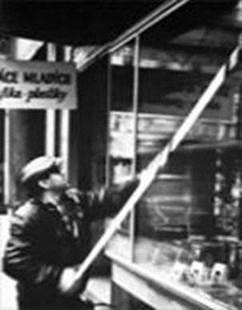
Apr 17, 2017 | Non categorizzato
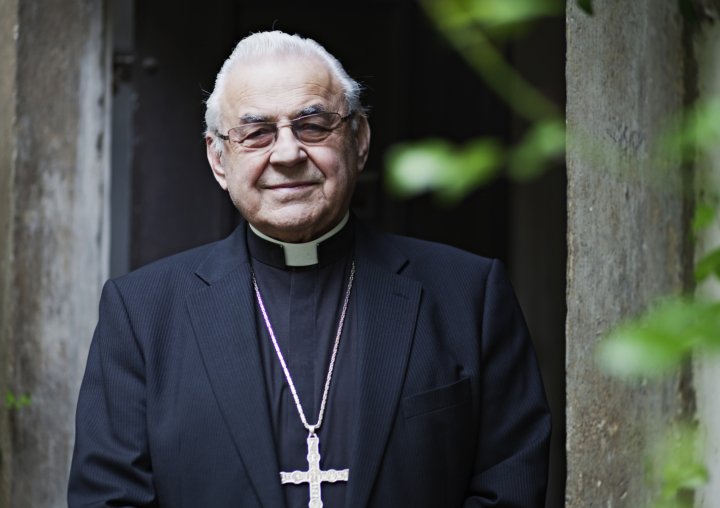 “Everything that has happened in my life has been a gift from God. My last name means ‘wolf’, and my personality is a bit like one. Yet when I started to live the Gospel in the light of the spirituality of unity, my wolf life finished, and my life as Miloslav, which means ‘gracious,’ began.” Thus began the then archbishop, who continued: “In 1964 I went to the DDR (East Germany) to thank a priest who regularly sent me theology books – there weren’t any where we were. He had learned of the spirituality of unity at Erfurt. He told me how the Focolare Movement began and spoke to me of Jesus Forsaken. To tell the truth, I didn’t understand much. I do remember that he gave me a text by Chiara Lubich.” He later met Natalia Dallapiccola, one of the first focolarine, who had also moved to the DDR. The cardinal was not yet even a seminarian, but would become one shortly. “I had many opportunities to to experience that this spirituality was real,” especially with other seminarians who were hard to deal with. It was with one of these that he actually began to share the ideal of unity. “After I was ordained in 1968, I was appointed secretary for the bishop of České Budějovice, a very deep person.” The bishop, however, found it difficult to accept the liturgical reform that had come with Vatican II. “I found myself judging him, but the focolarini explained to me that I had to love him instead of criticize him. At the time, I experienced that unity was the way to understand things, and to help others understand.” After 1968, communism came to power, and Miloslav, who quite influential with young people, was sent far away to a parish lost in the mountains. “There I started to understand what I had been told about Jesus Forsaken. I placed my situation in God’s hands, just as Jesus on the cross had entrusted himself to the Father. It was my first profound encounter with Jesus Forsaken.”
“Everything that has happened in my life has been a gift from God. My last name means ‘wolf’, and my personality is a bit like one. Yet when I started to live the Gospel in the light of the spirituality of unity, my wolf life finished, and my life as Miloslav, which means ‘gracious,’ began.” Thus began the then archbishop, who continued: “In 1964 I went to the DDR (East Germany) to thank a priest who regularly sent me theology books – there weren’t any where we were. He had learned of the spirituality of unity at Erfurt. He told me how the Focolare Movement began and spoke to me of Jesus Forsaken. To tell the truth, I didn’t understand much. I do remember that he gave me a text by Chiara Lubich.” He later met Natalia Dallapiccola, one of the first focolarine, who had also moved to the DDR. The cardinal was not yet even a seminarian, but would become one shortly. “I had many opportunities to to experience that this spirituality was real,” especially with other seminarians who were hard to deal with. It was with one of these that he actually began to share the ideal of unity. “After I was ordained in 1968, I was appointed secretary for the bishop of České Budějovice, a very deep person.” The bishop, however, found it difficult to accept the liturgical reform that had come with Vatican II. “I found myself judging him, but the focolarini explained to me that I had to love him instead of criticize him. At the time, I experienced that unity was the way to understand things, and to help others understand.” After 1968, communism came to power, and Miloslav, who quite influential with young people, was sent far away to a parish lost in the mountains. “There I started to understand what I had been told about Jesus Forsaken. I placed my situation in God’s hands, just as Jesus on the cross had entrusted himself to the Father. It was my first profound encounter with Jesus Forsaken.”

Vlk worked as a window cleaner
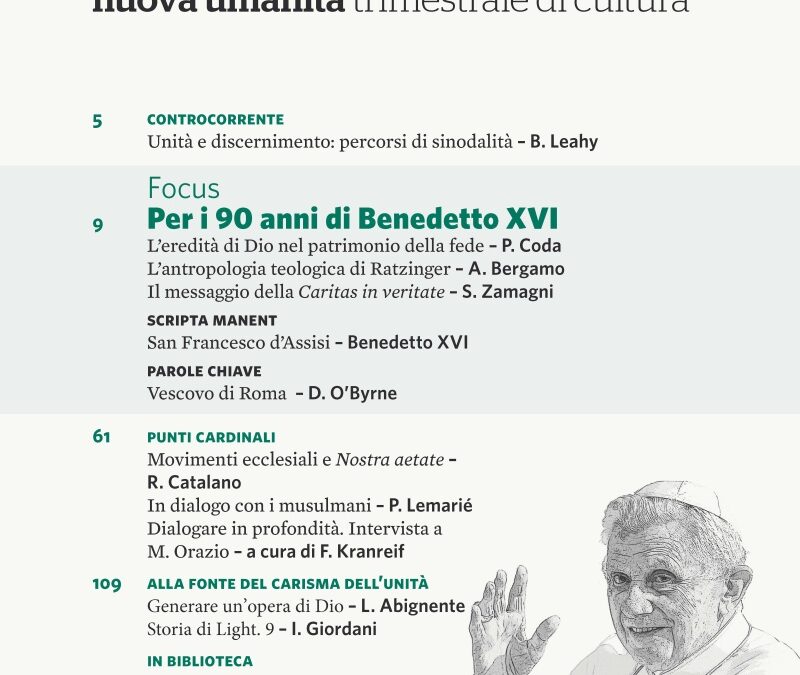
Apr 16, 2017 | Non categorizzato
 Joseph Ratzinger was born 90 years ago, on April 16, in Marktl am Inn, a country town of Bavaria. The 1927 calendar marks Holy Saturday as the day of his birth but, in 2017, his birthday is celebrate on Easter Sunday. The Focolare extends its best wishes to Benedict XVI for all that he has meant to it, to the Church and to humankind. As an expression of our affection and gratitude, the New Humanity Journal has already dedicated the Focus of its 25th edition to him. Compiled by Declan O’Byrne, the Focus section includes scholars such as Piero Coda, Stefano Zamagni and Antonio Bergamo who explore the theological, anthropological and social ethical dimensions of Benedict’s thinking. In a Church where often artificial conflicts arise between supporters of one or another ecclesial view, the New Humanity Journal dedicated to Benedict XVI presents a contribution by Brendan Leahy, Bishop of Limerick Ireland, on the need for a single synodal approach. The artuckes are in the process of being translated and will soon appear in other Focolare publications.
Joseph Ratzinger was born 90 years ago, on April 16, in Marktl am Inn, a country town of Bavaria. The 1927 calendar marks Holy Saturday as the day of his birth but, in 2017, his birthday is celebrate on Easter Sunday. The Focolare extends its best wishes to Benedict XVI for all that he has meant to it, to the Church and to humankind. As an expression of our affection and gratitude, the New Humanity Journal has already dedicated the Focus of its 25th edition to him. Compiled by Declan O’Byrne, the Focus section includes scholars such as Piero Coda, Stefano Zamagni and Antonio Bergamo who explore the theological, anthropological and social ethical dimensions of Benedict’s thinking. In a Church where often artificial conflicts arise between supporters of one or another ecclesial view, the New Humanity Journal dedicated to Benedict XVI presents a contribution by Brendan Leahy, Bishop of Limerick Ireland, on the need for a single synodal approach. The artuckes are in the process of being translated and will soon appear in other Focolare publications.
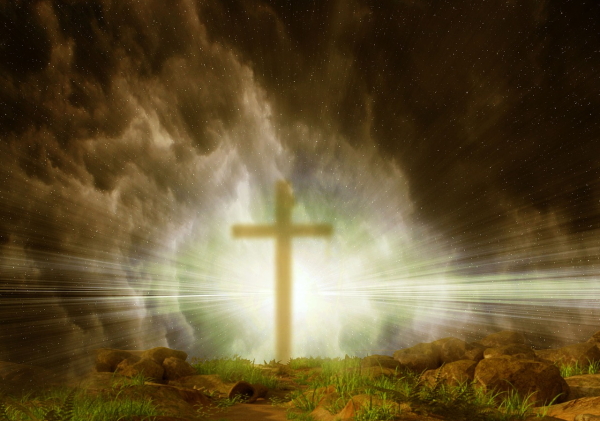
Apr 15, 2017 | Non categorizzato
 “Come, Lord Jesus”! Looking at you, our vocation to love will know no fear. Awaiting your coming, we will build this life well and, as soon as the next life opens up before us, we will plunge into the adventure that knows no end. You have conquered death and, in this our prayer, we feel you have conquered death in us too, in our hearts. “Come Lord Jesus!” always, in all of us. There will not be death, but you. There will be the Risen Lord; and this is already Easter. Best wishes to you all for a glorious, uninterrupted Easter, one that is fruitful, indeed very fruitful, for us, for the Church and for the world. “Come, Lord Jesus”! Looking at you, our vocation to love will know no fear. Awaiting your coming, we will build this life well and, as soon as the next life opens up before us, we will plunge into the adventure that knows no end. You have conquered death and, in this our prayer, we feel you have conquered death in us too, in our hearts. “Come Lord Jesus!” always, in all of us. There will not be death, but you. There will be the Risen Lord; and this is already Easter. Best wishes to you all for a glorious, uninterrupted Easter, one that is fruitful, indeed very fruitful, for us, for the Church and for the world.
Chiara Lubich
C.LUBICH, Cercando le cose di lassù, Rome 1992, p.136. |
|
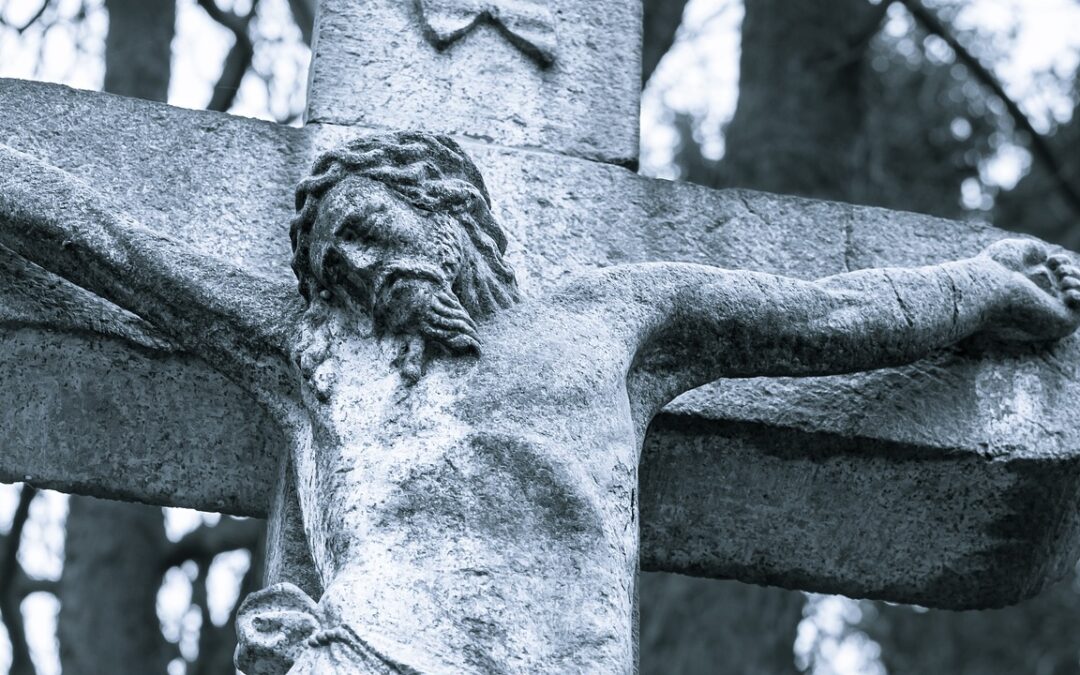
Apr 14, 2017 | Non categorizzato
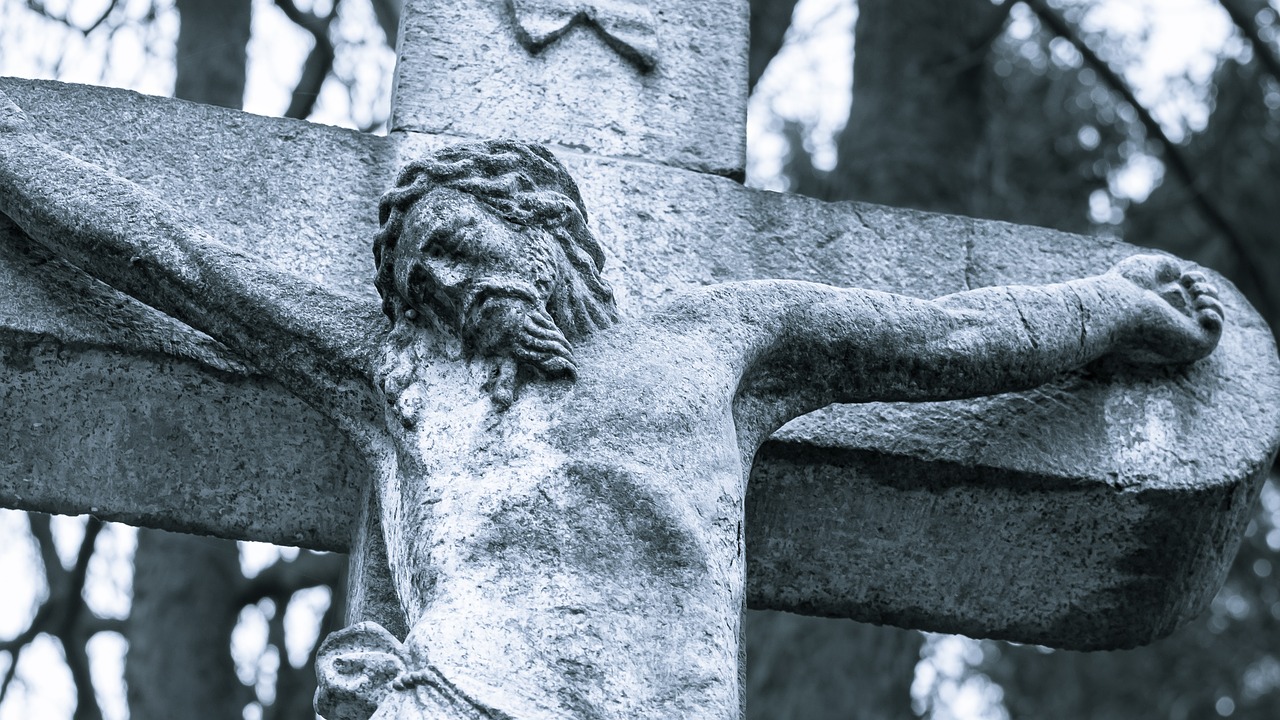 First step: prepare yourself In the morning, as I wake up, I prepare myself by saying: «Today I shall await Him.» I don’t know what the day will bring, but I know that in an unforeseen way, Jesus Forsaken will come to me: in the difficulties, disappointments, perhaps also in my shortcomings, and in bad and painful news. I declare that He will come, and that I am awaiting him. Second step: recognise him During the day, almost always in an unexpected manner, I meet the negativity around me or in me. At these moments it is important to recognize him immediately without hesitation. He, in his abandonment, is already present in every need or fault: in such a way that every pain is “his sacrament” and what matters, within the sign of this pain, is to recognise the countenance of the Crucified and Abandoned, loving and adoring him immediately. Third step: call him by his name Upon meeting him, I am not only aware, but observe and greet him. I call him by his name. Giving a name to every countenance of Jesus Forsaken is a precious exercise and much more than a superficial act. It is no longer “a thing” but a “You.” Precisely in this way, every action of mine becomes contemplation. Fourth step: welcome him warmly Prepare a feast for Jesus Forsaken. By this I mean welcoming him not only hesitatingly, as if it were an inevitable fact, or like welcoming someone who, despite being a friend, drops by at the wrong moment. Furthermore, I don’t want him to sit in the waiting room even for an instant, but will welcome him right away, in the heart of my love and joyful willingness. This is the transition of pain to love, passing through the abandonment in Easter. Only through one who loves in this way will the Forsaken give joy to the world. The feast we prepare for the Forsaken is that feast day which will not see the sunset, because Love never sets. Klaus Hemmerle Published in the Gen’s Magazine 36, Roma 2006, n. 1, p. 3.
First step: prepare yourself In the morning, as I wake up, I prepare myself by saying: «Today I shall await Him.» I don’t know what the day will bring, but I know that in an unforeseen way, Jesus Forsaken will come to me: in the difficulties, disappointments, perhaps also in my shortcomings, and in bad and painful news. I declare that He will come, and that I am awaiting him. Second step: recognise him During the day, almost always in an unexpected manner, I meet the negativity around me or in me. At these moments it is important to recognize him immediately without hesitation. He, in his abandonment, is already present in every need or fault: in such a way that every pain is “his sacrament” and what matters, within the sign of this pain, is to recognise the countenance of the Crucified and Abandoned, loving and adoring him immediately. Third step: call him by his name Upon meeting him, I am not only aware, but observe and greet him. I call him by his name. Giving a name to every countenance of Jesus Forsaken is a precious exercise and much more than a superficial act. It is no longer “a thing” but a “You.” Precisely in this way, every action of mine becomes contemplation. Fourth step: welcome him warmly Prepare a feast for Jesus Forsaken. By this I mean welcoming him not only hesitatingly, as if it were an inevitable fact, or like welcoming someone who, despite being a friend, drops by at the wrong moment. Furthermore, I don’t want him to sit in the waiting room even for an instant, but will welcome him right away, in the heart of my love and joyful willingness. This is the transition of pain to love, passing through the abandonment in Easter. Only through one who loves in this way will the Forsaken give joy to the world. The feast we prepare for the Forsaken is that feast day which will not see the sunset, because Love never sets. Klaus Hemmerle Published in the Gen’s Magazine 36, Roma 2006, n. 1, p. 3.
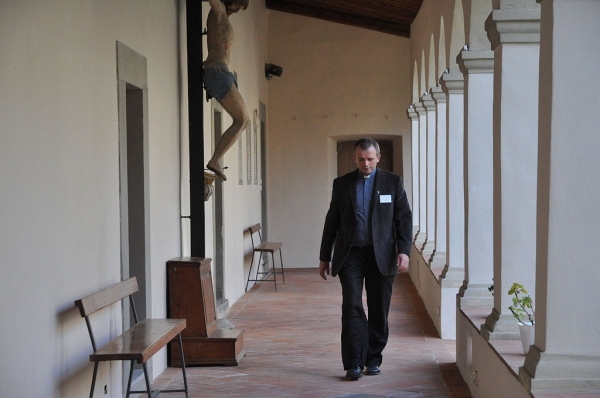
Apr 13, 2017 | Non categorizzato
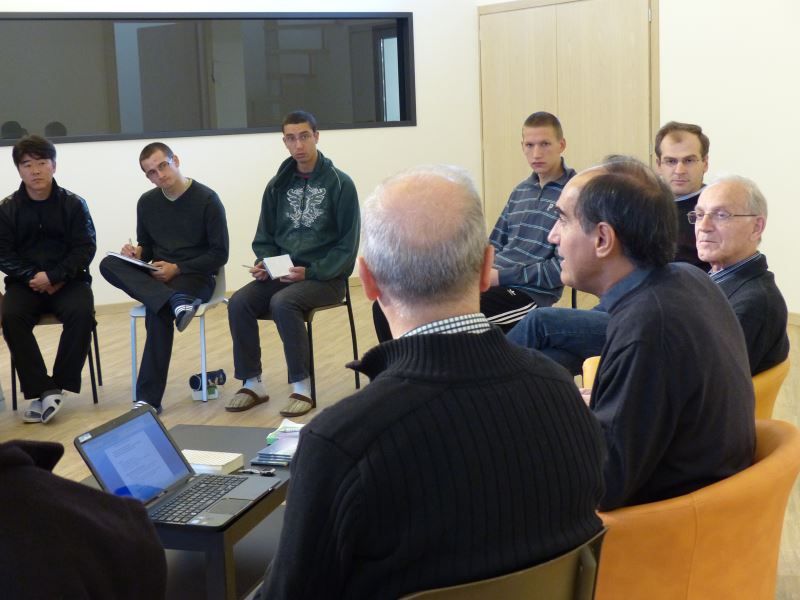 Who trains the trainers? Who, and especially how, accompanies seminarians and priests on their discreet mission and pastoral training? How can we support priests, deacons and seminarians to be, as Pope Francis said to Brazilian bishops in July 2013, “ministers capable of warming the hearts of the people, to walk with them in the night, to dialogue with their illusions and delusions, and to rebuild when things fall apart?” These are relevant questions for all the Christian community and were already being explored during the Second Vatican Council, which led to the creation and opening of schools to train priests in the spirituality of communion. Some history: in 1966 the Focolare Movement’s school for priests began at Grottaferrata, Rome. In 1974 it moved to Frascati, and then in 1984 to the international center at Loppiano, where today it is called the Vinea Mea (“my vineyard”) Spirituality Center. The idea is to offer training in unity for priests, deacons and seminarians who place living fraternity front and center. It is a school of life for men who are called from all over the world to announce the Gospel, to train in a life of communion with their bishops, fellow priests, laypeople in their parishes, and women and men of every creed and culture. This follows the words of Focolare founder Chiara Lubich, who in 1966 told participants at Grottaferrata: “Know how to set aside everything, and leave all pretenses of power behind, to ensure the presence of Jesus among you, living as children in the kingdom of God. This way a “new” pastoral way will be born, together with “new” priests – priests who are Christ for humanity, ready to give their lives for all.” This matches what Pope Francis has a number of times told today’s priests: to go out towards the “existential peripheries.” Since 1966 more than 4,000 priests and seminarians have been trained under the guiding hand of many priests, beginning with Fr. Silvano Cola. Their ages have ranged from 20 to 75, and they have come from close to 60 countries from around the globe. It is an experience that, through the commitment to put Gospel love into practice each day, aims to produce “priests of communion” who are the service of others.
Who trains the trainers? Who, and especially how, accompanies seminarians and priests on their discreet mission and pastoral training? How can we support priests, deacons and seminarians to be, as Pope Francis said to Brazilian bishops in July 2013, “ministers capable of warming the hearts of the people, to walk with them in the night, to dialogue with their illusions and delusions, and to rebuild when things fall apart?” These are relevant questions for all the Christian community and were already being explored during the Second Vatican Council, which led to the creation and opening of schools to train priests in the spirituality of communion. Some history: in 1966 the Focolare Movement’s school for priests began at Grottaferrata, Rome. In 1974 it moved to Frascati, and then in 1984 to the international center at Loppiano, where today it is called the Vinea Mea (“my vineyard”) Spirituality Center. The idea is to offer training in unity for priests, deacons and seminarians who place living fraternity front and center. It is a school of life for men who are called from all over the world to announce the Gospel, to train in a life of communion with their bishops, fellow priests, laypeople in their parishes, and women and men of every creed and culture. This follows the words of Focolare founder Chiara Lubich, who in 1966 told participants at Grottaferrata: “Know how to set aside everything, and leave all pretenses of power behind, to ensure the presence of Jesus among you, living as children in the kingdom of God. This way a “new” pastoral way will be born, together with “new” priests – priests who are Christ for humanity, ready to give their lives for all.” This matches what Pope Francis has a number of times told today’s priests: to go out towards the “existential peripheries.” Since 1966 more than 4,000 priests and seminarians have been trained under the guiding hand of many priests, beginning with Fr. Silvano Cola. Their ages have ranged from 20 to 75, and they have come from close to 60 countries from around the globe. It is an experience that, through the commitment to put Gospel love into practice each day, aims to produce “priests of communion” who are the service of others.  After close to two years of renovations, the spirituality center reopened in October 2013, having risen to the challenge of marrying the classic with modern. It brought together the Church’s centuries of tradition with the communitarian dynamic – both in the community’s training methods and in the architecture itself. “Vinea Mea,” explains Fr. Imre Kiss, who heads the center presently, “offers training in the light of the Focolare Movement’s spirituality of communion. Over the course of a year, the school offers courses on spirituality, theology, anthropology and ecclesiology, as well as seminars on current topics such as youth, family, communication, and dialogue between religions and cultures. “By sharing their lives in small communities, it responds to needs expressed by many priests: to tangibly experience a spirituality that is based on communion, in order then to transmit it to the women and men of our times.” The center works in tandem with similar setups in the movement’s other little cities – in Poland, Germany, Kenya, Brazil, Argentina and the Philippines. It also often promotes annual courses and workshops for seminary educators in order to sustain and spread a priestly lifestyle that is based on communion. In November 2016 Vinea Mea inaugurated the Evangelii Gaudium Center, in collaboration with the Sophia University Institute. This emerged in response to the pope’s invitation to give a new push to the renewal work necessary for a new phase of evangelization in the Church: the call to go out towards the existential edges of our time. One of the center’s first initiatives, organized by Vinea Mea, has been a course that goes into depth into the apostolic exhortation Evangelii Gaudium. From Loppiano online
After close to two years of renovations, the spirituality center reopened in October 2013, having risen to the challenge of marrying the classic with modern. It brought together the Church’s centuries of tradition with the communitarian dynamic – both in the community’s training methods and in the architecture itself. “Vinea Mea,” explains Fr. Imre Kiss, who heads the center presently, “offers training in the light of the Focolare Movement’s spirituality of communion. Over the course of a year, the school offers courses on spirituality, theology, anthropology and ecclesiology, as well as seminars on current topics such as youth, family, communication, and dialogue between religions and cultures. “By sharing their lives in small communities, it responds to needs expressed by many priests: to tangibly experience a spirituality that is based on communion, in order then to transmit it to the women and men of our times.” The center works in tandem with similar setups in the movement’s other little cities – in Poland, Germany, Kenya, Brazil, Argentina and the Philippines. It also often promotes annual courses and workshops for seminary educators in order to sustain and spread a priestly lifestyle that is based on communion. In November 2016 Vinea Mea inaugurated the Evangelii Gaudium Center, in collaboration with the Sophia University Institute. This emerged in response to the pope’s invitation to give a new push to the renewal work necessary for a new phase of evangelization in the Church: the call to go out towards the existential edges of our time. One of the center’s first initiatives, organized by Vinea Mea, has been a course that goes into depth into the apostolic exhortation Evangelii Gaudium. From Loppiano online
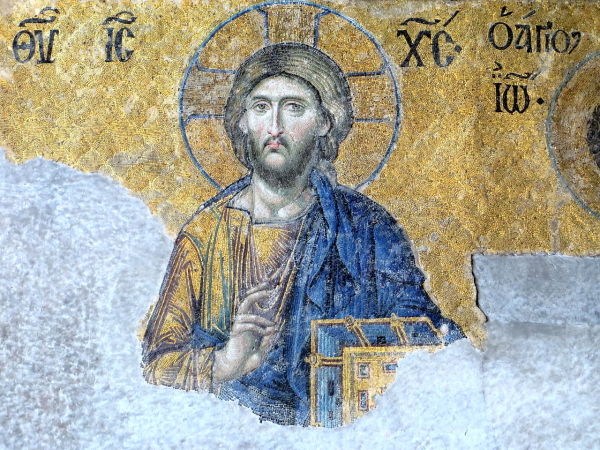
Apr 12, 2017 | Non categorizzato
 |
| Christ is Risen! Every suffering, separation, division, failure, and even death itself can become for us, because of Him, a source of light and peace. Called to give witness to the great message of the Resurrection, let us renew our common commitment to give hope and joy to humanity in this time of momentous change. With best wishes for a Happy Easter!
Maria Voce
|
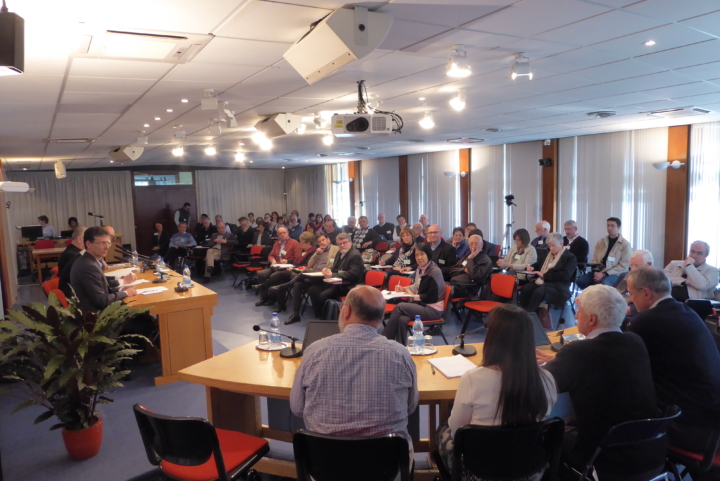
Apr 11, 2017 | Non categorizzato
 The Gospel and Culture is a delicate topic. It has been widely discussed for centuries in theological, sociological, pastoral, political and educational environments. There are Church documents, such as Evangelization in the Modern World and the Gospel of Joy that are indispensable references. If you add the word “charism” to the mix – which nowadays is being attributed to non-ecclesial figures and realities as well – then the search for agreement becomes challenging, especially when you put together experts from different cultures. Yet, this was the striking feature of the “Gospel – Charism – Culture” conference held on April 6-7 at the Focolare International Centre in Rocca di Papa, Italy. In her welcome address, Maria Voce pointed out the deep goal of the gathering: to promote “a culture of peace, a culture of resurrection” that will have a growing impact.” Experts from Asia, Africa, the Americas and Europe compared notes during three thematic sessions. Charisms and the evangelization of the culture. The first session dealt with two questions: “How to respond to the urgency of the Gospel becoming culture” by Archbishop Zani; “How to accelerate the communion among charisms in the face of present challenges?” by Sister Motta; and how “nowadays, many “charisms” are born in non-religious environments, while there is not enough prophecy in the Church itself,” by Luigino Bruni. During successive discussions the experts underlined how “every confrontation with the other is an encounter with a social family’s history and culture” (Guadiano); that “the media have their own charism for a united world, if they maintain their autonomy” (Zanzucchi); that “the evangelization of the culture does not pass through the authority, but through the witness” (Archbishop Zani). Finally, there was the appeal made by Bruni: “We need a new narrative; the young people of today do not understand a language from the 1900s.” From inculturation to interculturality. The second session was opened by Jesús Morán: “European elaborations on culture are far from all there is to say about Christ. In the encounter with other cultures something is expressed that has not yet been expressed.” The goal, as Philippine Andrew Recepcion recalled, “is not a non-Western Christianity, but a beyond-Western [Christianity].” Soni Vargas from Bolivia showed some passion when asking that we move on from the paradigm of inculturation, which does not express the active reciprocity required by Chiara Lubich, to a paradigm of interculturality: “No longer “mission”, but “inter-gift” within a Trinitarian dynamic in which a superiority of one culture over another doesn’t even exist.” During the debate, Chinese Vania Cheng, remarked: “Asia is asking for listening, respect and silence because the inner being reveals more than the word.” Cameroonian, Raphael Takougang, remembered that “in interculturation,the knowledge isn’t communicated, it’s passed on by having an experience together.” Roberto Catalano underscored what Chiara had seen long ago when she invited everyone to “make Christ to be born in the heart of the cultures.” Lucas Cerviño, who was on a link-up from Mexico: “I need to create the conditions so that the seed of God that is already inside a culture can flower . . . but never imposing the way.” Morán concluded: “It’s true that there must not be control or superiority of a culture over another, but this doesn’t mean that there isn’t a central point: Christ is the heart of the world.” Youth – faith – vocational discernment. The third session focused on the upcoming Synod of Bishops and was opened by Italo Fiorin: “Educating means helping an other to find the meaning of his or her own existence. Educating is the art of accompanying.” Sister Jenny Favarian testified to how: “the discovery of the vocation to love makes totally beautiful flowers to blossom.” Maria Rosa Logozzo told about the contact of a group of young people from different cultures – both believers and non-believers – with the focolare in Dublin, Ireland: “The possibility of having an experience of God in a community draws them.” After a rich debate, Fiorin concluded by underscoring the importance of the “pedagogy of reality” and especially of service learning: “learning to serve; serving to learn.” On the final afternoon, theologian Piero Coda gave a presentation on the question: What does it mean when we say that the Church is born from the abandonment of Jesus on the cross? “A life in exile: the capacity to detach from one’s own roots in order to live the other . . . testifying to the folly of God’s love. . .” The discussions from these two days, Francisco Canzani recalled, will be transformed into articles for the Gen magazines, Unità e Carismi, Nuova Umanità, Città Nuova that will help to reflect on current ecclesial and cultural times.
The Gospel and Culture is a delicate topic. It has been widely discussed for centuries in theological, sociological, pastoral, political and educational environments. There are Church documents, such as Evangelization in the Modern World and the Gospel of Joy that are indispensable references. If you add the word “charism” to the mix – which nowadays is being attributed to non-ecclesial figures and realities as well – then the search for agreement becomes challenging, especially when you put together experts from different cultures. Yet, this was the striking feature of the “Gospel – Charism – Culture” conference held on April 6-7 at the Focolare International Centre in Rocca di Papa, Italy. In her welcome address, Maria Voce pointed out the deep goal of the gathering: to promote “a culture of peace, a culture of resurrection” that will have a growing impact.” Experts from Asia, Africa, the Americas and Europe compared notes during three thematic sessions. Charisms and the evangelization of the culture. The first session dealt with two questions: “How to respond to the urgency of the Gospel becoming culture” by Archbishop Zani; “How to accelerate the communion among charisms in the face of present challenges?” by Sister Motta; and how “nowadays, many “charisms” are born in non-religious environments, while there is not enough prophecy in the Church itself,” by Luigino Bruni. During successive discussions the experts underlined how “every confrontation with the other is an encounter with a social family’s history and culture” (Guadiano); that “the media have their own charism for a united world, if they maintain their autonomy” (Zanzucchi); that “the evangelization of the culture does not pass through the authority, but through the witness” (Archbishop Zani). Finally, there was the appeal made by Bruni: “We need a new narrative; the young people of today do not understand a language from the 1900s.” From inculturation to interculturality. The second session was opened by Jesús Morán: “European elaborations on culture are far from all there is to say about Christ. In the encounter with other cultures something is expressed that has not yet been expressed.” The goal, as Philippine Andrew Recepcion recalled, “is not a non-Western Christianity, but a beyond-Western [Christianity].” Soni Vargas from Bolivia showed some passion when asking that we move on from the paradigm of inculturation, which does not express the active reciprocity required by Chiara Lubich, to a paradigm of interculturality: “No longer “mission”, but “inter-gift” within a Trinitarian dynamic in which a superiority of one culture over another doesn’t even exist.” During the debate, Chinese Vania Cheng, remarked: “Asia is asking for listening, respect and silence because the inner being reveals more than the word.” Cameroonian, Raphael Takougang, remembered that “in interculturation,the knowledge isn’t communicated, it’s passed on by having an experience together.” Roberto Catalano underscored what Chiara had seen long ago when she invited everyone to “make Christ to be born in the heart of the cultures.” Lucas Cerviño, who was on a link-up from Mexico: “I need to create the conditions so that the seed of God that is already inside a culture can flower . . . but never imposing the way.” Morán concluded: “It’s true that there must not be control or superiority of a culture over another, but this doesn’t mean that there isn’t a central point: Christ is the heart of the world.” Youth – faith – vocational discernment. The third session focused on the upcoming Synod of Bishops and was opened by Italo Fiorin: “Educating means helping an other to find the meaning of his or her own existence. Educating is the art of accompanying.” Sister Jenny Favarian testified to how: “the discovery of the vocation to love makes totally beautiful flowers to blossom.” Maria Rosa Logozzo told about the contact of a group of young people from different cultures – both believers and non-believers – with the focolare in Dublin, Ireland: “The possibility of having an experience of God in a community draws them.” After a rich debate, Fiorin concluded by underscoring the importance of the “pedagogy of reality” and especially of service learning: “learning to serve; serving to learn.” On the final afternoon, theologian Piero Coda gave a presentation on the question: What does it mean when we say that the Church is born from the abandonment of Jesus on the cross? “A life in exile: the capacity to detach from one’s own roots in order to live the other . . . testifying to the folly of God’s love. . .” The discussions from these two days, Francisco Canzani recalled, will be transformed into articles for the Gen magazines, Unità e Carismi, Nuova Umanità, Città Nuova that will help to reflect on current ecclesial and cultural times.
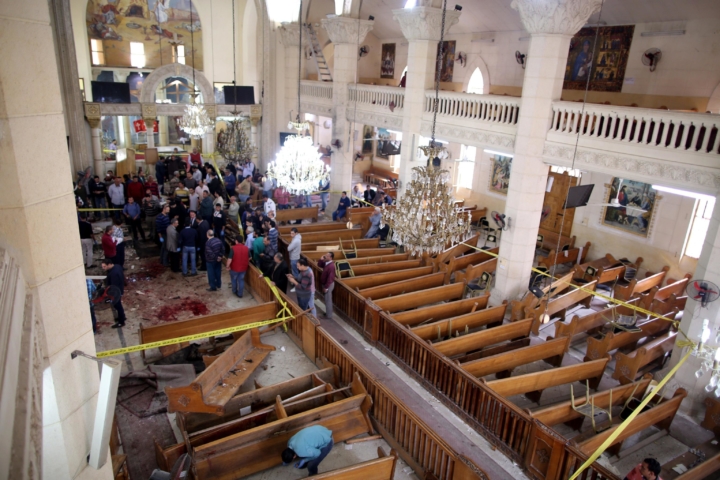
Apr 10, 2017 | Focolare Worldwide
 “It’s an attack not just on Christians but on religion as well,” commented the members of the local Focolare community in Egypt, with reference to the bombings on Palm Sunday. This sentiment was confirmed through the immediate solidarity shown by the Muslim community, many of whom offered to donate blood at the hospitals. “Being deeply religious people, Muslims and Christians in Egypt felt called upon to strengthen their faith after the attacks,” a member of the Movement said. Two Coptic Christian churches were targetted by terrorists in the city of Tanta in the Nile Delta, and in Alexandria, the second largest city of the North African country. In Tanta the Church of St George was hit causing 27 casualties. In Alexandria, Church of St Mark was bombed killing 18 people. The President of Egypt, Abdel Fattah al-Sisi has declared a three-month state of emergency, during which all public manifestations and events will be suspended, among other restrictions. The attacks coincided with the celebration of Palm Sunday, which marks the start of the most important liturgical week for Christians. It was a sombre beginning to Holy Week. The passage of Revelation came to mind which describes a “great multitude (…) from every nation (…) holding palm branches in their hands” who had “washed their robes in the blood of the Lamb (…)”. (Revelation 7:9-14). On Sunday morning, at St Peter’s Square, the Holy Father prayed “for the victims”, expressing his condolences “to my dear brother, Pope Tawadros II, the Coptic Church and the entire Egyptian nation.” And he concluded: “May the Lord convert the hearts of those who sow terror, violence and death.”
“It’s an attack not just on Christians but on religion as well,” commented the members of the local Focolare community in Egypt, with reference to the bombings on Palm Sunday. This sentiment was confirmed through the immediate solidarity shown by the Muslim community, many of whom offered to donate blood at the hospitals. “Being deeply religious people, Muslims and Christians in Egypt felt called upon to strengthen their faith after the attacks,” a member of the Movement said. Two Coptic Christian churches were targetted by terrorists in the city of Tanta in the Nile Delta, and in Alexandria, the second largest city of the North African country. In Tanta the Church of St George was hit causing 27 casualties. In Alexandria, Church of St Mark was bombed killing 18 people. The President of Egypt, Abdel Fattah al-Sisi has declared a three-month state of emergency, during which all public manifestations and events will be suspended, among other restrictions. The attacks coincided with the celebration of Palm Sunday, which marks the start of the most important liturgical week for Christians. It was a sombre beginning to Holy Week. The passage of Revelation came to mind which describes a “great multitude (…) from every nation (…) holding palm branches in their hands” who had “washed their robes in the blood of the Lamb (…)”. (Revelation 7:9-14). On Sunday morning, at St Peter’s Square, the Holy Father prayed “for the victims”, expressing his condolences “to my dear brother, Pope Tawadros II, the Coptic Church and the entire Egyptian nation.” And he concluded: “May the Lord convert the hearts of those who sow terror, violence and death.”
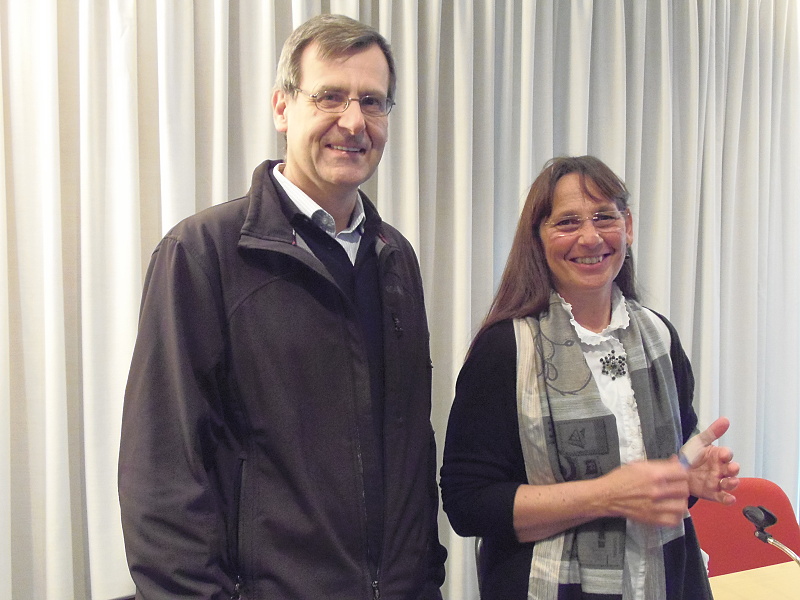
Apr 10, 2017 | Non categorizzato
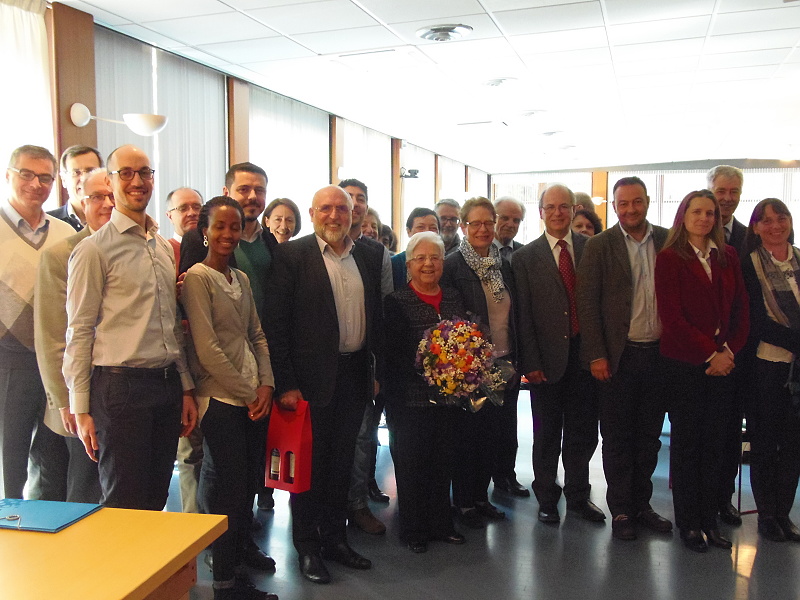
With Maria Voce and Jesús Morán
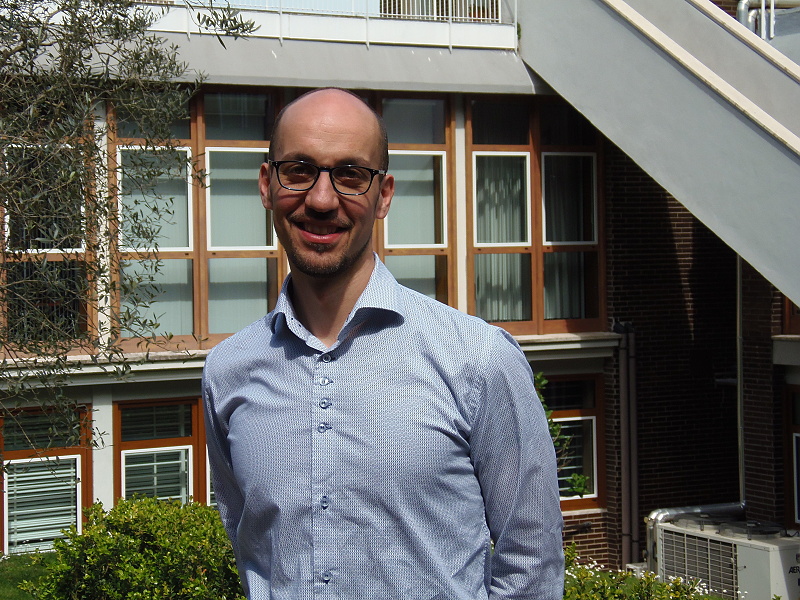
avide Bilardi, adjunct representative at the centre in Geneva, has been working in New Humanity for seven years: Davide Bilardi

Marco Desalvo, President and Cecilia Landucci, Vice president
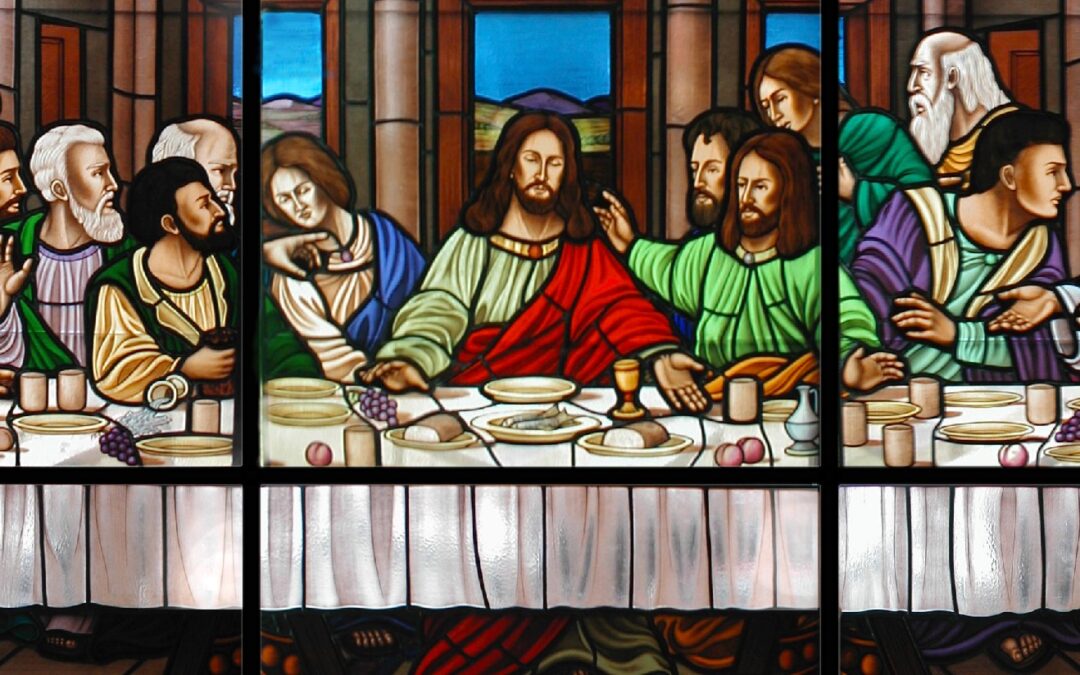
Apr 9, 2017 | Non categorizzato
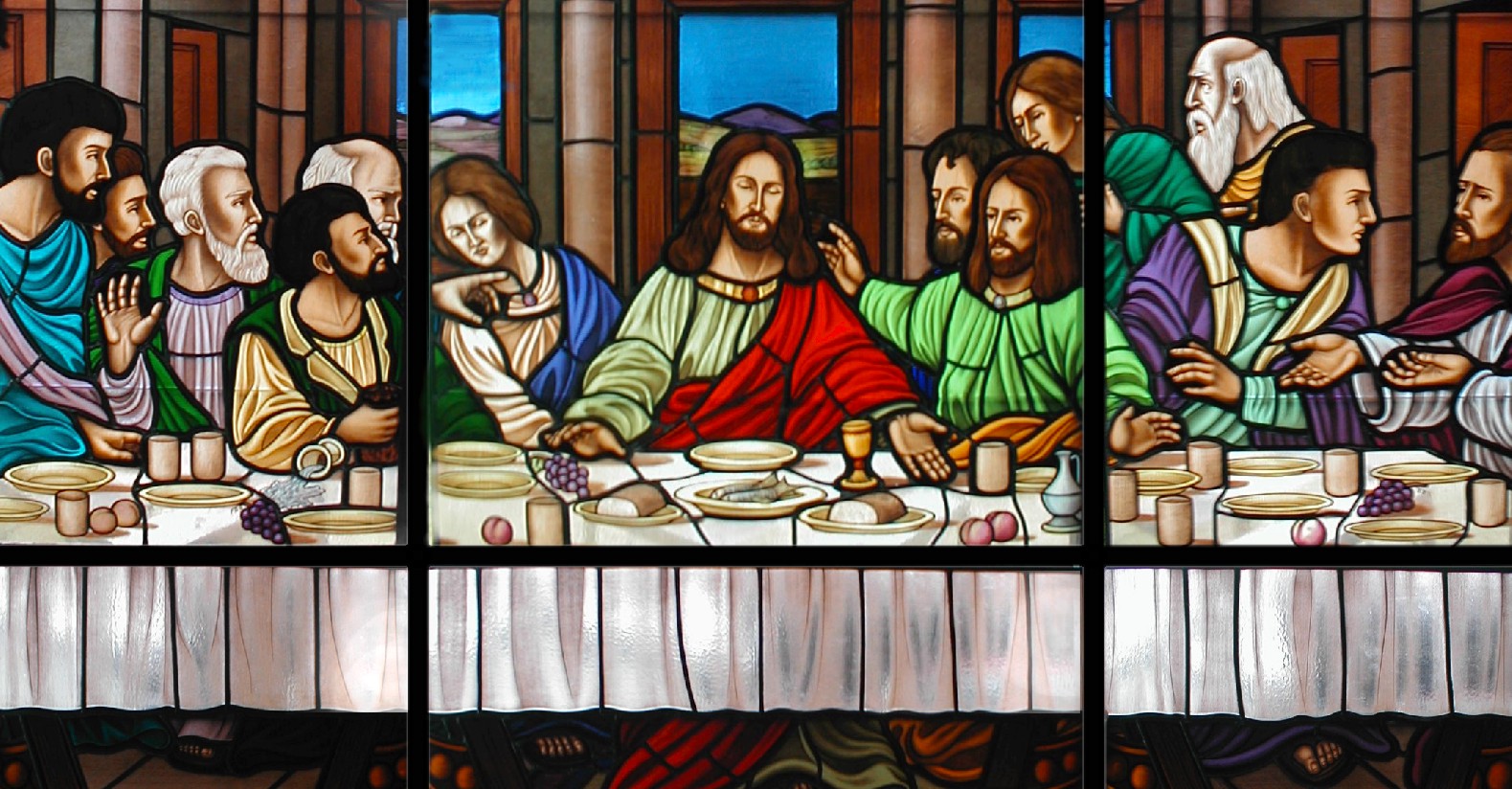 In the man Jesus there is participation in the very life of the Trinity, in the social life of God. This supernatural social life, which the life of grace brings to man, never destroys his natural life. There is instead a marvelous interweaving of the two. The supernatural social life, which is grace, will give origin to and allow for a social life that is naturally perfect, sincne Chrtist will found a visible Church. […] But what is the crossing point between Christ and the Church? How do move from the spiritual presence of the humanity of Christ to the presence of Christ in humanity? In order to understand it we must contemplate the human nature of Jesus before his death and after his Resurrection. We must meditate on his own flesh and blood which, after his exaltation, becomes life-giving. […] Before the crucifixion, the range of action of Christ’s humanity is circumscribed by the limits of his mortal body that is liable to death; with his death and Resurrection, it becomes life-giving spirit. […] Therefore, on the glorious Easter Sunday, when the Spirit penetrates and illumines every part of Jesus’s body, the Church also receives the Holy Spirit: it becomes the Body of Christ. You could say that Christ planted a particular body and raised up [a] Mystical Body, the Church. And so the mystery of human social life re-flowers also in these marvelous events. Since Christ wished to become a member of the human community, he became its Head. To this end, by suffering on the cross, he redeems the human race, since it it spiritually enclosed in him, and also his own flesh through which he wished to work the redemption; and so it acquires certain infinite dimensions. It is spiritualized and becomes the very image of the new humanity. That body which for the man a limiting principle, for Jesus after his Resurrection, is a universalizing principle of life. […] The term “Mystical Body of Christ” and its more precise and determining meaning, refers to the Church that continues the very work of Jesus here on earth. […] Christ, the Son of God, was a true man, he was perfect man; likewise, the Mystical Body is fully human, perfectly human, besides divine. The Incarnation is daily continuing its work, until the end of the ages, in the visible Church. Pasquale Foresi From: Pasquale Foresi, Teologia della Socialità, (Rome: Città Nuova, 1963), 85.
In the man Jesus there is participation in the very life of the Trinity, in the social life of God. This supernatural social life, which the life of grace brings to man, never destroys his natural life. There is instead a marvelous interweaving of the two. The supernatural social life, which is grace, will give origin to and allow for a social life that is naturally perfect, sincne Chrtist will found a visible Church. […] But what is the crossing point between Christ and the Church? How do move from the spiritual presence of the humanity of Christ to the presence of Christ in humanity? In order to understand it we must contemplate the human nature of Jesus before his death and after his Resurrection. We must meditate on his own flesh and blood which, after his exaltation, becomes life-giving. […] Before the crucifixion, the range of action of Christ’s humanity is circumscribed by the limits of his mortal body that is liable to death; with his death and Resurrection, it becomes life-giving spirit. […] Therefore, on the glorious Easter Sunday, when the Spirit penetrates and illumines every part of Jesus’s body, the Church also receives the Holy Spirit: it becomes the Body of Christ. You could say that Christ planted a particular body and raised up [a] Mystical Body, the Church. And so the mystery of human social life re-flowers also in these marvelous events. Since Christ wished to become a member of the human community, he became its Head. To this end, by suffering on the cross, he redeems the human race, since it it spiritually enclosed in him, and also his own flesh through which he wished to work the redemption; and so it acquires certain infinite dimensions. It is spiritualized and becomes the very image of the new humanity. That body which for the man a limiting principle, for Jesus after his Resurrection, is a universalizing principle of life. […] The term “Mystical Body of Christ” and its more precise and determining meaning, refers to the Church that continues the very work of Jesus here on earth. […] Christ, the Son of God, was a true man, he was perfect man; likewise, the Mystical Body is fully human, perfectly human, besides divine. The Incarnation is daily continuing its work, until the end of the ages, in the visible Church. Pasquale Foresi From: Pasquale Foresi, Teologia della Socialità, (Rome: Città Nuova, 1963), 85.
Apr 6, 2017 | Non categorizzato
The countdown for the 21st United World Week started. “We would like to generate a tam tam that, starting slowly, will rise up to generate much noise in the world!”, wrote us Youth for a United World. “Let us show the world all the concrete actions that, day after day, build bridges of brotherhood with #fraternitychallenge.On your Facebook wall, write something positive and invite two friends who will do the same for another 5 days … and so on, up to the United World Week! Use all the hashtags: #UnitedWorldProject, #FraternityChallenge, #Pulse, and #4Peace.
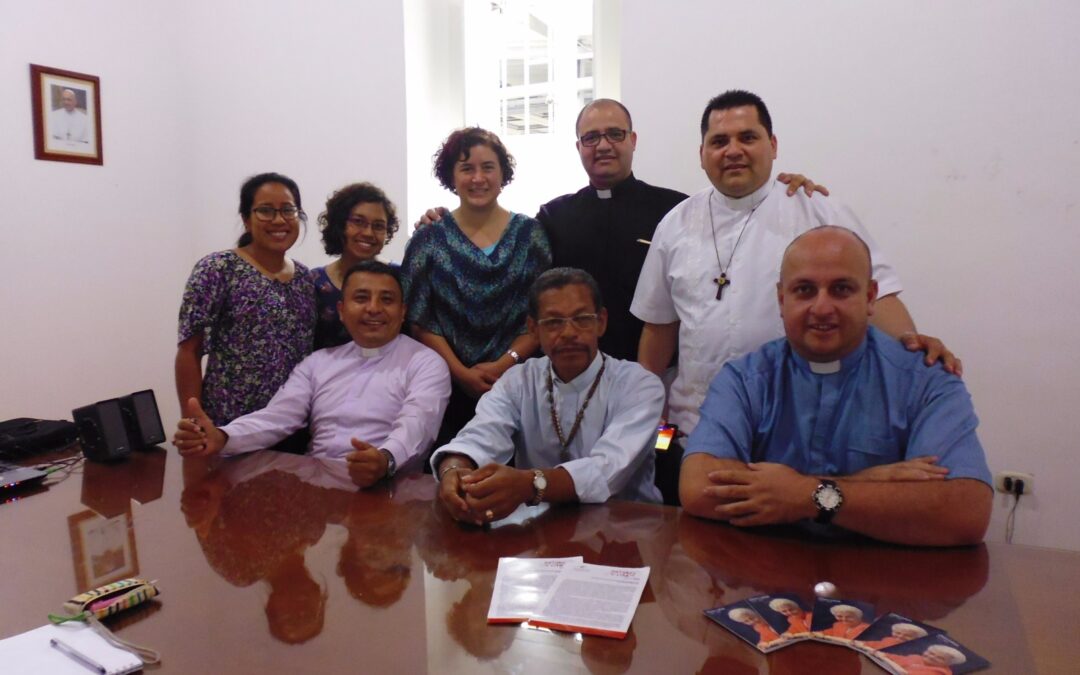
Apr 6, 2017 | Non categorizzato
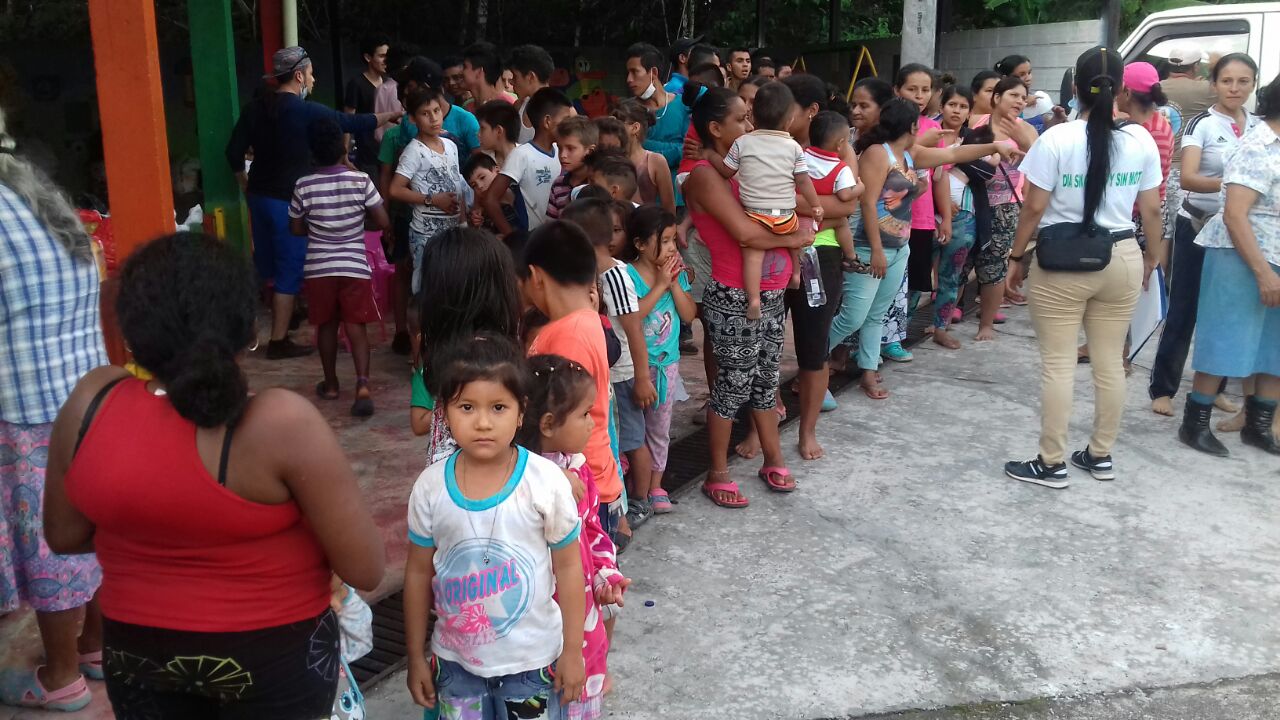 254 dead, including 62 minors, more than 400 wounded and just as many lost. These are the dramatic numbers from the strong floods that have caused a veritable catastrophe in the city of Mocoa, 500 kilometres south of Bogotà in south Colombia. The president of Colombia, Juan Manuel Santos, visited the site of the disaster, which was reduced to a mud heap, and said that the number of the missing is not yet known. The army is working around the clock searching for survivors and delivering humanitarian aid. A state of emergency has been declared in the entire region of the disaster, in order to hasten the recovery of victims. “It is difficult to describe not only the gravity of what took place, but also what the people are going through, including those of our own community in that region,” writes Alejandra from the focolare in Bogotà. “Seventeen quarters have been destroyed in the city of Mocoa with its 36,000 inhabitants. The train station has been fenced off.
254 dead, including 62 minors, more than 400 wounded and just as many lost. These are the dramatic numbers from the strong floods that have caused a veritable catastrophe in the city of Mocoa, 500 kilometres south of Bogotà in south Colombia. The president of Colombia, Juan Manuel Santos, visited the site of the disaster, which was reduced to a mud heap, and said that the number of the missing is not yet known. The army is working around the clock searching for survivors and delivering humanitarian aid. A state of emergency has been declared in the entire region of the disaster, in order to hasten the recovery of victims. “It is difficult to describe not only the gravity of what took place, but also what the people are going through, including those of our own community in that region,” writes Alejandra from the focolare in Bogotà. “Seventeen quarters have been destroyed in the city of Mocoa with its 36,000 inhabitants. The train station has been fenced off. 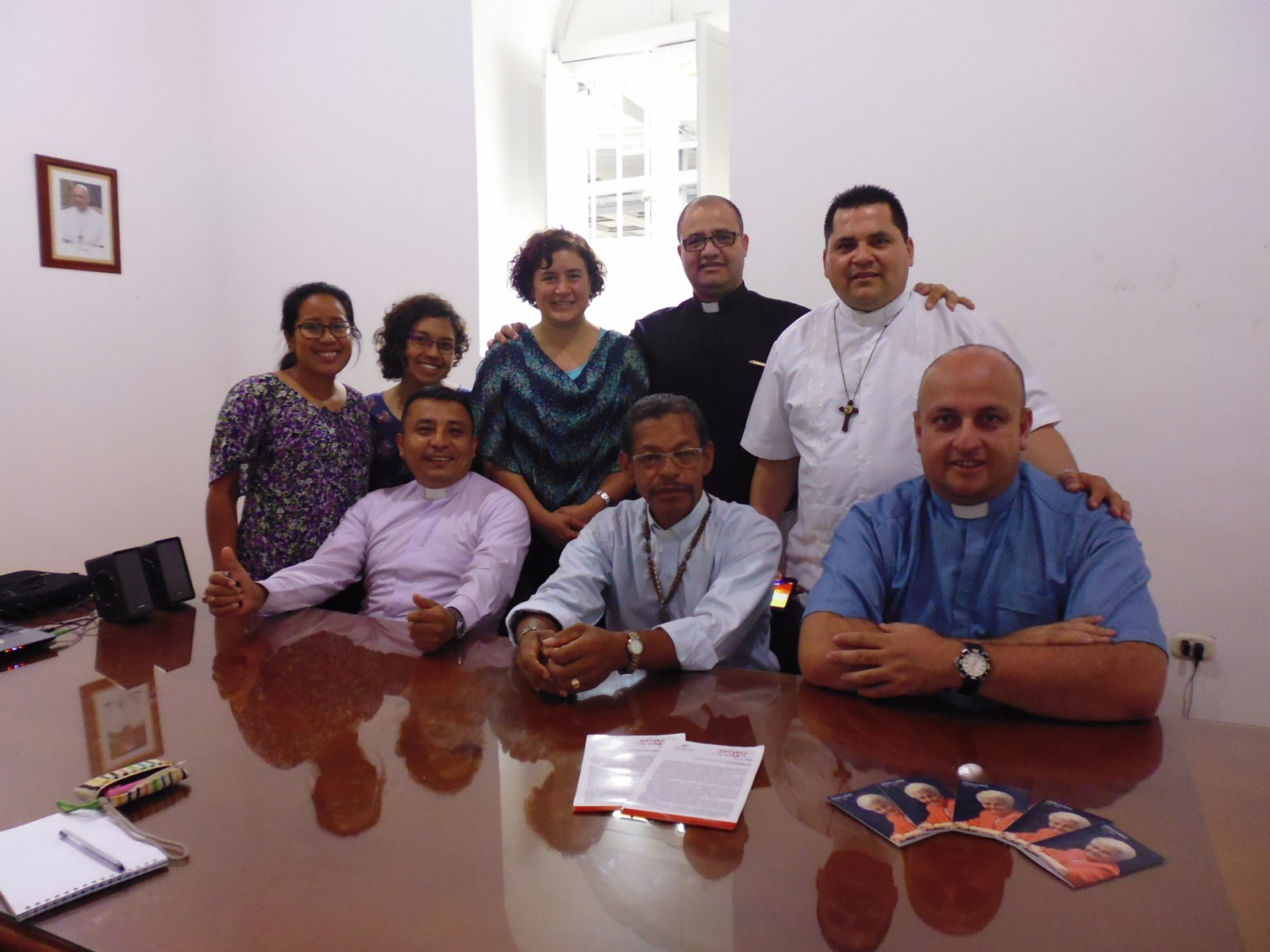 We tried to regain contact with each person, but the situation is bad for everyone. In the zone that is already burdened by poverty and the guerilla, there are many priests from the Movement. Don Luis Fernando presided at a collective funeral, and Father Oscar Geovanny is still searching for his family members. Father Jorge has sent us some photos of his parishioners as they help and support people who have lost everything. Father Oscar Claros reports that of the 17 quarters that were complete wiped away, 5 of them were in his parish: entire families who lived the Word of Life have disappeared. He is personally involved in the work of distributing aid and supporting his parishioners.” “The Focolare community throughout the country is stepping up, gathering funds that can be sent to the site of the disaster, through priests of the Movement. The focolarini in Bogotà have activated a speedy channel of communication with people from the area, and are trying to support them and give them hope in these difficult moments. This morning we talked with Father Oscar Claros: “The situation is still chaotic, the zone without water and electricity, with the real threat of an epidemic.”
We tried to regain contact with each person, but the situation is bad for everyone. In the zone that is already burdened by poverty and the guerilla, there are many priests from the Movement. Don Luis Fernando presided at a collective funeral, and Father Oscar Geovanny is still searching for his family members. Father Jorge has sent us some photos of his parishioners as they help and support people who have lost everything. Father Oscar Claros reports that of the 17 quarters that were complete wiped away, 5 of them were in his parish: entire families who lived the Word of Life have disappeared. He is personally involved in the work of distributing aid and supporting his parishioners.” “The Focolare community throughout the country is stepping up, gathering funds that can be sent to the site of the disaster, through priests of the Movement. The focolarini in Bogotà have activated a speedy channel of communication with people from the area, and are trying to support them and give them hope in these difficult moments. This morning we talked with Father Oscar Claros: “The situation is still chaotic, the zone without water and electricity, with the real threat of an epidemic.”
Apr 5, 2017 | Non categorizzato
“Our world is torn by blind violence, a violence that has also struck the heart of your beloved land. Our world needs peace, love and mercy.” See VIDEO MESSAGE
Apr 5, 2017 | Non categorizzato
For about a year the Focolare communities around Rome, together with other associations, have organized various fundraising initiatives to support the “Chance for Tomorrow” project in Egypt which is aimed at helping children and women at risk in one of the poorest districts of Cairo. In order to express the closeness to this people recently hit by severe attacks, an information evening will be held in Grottaferrata on 22 April, where the project will be presented through life experiences and an immersion into the Egyptian culture; an account of what has been achieved so far, along with future prospects will also be presented.
Apr 5, 2017 | Non categorizzato
A journey in the name of peace. That is how the Pope’s visit to Egypt is being described. The two-day visit will take place on April 28th and 29th. Patriarch Bartholemew has also accepted the invitation of the Grand Imam of Al-Azhar, Ahmad al-Tayyib. The schedule includes a courtesy visit to President of the Republic Abd al-Fattah al-Sisi, to the Grand Imam of Al Azhar, and to the Coptic Pope Tawadros II. This will be followed by an address to the International Conference on Peace. On Saturday, April 29th, he will have lunch with Egyptian Catholic bishops, followed by a prayer service with clergy, religious and seminarians, and a farewell ceremony.
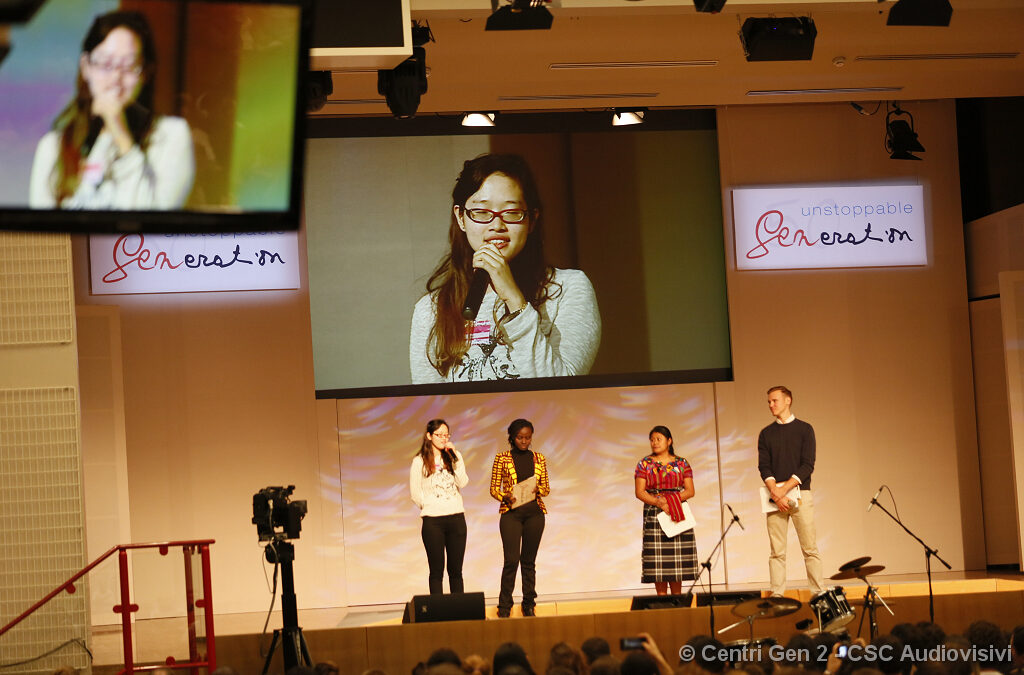
Apr 5, 2017 | Non categorizzato
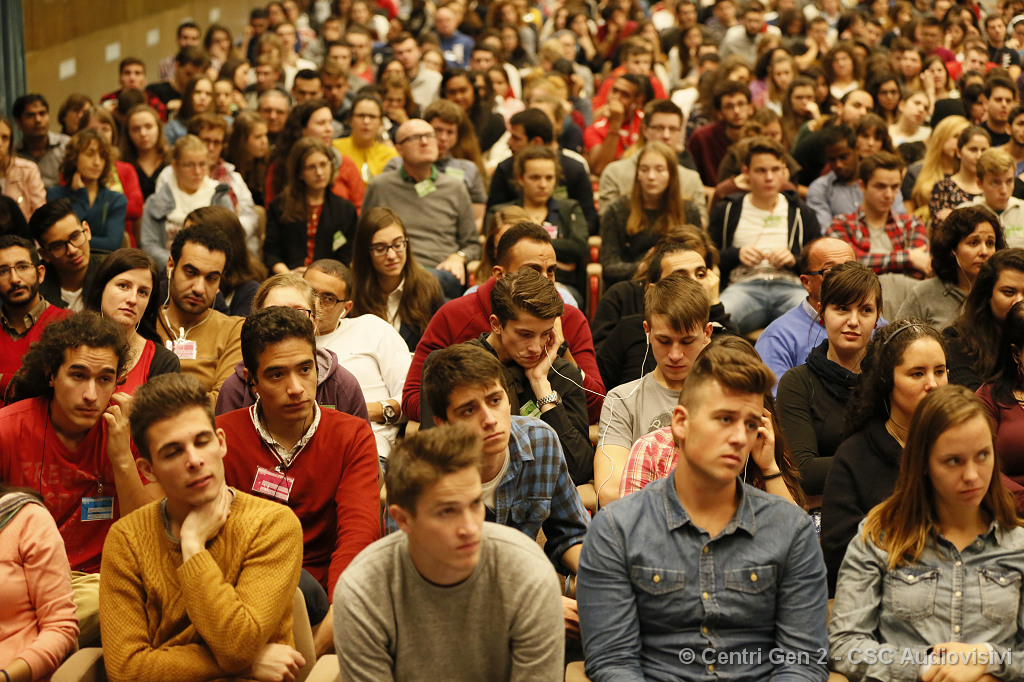 Jaime recounts: “Last year, I was given the opportunity to live for a whole year in one of the Focolare’s little towns, Mariapolis Lia, near Buenos Aires in Argentina. It was a very powerful and immersive experience, precisely because the law of that town is the Gospel, beginning with Jesus’s new commandment: ‘Love one another as I have loved you.’” Upon his return to El Salvador, however, Jaime found himself catapulted into a climate of danger and violence: even in broad daylight, the roads are never safe. It’s even dangerous to take the bus or play football at the city park. “The situation had become so risky and dangerous,” Jaime continues, that I thought of leaving the country and moving abroad. At first, everybody at home agreed, but when I thought about it some more, I sensed that God asked me to stay and be bring a little light into the environment I lived in, near to my Gen friends who would have been alone in that situation if I left. What finally convinced me was some news about the young people from the Focolare in the Middle East, many of whom stayed in their country in situations that were certainly far worse than mine. We talked about it at home and all decided to stay in El Salvador and carry on entrusting ourselves to God. When I told the Gen that I was staying, we got the idea of launching a campaign called: “Change your own m2 (square metre)” with the idea that if we were all involved in changing our own m2, the whole country could change.”
Jaime recounts: “Last year, I was given the opportunity to live for a whole year in one of the Focolare’s little towns, Mariapolis Lia, near Buenos Aires in Argentina. It was a very powerful and immersive experience, precisely because the law of that town is the Gospel, beginning with Jesus’s new commandment: ‘Love one another as I have loved you.’” Upon his return to El Salvador, however, Jaime found himself catapulted into a climate of danger and violence: even in broad daylight, the roads are never safe. It’s even dangerous to take the bus or play football at the city park. “The situation had become so risky and dangerous,” Jaime continues, that I thought of leaving the country and moving abroad. At first, everybody at home agreed, but when I thought about it some more, I sensed that God asked me to stay and be bring a little light into the environment I lived in, near to my Gen friends who would have been alone in that situation if I left. What finally convinced me was some news about the young people from the Focolare in the Middle East, many of whom stayed in their country in situations that were certainly far worse than mine. We talked about it at home and all decided to stay in El Salvador and carry on entrusting ourselves to God. When I told the Gen that I was staying, we got the idea of launching a campaign called: “Change your own m2 (square metre)” with the idea that if we were all involved in changing our own m2, the whole country could change.” 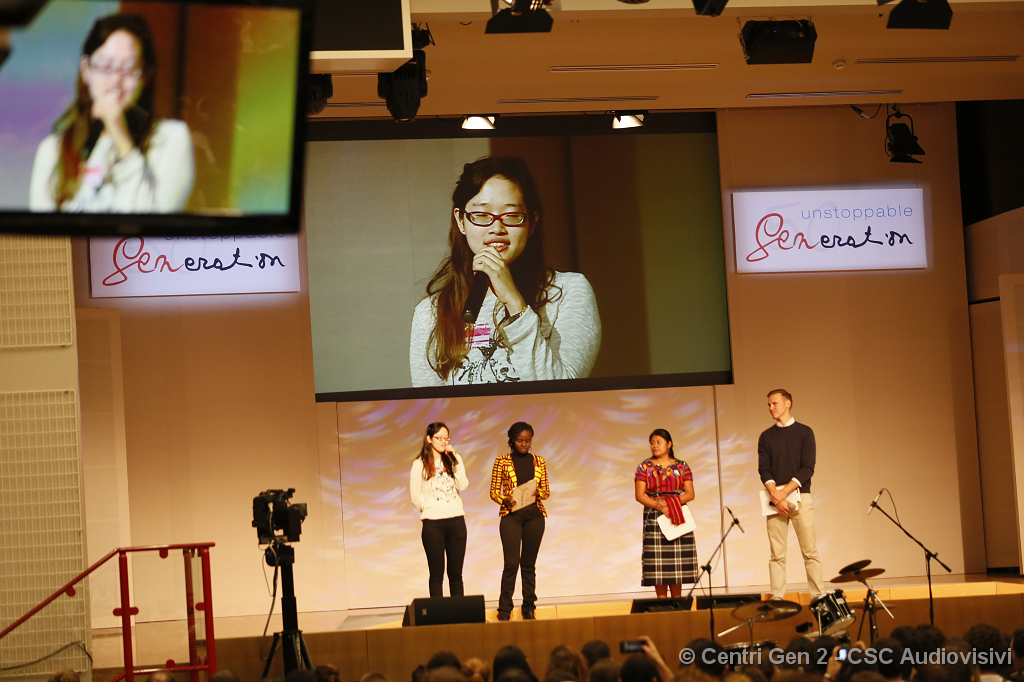 Tuong, a young Vietnamese teacher of 13 children, confided: “they each remind me of Jesus in his abandonment on the cross. Why do I say it like that? Two of them were rejected by the public school after they repeated the same class three times. Another two are handicapped and so the regular school didn’t accept them, and the school for the handicapped was too far away. The others have difficulty learning and their parents are separated and poor. All of them are experiencing a total absence of love, interest, sympathy, decorum; abandoned by their families and society.” Tuong, what motivates you to go on teaching in such a class every day without any institutional assistance? It must not be easy…” “Actually it isn’t easy. One day I was trying to teach a student a certain letter in Vietnamese handwriting. I repeated it two or three times, but he wasn’t getting it and wasn’t able to pronounce it. I kept on trying, repeating it over and over again, but he couldn’t follow. I was about to become angry; I wanted to forget about it and go to another child. Just then his eyes filled with tears and I felt his plea for help. Then I thought: “If Jesus were the one here with this boy who is not understanding, He would never walk away and say: ‘I don’t care about you!’ So, I said: ‘Let’s try it again.’ One day I wasn’t feeling well. Then a girl said to the students: ‘Be good! Be silent! The teacher doesn’t feel well today!’ A little boy of 5 years came up with a cup of water for me, telling me to rest a bit. Wow! Their little gestures made me so happy and confirmed for me that the Gospel art of loving that I tried to live was becoming their lifestyle. Every day they do their best to learn, to live in love and to laugh. We’ve become a little family. Now they fill my days and my life has become colourful and filled with surprises.”
Tuong, a young Vietnamese teacher of 13 children, confided: “they each remind me of Jesus in his abandonment on the cross. Why do I say it like that? Two of them were rejected by the public school after they repeated the same class three times. Another two are handicapped and so the regular school didn’t accept them, and the school for the handicapped was too far away. The others have difficulty learning and their parents are separated and poor. All of them are experiencing a total absence of love, interest, sympathy, decorum; abandoned by their families and society.” Tuong, what motivates you to go on teaching in such a class every day without any institutional assistance? It must not be easy…” “Actually it isn’t easy. One day I was trying to teach a student a certain letter in Vietnamese handwriting. I repeated it two or three times, but he wasn’t getting it and wasn’t able to pronounce it. I kept on trying, repeating it over and over again, but he couldn’t follow. I was about to become angry; I wanted to forget about it and go to another child. Just then his eyes filled with tears and I felt his plea for help. Then I thought: “If Jesus were the one here with this boy who is not understanding, He would never walk away and say: ‘I don’t care about you!’ So, I said: ‘Let’s try it again.’ One day I wasn’t feeling well. Then a girl said to the students: ‘Be good! Be silent! The teacher doesn’t feel well today!’ A little boy of 5 years came up with a cup of water for me, telling me to rest a bit. Wow! Their little gestures made me so happy and confirmed for me that the Gospel art of loving that I tried to live was becoming their lifestyle. Every day they do their best to learn, to live in love and to laugh. We’ve become a little family. Now they fill my days and my life has become colourful and filled with surprises.”
Apr 5, 2017 | Non categorizzato
For the day dedicated to the care of our planet an Earth Village was opened yesterday at Villa Borghese in Rome by Earth Day Italy and the Focolare Movement. A series of events have been scheduled for April 21st through 25th including workshops, testimonies, presentations of projects and discussions. Yesterday, some young people met with several witnesses from the early days of the Focolare Movement. On April 24th there was a presentation of Jesús Morán’s new book, Fedeltà creativa. La sfida dell’attualizzazione di un carisma”.
Apr 4, 2017 | Non categorizzato
Born with a rare illness that caused lacerations in her flesh and enormous suffering throughout her life, Daniela passed away in 1986 at the young age of twenty-four. She belonged to the Gen group in her hometown of Novara, Italy. Her diary reveals the secret that sustained her in the most difficult moments: the choice of Jesus crucified and abandoned, which transfigured every suffering into love. On March 23, 2017 Pope Francis recognized her heroic virtues and declared her “Venerable”. The Focolare Movement rejoices with her parents, brothers and all who had the privilege of knowing her.
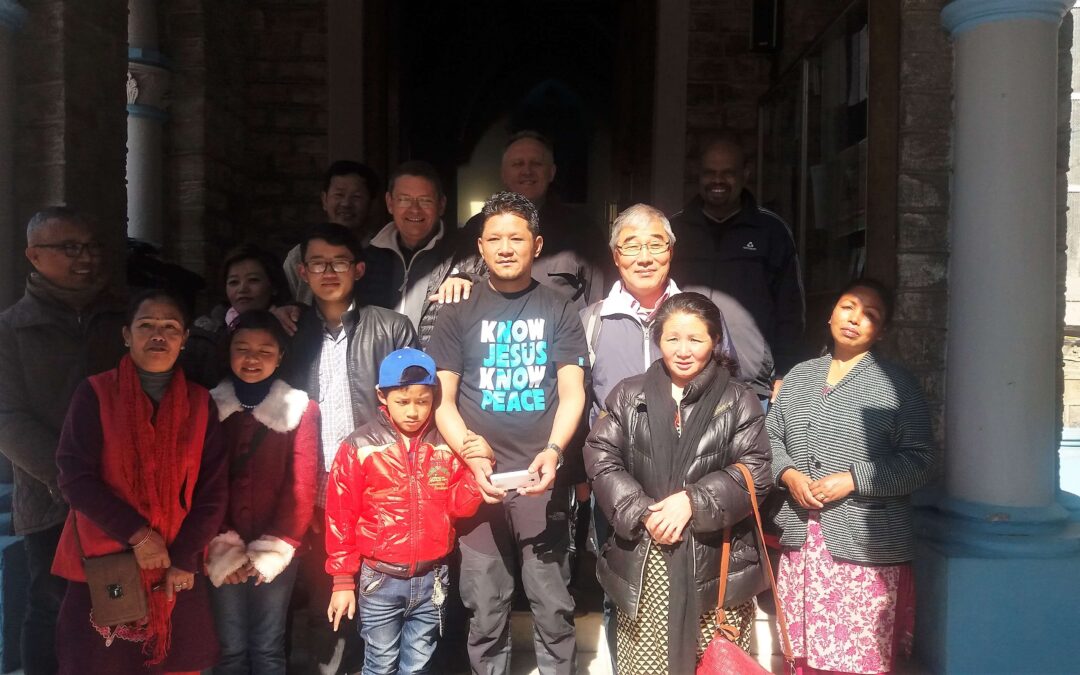
Apr 4, 2017 | Focolare Worldwide
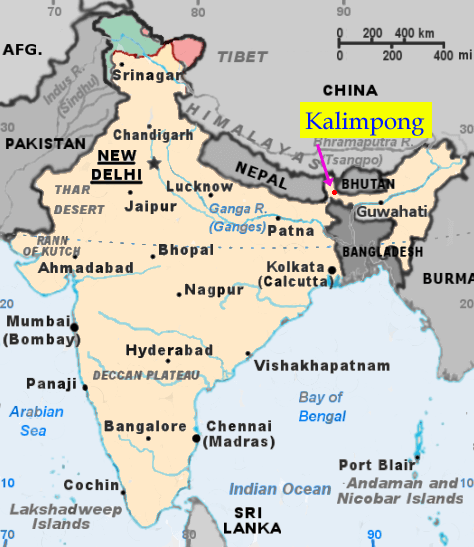 The Kalimpong focolare in West Bengal, India, opened September 9 when three focolarini moved to the house offered by Monsignor Stephen Lepcha, bishop of the Darjeeling diocese. At an altitude of 1,250 meters above sea level, Kalimpong is at the center of the diocese. The other major cities (Darjeeling, Kurseong, Siliguri, Sikkim) can all be reached within a couple of hours, as can the countries of Nepal and Bhutan. “Ever since the beginning of June we had been traveling to that region to search for a house that would be good for a focolare centre,” says Vivek from India. “The bishop offered us the one in Kalimpong. “While we were waiting the past few months, there were a number of opportunities to meet groups of young people in schools and parishes, families, priests, men and women religious, as well as others involved in interreligious dialogue. We offered everyone the spirituality of unity that we try to live. “The bishop, in fact, considers the Focolare Movement, along with his own spirituality, a ‘need of the hour’ to renew the Christian community in his diocese and the fabric of relationships in local society.”
The Kalimpong focolare in West Bengal, India, opened September 9 when three focolarini moved to the house offered by Monsignor Stephen Lepcha, bishop of the Darjeeling diocese. At an altitude of 1,250 meters above sea level, Kalimpong is at the center of the diocese. The other major cities (Darjeeling, Kurseong, Siliguri, Sikkim) can all be reached within a couple of hours, as can the countries of Nepal and Bhutan. “Ever since the beginning of June we had been traveling to that region to search for a house that would be good for a focolare centre,” says Vivek from India. “The bishop offered us the one in Kalimpong. “While we were waiting the past few months, there were a number of opportunities to meet groups of young people in schools and parishes, families, priests, men and women religious, as well as others involved in interreligious dialogue. We offered everyone the spirituality of unity that we try to live. “The bishop, in fact, considers the Focolare Movement, along with his own spirituality, a ‘need of the hour’ to renew the Christian community in his diocese and the fabric of relationships in local society.” 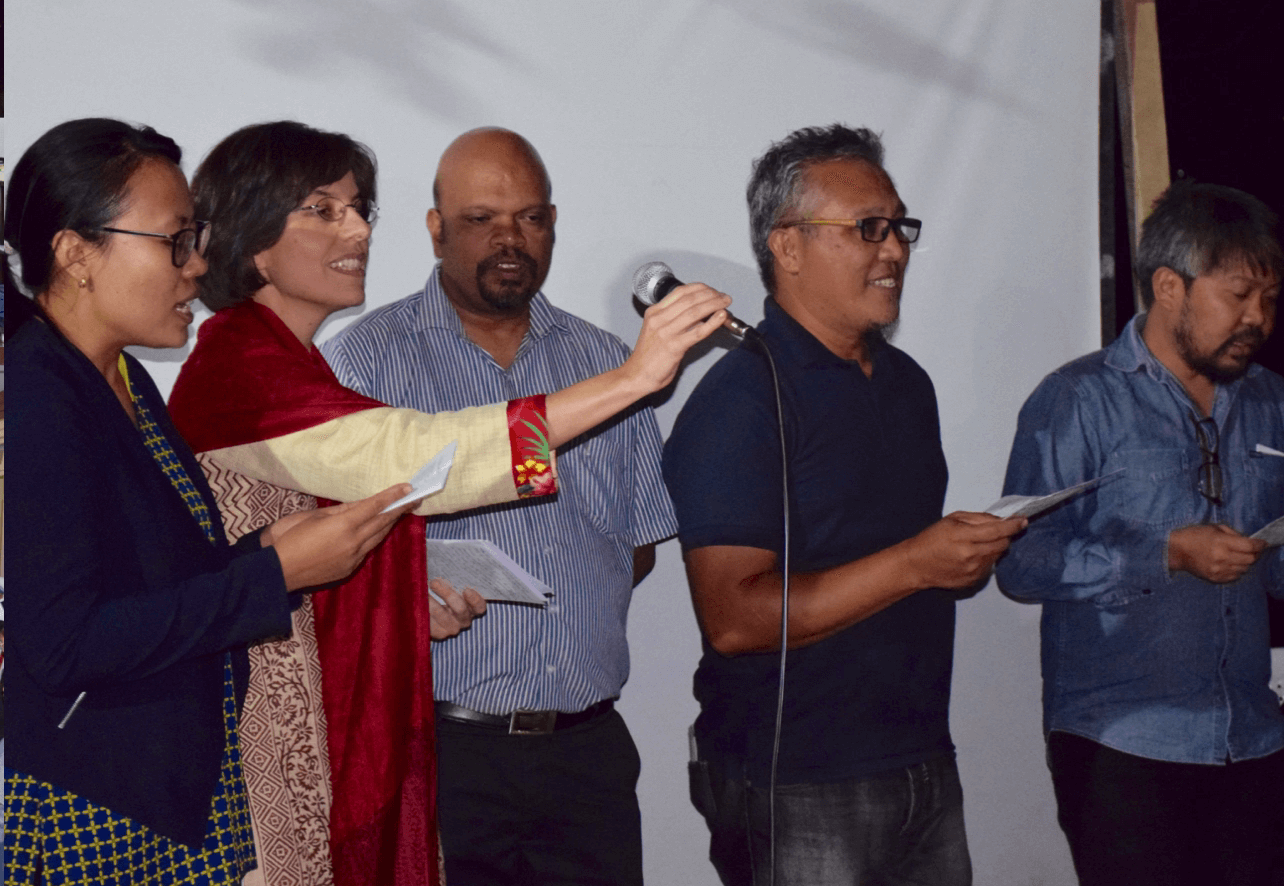 “There was a lot of hospitality as soon as we opened the focolare,” adds Rey, who is from the Philippines. “Both our Focolare community in India and local people filled us to the brim, with goods of every kind for the focolare and food for the first few days. For us it was a sign of God blessing this new project.” The night before inaugurating the new focolare house, the women focolarine of Dehli brought rosaries that had been blessed by Pope Francis. “Having received these presents, one of us thought of giving his to someone else. Another of us did not like that idea, and the situation became a bit tense. What to do? We certainly could not begin the focolare the next day if there was not unity and harmony among us. “So stayed together past midnight in order to clear up the misunderstanding. In this way we reestablished unity and the spiritual presence of Jesus in our midst, which is worth much more than all the various preparations, even if those need to be done well too.”
“There was a lot of hospitality as soon as we opened the focolare,” adds Rey, who is from the Philippines. “Both our Focolare community in India and local people filled us to the brim, with goods of every kind for the focolare and food for the first few days. For us it was a sign of God blessing this new project.” The night before inaugurating the new focolare house, the women focolarine of Dehli brought rosaries that had been blessed by Pope Francis. “Having received these presents, one of us thought of giving his to someone else. Another of us did not like that idea, and the situation became a bit tense. What to do? We certainly could not begin the focolare the next day if there was not unity and harmony among us. “So stayed together past midnight in order to clear up the misunderstanding. In this way we reestablished unity and the spiritual presence of Jesus in our midst, which is worth much more than all the various preparations, even if those need to be done well too.” 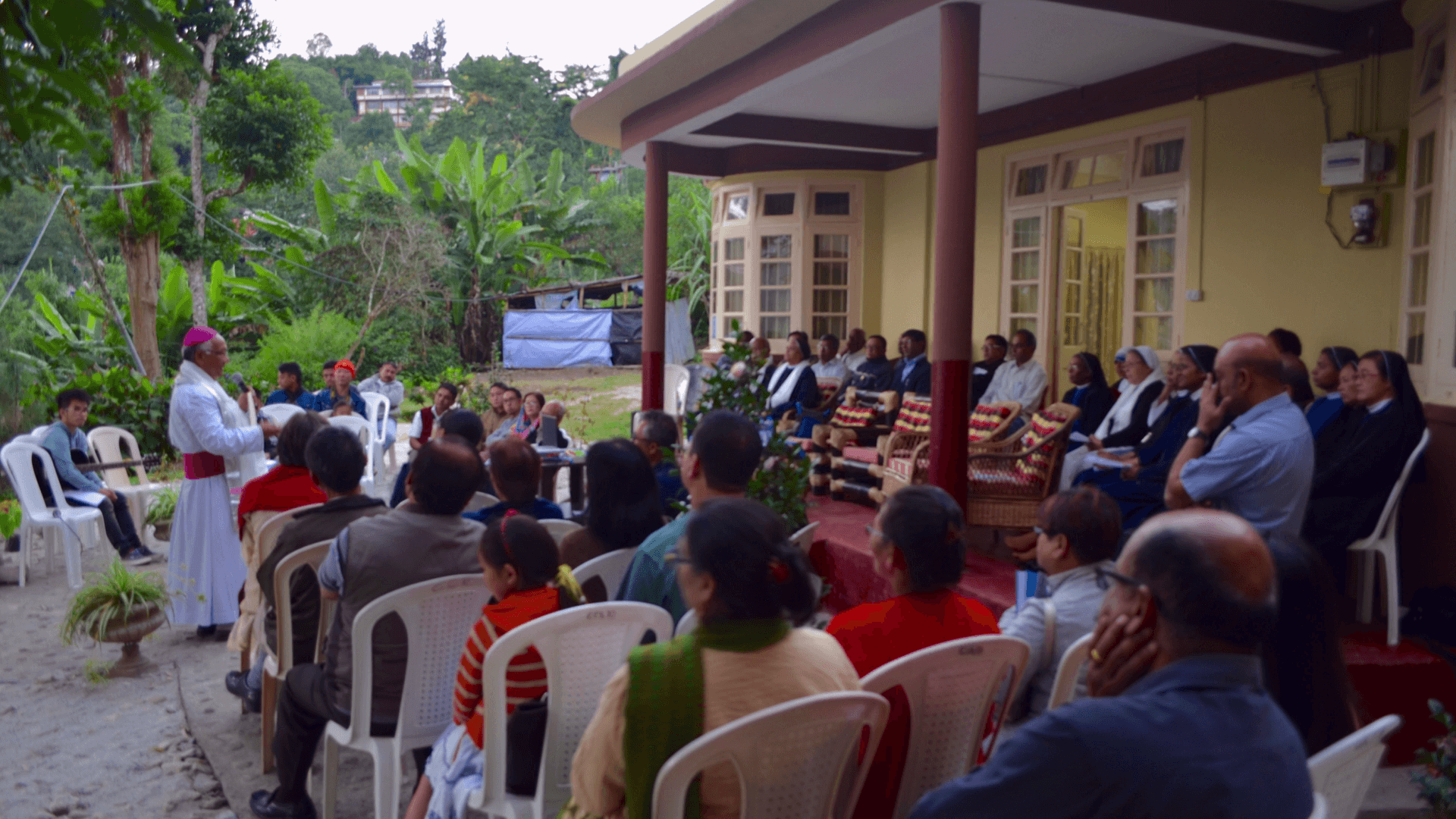 During the inauguration, the Apostolic Nuncio said he hoped “that the new focolare house may be an instrument in God’s hands to fulfill the ideals and the spirituality of the Focolare Movement.” The bishop gave his blessing to the close to 50 people present, emphasizing the focolare’s contribution in the field of interfaith dialogue and its witness to the Gospel through life. In January two of the focolarini were invited by Monsignor Vincent Aind, of the nearby diocese of Bagdogra, to present some spiritual points at a retreat for priests. “The theme was around Jesus’ public ministry, particularly his attitude toward foreigners. It was an opportunity to propose our dynamic way of building relationships in society based on the Gospel.”
During the inauguration, the Apostolic Nuncio said he hoped “that the new focolare house may be an instrument in God’s hands to fulfill the ideals and the spirituality of the Focolare Movement.” The bishop gave his blessing to the close to 50 people present, emphasizing the focolare’s contribution in the field of interfaith dialogue and its witness to the Gospel through life. In January two of the focolarini were invited by Monsignor Vincent Aind, of the nearby diocese of Bagdogra, to present some spiritual points at a retreat for priests. “The theme was around Jesus’ public ministry, particularly his attitude toward foreigners. It was an opportunity to propose our dynamic way of building relationships in society based on the Gospel.” 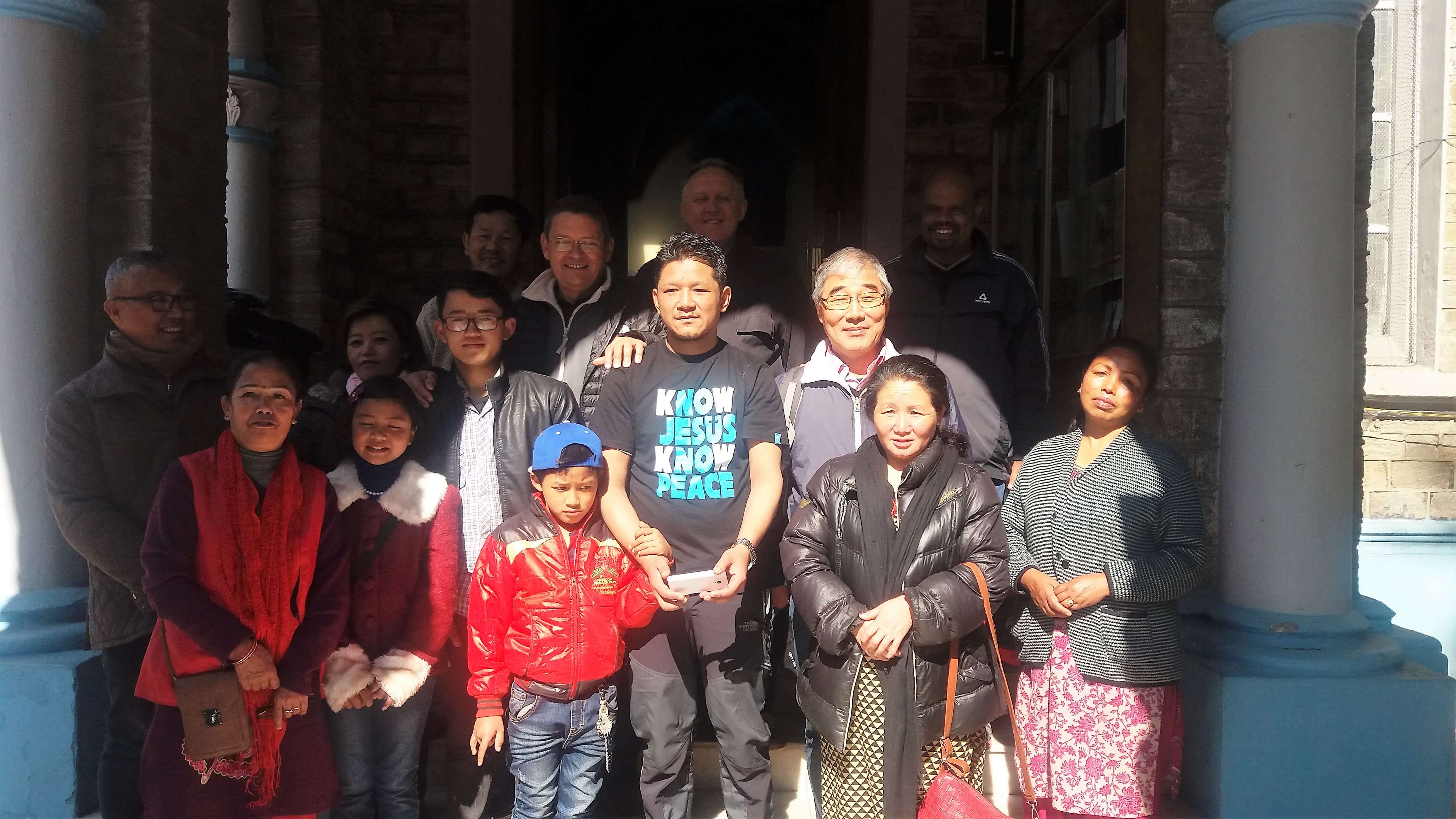 “These last few months we have been giving training sessions to students on leadership and developing character in schools that are nearby and in the surrounding hills,” write Vivek, Rey and Jonathan Lara, who is also from the Philippines. “Lately we’ve been asked to give some training sessions for teachers. There are many opportunities to offer our spirituality to youth and children through these sessions. “It is a challenge for us to understand together how best to proceed in bringing the light of the Gospel to these fertile mountain lands.”
“These last few months we have been giving training sessions to students on leadership and developing character in schools that are nearby and in the surrounding hills,” write Vivek, Rey and Jonathan Lara, who is also from the Philippines. “Lately we’ve been asked to give some training sessions for teachers. There are many opportunities to offer our spirituality to youth and children through these sessions. “It is a challenge for us to understand together how best to proceed in bringing the light of the Gospel to these fertile mountain lands.”

Apr 3, 2017 | Non categorizzato
 Hundreds of thousands of teenagers leading the worldwide sports relay race.
Hundreds of thousands of teenagers leading the worldwide sports relay race. Boys and girls from different ethnic groups, cultures and religions race together to bear witness to their
commitment to peace and to promote a way to reach this peace : the
Golden Rule. The race is promoted by the
Teens for Unity of the
Focolare Movement. It takes place every year on
the first Sunday of May from 11:00 am to 12:00 noon (in the different time zones), during the “United World Week” which is part of the
United World Project. It’s an event that in previous years has involved over 100,000 teenagers in various cities of every corner of the globe.
The baton passes from one time zone to the next making it also an opportunity for exchanges between the places involved.
At different latitudes, sporting events, acts of solidarity and experiences of active citizenship get under way, especially in places where solitude, poverty and marginalization prevail. Personalities from the world of sport and culture, and civil and religious authorities take part in some cities. The website
http://www.run4unity.net helps in preparations for the event and in real time collects the contributions from the
social networks . The many messages, photos and videos received show the number and type of ideas in the pipeline in countries around the world.
Organize Run4Unity in your city! Download Run4Unity description:
PDF PPT
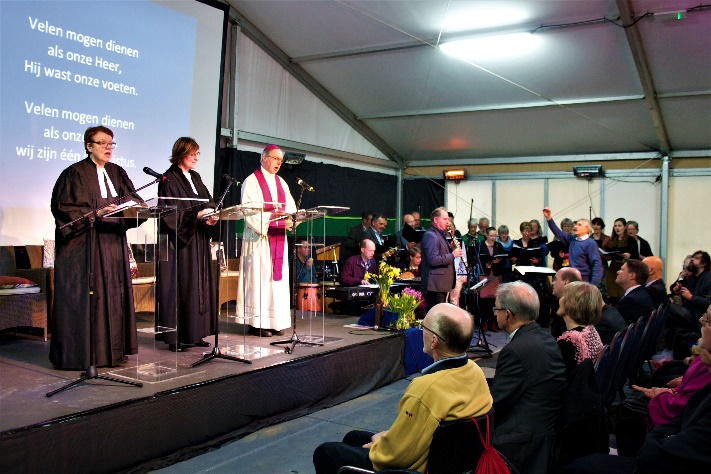
Apr 3, 2017 | Focolare Worldwide, Senza categoria
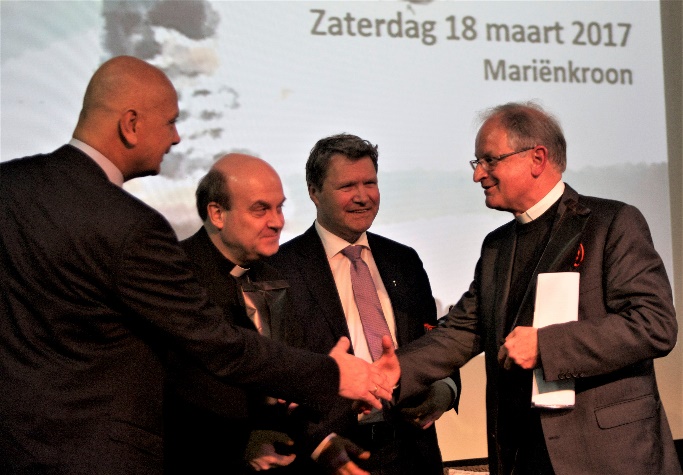 After the historic encounter between the World Lutheran Federation and the Catholic Church last October in Sweden, the 500th anniversary of the Reform has given rise to ecumenical events around the whole world. The March 18th On the Way to Unity Meeting was promoted by the Catholic Athanasios en Willibrord Association for Ecumenism and the Focolare Movement. The date chosen was meant to coincide with the departure of Chiara Lubich, whose commitment to Christian unity is famous. The encounter took place at the Focolare’s Marienkroon village, a hundred kilometres from Amsterdam. Three hundred and eighty people including prominent leaders of several Christian denominations attended. The event showed a people on the way, as the title of the event wished to express. A broad tent was set up that was filled to the brink, until an addition was added for the overflow crowd. The five-hour event included reflection, meals, testimonies, songs and artistic presentations. The highpoint was the moment of common prayer. The large turnout and the fraternal atmosphere created among all, including the leaders of the Churches, made the day seem historic as the director of the Catholic Association for Ecumenism, Geert van Dartel, affirmed. But it was also an “ecumenical feast,” one of the participants remarked.
After the historic encounter between the World Lutheran Federation and the Catholic Church last October in Sweden, the 500th anniversary of the Reform has given rise to ecumenical events around the whole world. The March 18th On the Way to Unity Meeting was promoted by the Catholic Athanasios en Willibrord Association for Ecumenism and the Focolare Movement. The date chosen was meant to coincide with the departure of Chiara Lubich, whose commitment to Christian unity is famous. The encounter took place at the Focolare’s Marienkroon village, a hundred kilometres from Amsterdam. Three hundred and eighty people including prominent leaders of several Christian denominations attended. The event showed a people on the way, as the title of the event wished to express. A broad tent was set up that was filled to the brink, until an addition was added for the overflow crowd. The five-hour event included reflection, meals, testimonies, songs and artistic presentations. The highpoint was the moment of common prayer. The large turnout and the fraternal atmosphere created among all, including the leaders of the Churches, made the day seem historic as the director of the Catholic Association for Ecumenism, Geert van Dartel, affirmed. But it was also an “ecumenical feast,” one of the participants remarked.  “Unity in diversity is not something that we can ‘fabricate’ on our own, but it is a gift from God,” warned Catholic Luther scholar, Hubertus Blaumeiser from the Focolare’s international Abba School centre for studies. Looking back at Lund’s ecumenical agenda, he cited a few words from Chiara Lubich: “The music gets written in Heaven.” It’s up to us to learn how to read that music. In any case, he went on, from the moment that Jesus gave his life for everyone on the cross, unity has been a given. Our task is to respond to that. This explains the first of five “ecumenical imperatives” that were signed in Lund, which recommend that we always begin from the perspective of unity and never separation. But what must be done so that this unity becomes concrete in the midst of oftentimes difficult situations after years of division? Placing ourselves behind the Triune God of Jesus, we are all called to an exodus,” said Blaumeiser, to go out of ourselves and learn to “think and live with the other as our starting point,” and that is “not only at the level of individuals, but also at the level of entire faith communities.” Ultimately, ecumenism is a process to be carried out with Jesus: from death to resurrection. “Unity begins wherever one has the courage to face the difficulty, to enter in with Jesus into the wounds of separation, welcoming one another even when that can be tiresome and difficult. The “ecumenical imperatives” say that we have to let ourselves be changed by the encounter with the other and thereby seek the visible unity [of Christians] and bear witness to the power of the Gospel together. The president of the Dutch Catholic Bishops Conference, Bishop Van den Hende; the General Secretary of the Protestant Churches of the Netherlands, Dr Reuver; and National Coordinator of the Pentecostal Community, Peter Sleebos, responded to those ideas. Commenting on the orientations that were described, they expressed further motives and thoughts, drawing on their own faith traditions. In the afternoon ecumenical testimonies were presented that illustrated what Chiara Lubich liked to call the “dialogue of life”. This was followed by an open discussion with the presenters. One participant commented: “This Saturday we managed to ‘play’ the beautiful notes of the music that is written in Heaven ‘together’.” “This meeting,” declared Pastor René De Reuver to the Catholic Journal, “was very special. I experienced the presence of Christ in the enthusiasm, in the communion and in the passion for union in Him. This doesn’t take away the differences, but leads us to enrich one another mutually.”
“Unity in diversity is not something that we can ‘fabricate’ on our own, but it is a gift from God,” warned Catholic Luther scholar, Hubertus Blaumeiser from the Focolare’s international Abba School centre for studies. Looking back at Lund’s ecumenical agenda, he cited a few words from Chiara Lubich: “The music gets written in Heaven.” It’s up to us to learn how to read that music. In any case, he went on, from the moment that Jesus gave his life for everyone on the cross, unity has been a given. Our task is to respond to that. This explains the first of five “ecumenical imperatives” that were signed in Lund, which recommend that we always begin from the perspective of unity and never separation. But what must be done so that this unity becomes concrete in the midst of oftentimes difficult situations after years of division? Placing ourselves behind the Triune God of Jesus, we are all called to an exodus,” said Blaumeiser, to go out of ourselves and learn to “think and live with the other as our starting point,” and that is “not only at the level of individuals, but also at the level of entire faith communities.” Ultimately, ecumenism is a process to be carried out with Jesus: from death to resurrection. “Unity begins wherever one has the courage to face the difficulty, to enter in with Jesus into the wounds of separation, welcoming one another even when that can be tiresome and difficult. The “ecumenical imperatives” say that we have to let ourselves be changed by the encounter with the other and thereby seek the visible unity [of Christians] and bear witness to the power of the Gospel together. The president of the Dutch Catholic Bishops Conference, Bishop Van den Hende; the General Secretary of the Protestant Churches of the Netherlands, Dr Reuver; and National Coordinator of the Pentecostal Community, Peter Sleebos, responded to those ideas. Commenting on the orientations that were described, they expressed further motives and thoughts, drawing on their own faith traditions. In the afternoon ecumenical testimonies were presented that illustrated what Chiara Lubich liked to call the “dialogue of life”. This was followed by an open discussion with the presenters. One participant commented: “This Saturday we managed to ‘play’ the beautiful notes of the music that is written in Heaven ‘together’.” “This meeting,” declared Pastor René De Reuver to the Catholic Journal, “was very special. I experienced the presence of Christ in the enthusiasm, in the communion and in the passion for union in Him. This doesn’t take away the differences, but leads us to enrich one another mutually.”
Apr 2, 2017 | Senza categoria
- Data di Morte: 03/04/2017
- Branca di Appartenenza: Focolarino
- Nazione: Brazil
Apr 2, 2017 | Non categorizzato
Chiara Lubich, when speaking to a group of young people gathered in Loppiano for their course of formation, revealed the secret of her long experience in dialogue: to listen to others in a profound and sincere way, patiently and without hurry, in order to get to know them and to appreciate them in their cultural diversity. This is the way which encourages others also to listen, and is therefore the basis for a fruitful dialogue. https://vimeo.com/155508846
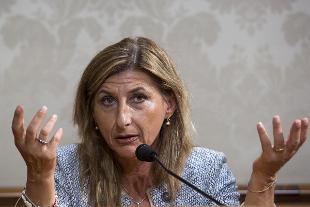
Apr 1, 2017 | Non categorizzato
 Lampedusa Mayor Giuseppina Nicolini was awarded the UNESCO’s peace prize along with French NGO SOS Méditerranée for “her great service to humanity and her constant commitment in saving countless migrants and refugees and receiving them on the Italian island and in other parts of Italy”. The mayor will be present for the 1st May activities in Loppiano and at the Youth for a United World Meeting, to be held also in Loppiano.
Lampedusa Mayor Giuseppina Nicolini was awarded the UNESCO’s peace prize along with French NGO SOS Méditerranée for “her great service to humanity and her constant commitment in saving countless migrants and refugees and receiving them on the Italian island and in other parts of Italy”. The mayor will be present for the 1st May activities in Loppiano and at the Youth for a United World Meeting, to be held also in Loppiano.
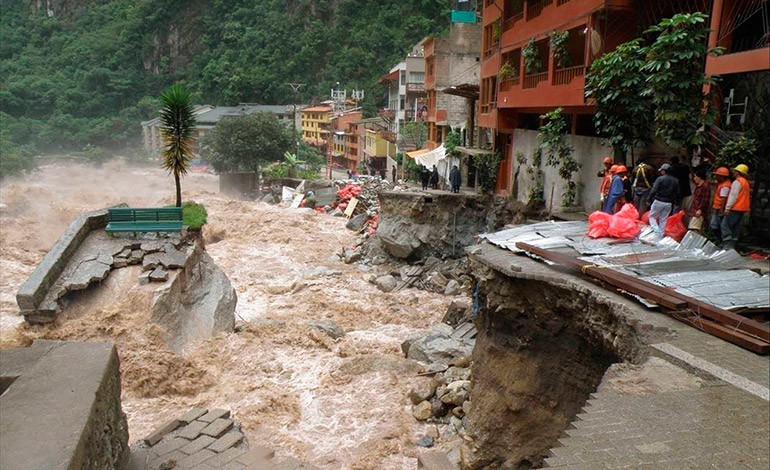
Apr 1, 2017 | Non categorizzato
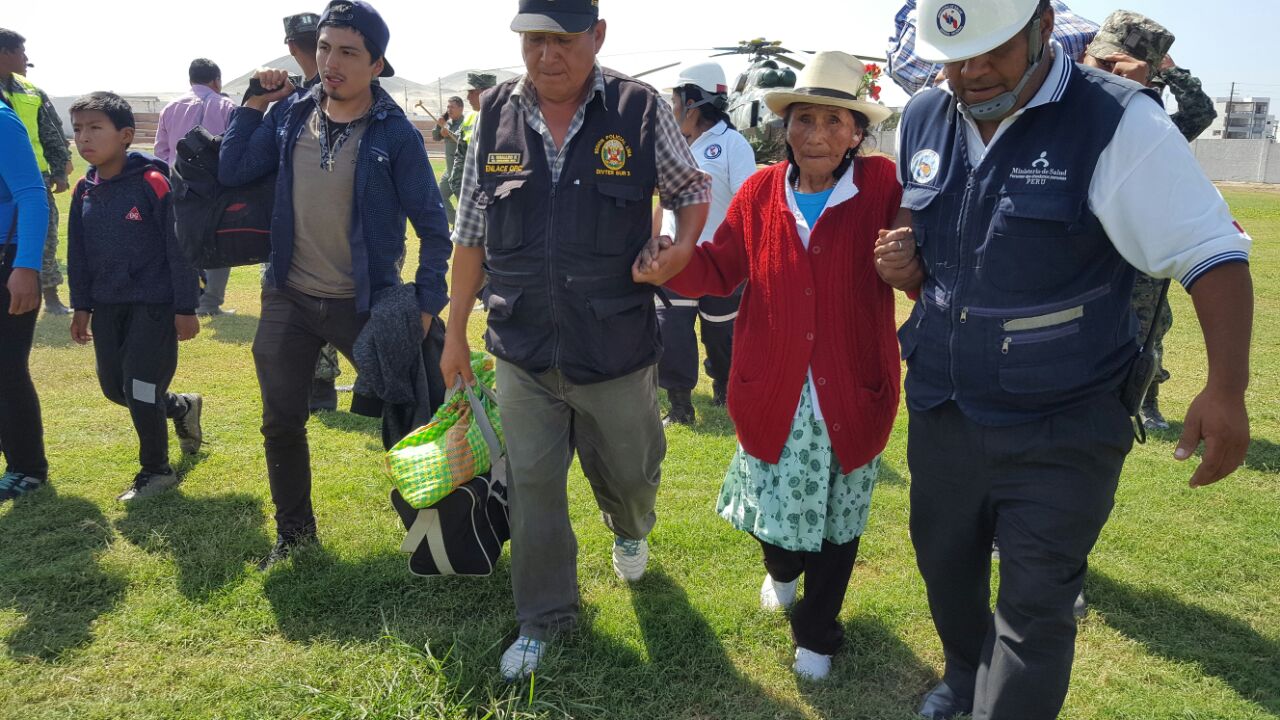 In the face of “the environmental disaster that struck Peru (…) we believe in God’s love, and pray together for the victims, entrusting those suffering from so many difficulties and discomfort“.This was what Maria Voce, Focolare President, wrote to the community of the Movement in the South American country struck by violent storms and floods. Some days before, the Pope had prayed during the Angelus, ensuring his support for the population. “The phenomenon known as the ‘coastal Niño‘, they wrote from Perù, “has produced a 10° rise in the usually cold waters of the Pacific. Combined with a mass of hot air coming from the Caribbean, it has caused a thickening of enormous masses of vapour that condensed over the Andes, in the central zone of Perù, provoking continual rains, that were also real outbursts of rain and violent storms. An enormous mass of water poured over the coastal cities. The figures today report hundreds of deaths and dispersed people, over 200 wounded, and almost 800,000 people who lost their homes or suffered damages. The Government was unprepared and was delayed in the first interventions, but is now in full action.” “But what is surprising is the fantastic reaction of the public and private institutions and especially the members of the community,” they continued. There would be no end to the reports of real solidarity and charity outflowing from the heart of man in moments like this. In the meantime, not only relief aid was sent by the nearby countries: Ecuador (in part struck by similar events in the south of the country), Colombia, Chile, Bolivia, Argentina, Paraguay, Brazil, Uruguay, and the USA; over a 100,000 dollars came from the Pope!
In the face of “the environmental disaster that struck Peru (…) we believe in God’s love, and pray together for the victims, entrusting those suffering from so many difficulties and discomfort“.This was what Maria Voce, Focolare President, wrote to the community of the Movement in the South American country struck by violent storms and floods. Some days before, the Pope had prayed during the Angelus, ensuring his support for the population. “The phenomenon known as the ‘coastal Niño‘, they wrote from Perù, “has produced a 10° rise in the usually cold waters of the Pacific. Combined with a mass of hot air coming from the Caribbean, it has caused a thickening of enormous masses of vapour that condensed over the Andes, in the central zone of Perù, provoking continual rains, that were also real outbursts of rain and violent storms. An enormous mass of water poured over the coastal cities. The figures today report hundreds of deaths and dispersed people, over 200 wounded, and almost 800,000 people who lost their homes or suffered damages. The Government was unprepared and was delayed in the first interventions, but is now in full action.” “But what is surprising is the fantastic reaction of the public and private institutions and especially the members of the community,” they continued. There would be no end to the reports of real solidarity and charity outflowing from the heart of man in moments like this. In the meantime, not only relief aid was sent by the nearby countries: Ecuador (in part struck by similar events in the south of the country), Colombia, Chile, Bolivia, Argentina, Paraguay, Brazil, Uruguay, and the USA; over a 100,000 dollars came from the Pope!  Town halls, supermarkets, parishes, institutions of various Christian churches and of other religions have created Collection Centres for basic essentials, nonperishable food, cleaning products, blankets, etc. Also the Focolare opened a Collection Centre in Lima. “Some families of the community,” they said, “were struck by the floods, especially to the north of the country. In particular, one of our very poor communities close to Lima, suffered intense rains for which they were not prepared, since for 60 years it had not rained in that area. The nuns of a nearby community, who helped in our adoption project, say that many of our children are homeless, but are all alive…”. There is very little electricity throughout the country and water is lacking. A 70-year-old man had a stroke but there was no way of bringing him to the hospital about 50 km away… The benevolence of the members is impressive and immediately generates reciprocity. We sent help to a family in Chulucanas, whose house roof and walls were damaged, but we found out that with other families of the parish and the Movement, they started to help others with greater needs.”
Town halls, supermarkets, parishes, institutions of various Christian churches and of other religions have created Collection Centres for basic essentials, nonperishable food, cleaning products, blankets, etc. Also the Focolare opened a Collection Centre in Lima. “Some families of the community,” they said, “were struck by the floods, especially to the north of the country. In particular, one of our very poor communities close to Lima, suffered intense rains for which they were not prepared, since for 60 years it had not rained in that area. The nuns of a nearby community, who helped in our adoption project, say that many of our children are homeless, but are all alive…”. There is very little electricity throughout the country and water is lacking. A 70-year-old man had a stroke but there was no way of bringing him to the hospital about 50 km away… The benevolence of the members is impressive and immediately generates reciprocity. We sent help to a family in Chulucanas, whose house roof and walls were damaged, but we found out that with other families of the parish and the Movement, they started to help others with greater needs.”
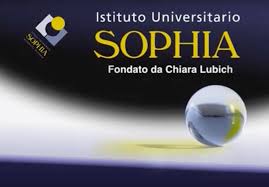
Mar 31, 2017 | Non categorizzato
 Ten years from its founding, Sophia University Institute expands from one course on Fundamentals and Prospectives of a Culture of Unity, to three distinct Master’s Degrees: Economic & Political Sciences, and Trinitarian Ontology & Culture of Unity. A programme that offers young people from around the world, an inter-discplinary and trans-disciplinary education focused on innovative sectors of social and civil economy, communion, participatory policies and their relationship to theology and philosophy. “With the addition of the new academic titles, Economic and Political Sciences and Trinitarian Ontology,” president of Sophia University Institute, Piero Coda, says that “Sophia offers students an academic degree which joins together the unitarian sense of the human adventure with a scientific degree that contributes to the total development of the individual and society.” Benedetto Gui, Coordinator of the Economy and Management Department, adds: “Among the novelties is the addition of the English language for several of the courses in the Economic and Political Sciences Degree programme.” He continues: “In an age when young people don’t have the courage to propose ideals to live by, Sophia seeks to found its vision of the world on a deep-rooted respect for the human person, including his or her culture, religion and views – and to look towards a world without hatred, war, oppression exlusion, or superiority over others. In the field of economics this doesn’t mean having a recipe ready to be imposed, but looking beyond today’s dominant reductive vision of economics and economic realtions, even though scientific reasearch is demonstrating the inadequacy of such a vision.” The students at Sophia come from 30 countries and belong to different religions. The Institute offers them a course of study that joins learning – through listening, discussing, reading, attending lectures – to real life. Applying the logic of openness to others as the very method for approaching learning which creates community life in the classroom, corriders and residences where students have an extraordinary intercultural experience. Gui continues: “What we strive to bring about together with the students is, on the one hand, the acquisition of those skills that one would expect to find in any graduate in the field of economics and, on the other hand, a deeper understanding of that economic vision which I mentioned before, through the examination of new lines of research and contact with economic projects that put that vision into practice . . . topics that are often neglected in university settings.” Once they’ve completed their studies, how do the students approach the work world? “Recruiters are well aware that knowledge of the subject is not enough to make a young person a valid member of an organisation. The ability to dialogue with the bearers of other types of knowledge is also necessary, knowing how to collaborate and to assume responsibilities. Our experience thus far has shown us that our students are appreciated not only for their academic preparation, but also for other skills that the experience at Sophia is particularly adept at developing in people. Be careful though: Education shouldn’t be be geared towards finding a job. It should also promote the growth of the human person and develop a capacity for personal and group intitiative which is also a precious contribution towards society.”
Ten years from its founding, Sophia University Institute expands from one course on Fundamentals and Prospectives of a Culture of Unity, to three distinct Master’s Degrees: Economic & Political Sciences, and Trinitarian Ontology & Culture of Unity. A programme that offers young people from around the world, an inter-discplinary and trans-disciplinary education focused on innovative sectors of social and civil economy, communion, participatory policies and their relationship to theology and philosophy. “With the addition of the new academic titles, Economic and Political Sciences and Trinitarian Ontology,” president of Sophia University Institute, Piero Coda, says that “Sophia offers students an academic degree which joins together the unitarian sense of the human adventure with a scientific degree that contributes to the total development of the individual and society.” Benedetto Gui, Coordinator of the Economy and Management Department, adds: “Among the novelties is the addition of the English language for several of the courses in the Economic and Political Sciences Degree programme.” He continues: “In an age when young people don’t have the courage to propose ideals to live by, Sophia seeks to found its vision of the world on a deep-rooted respect for the human person, including his or her culture, religion and views – and to look towards a world without hatred, war, oppression exlusion, or superiority over others. In the field of economics this doesn’t mean having a recipe ready to be imposed, but looking beyond today’s dominant reductive vision of economics and economic realtions, even though scientific reasearch is demonstrating the inadequacy of such a vision.” The students at Sophia come from 30 countries and belong to different religions. The Institute offers them a course of study that joins learning – through listening, discussing, reading, attending lectures – to real life. Applying the logic of openness to others as the very method for approaching learning which creates community life in the classroom, corriders and residences where students have an extraordinary intercultural experience. Gui continues: “What we strive to bring about together with the students is, on the one hand, the acquisition of those skills that one would expect to find in any graduate in the field of economics and, on the other hand, a deeper understanding of that economic vision which I mentioned before, through the examination of new lines of research and contact with economic projects that put that vision into practice . . . topics that are often neglected in university settings.” Once they’ve completed their studies, how do the students approach the work world? “Recruiters are well aware that knowledge of the subject is not enough to make a young person a valid member of an organisation. The ability to dialogue with the bearers of other types of knowledge is also necessary, knowing how to collaborate and to assume responsibilities. Our experience thus far has shown us that our students are appreciated not only for their academic preparation, but also for other skills that the experience at Sophia is particularly adept at developing in people. Be careful though: Education shouldn’t be be geared towards finding a job. It should also promote the growth of the human person and develop a capacity for personal and group intitiative which is also a precious contribution towards society.”
Mar 30, 2017 | Senza categoria
On 18 March 2017, the Youth for a United World Movement was awarded the 7th edition of the prize entitled: “Chiara Lubich: Manfredonia, City of Universal Brotherhood”, promoted by the New World Association (Italy). The award was given on the following grounds: “The Youth for a United World Movement is spread over five continents and includes people of different races, nationalities, cultures, Christian denominations and religions, as well as persons of no religious conviction. It is commended for giving witness that a united world is possible, for striving to make humanity one family through social and cultural actions which respect one another’s identity. The commitment to work and spread the UNITED WORLD PROJECT has been greatly praised.”
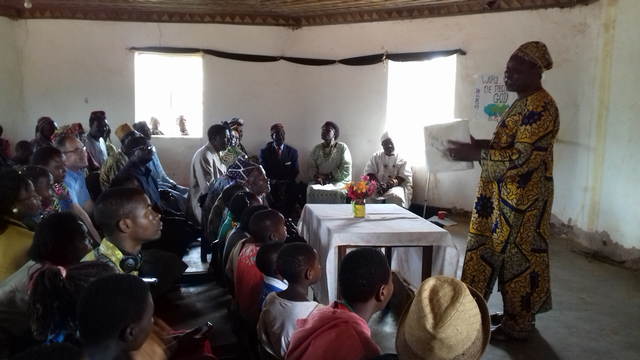
Mar 30, 2017 | Non categorizzato
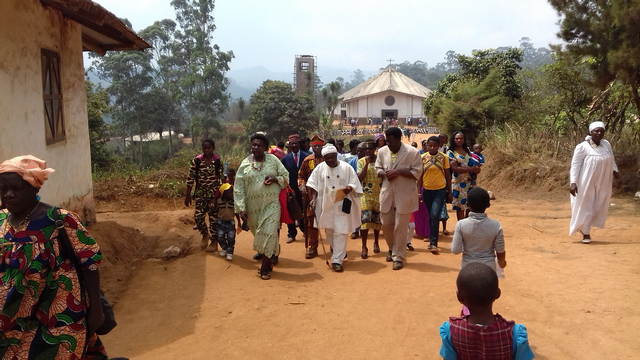 “We have renewed the pact and promise to continue living in the spirit of love, unity and peace which have changed our lives.” These were the words that the Chiefs of the Kingdom of Fonjumetaw wrote to Maria Voce, President of the Focolare Movement, when they gathered together with their communities last 5 March in said Kingdom, a village in the Cameroon forest. About 200 people participated in the event which took root in the history of these people. A strong bond unites the vast tropical region around Fonjumetaw to Fontem, where for the first time, in 1966, two focolarini doctors arrived to help the local population to overcome the diseases that were causing the high infant mortality rate. Fifty years ago, the Bangwa people were saved from the risk of extinction. Last September the Fons (traditional chiefs of the villages in the African region) went to Rome for the Jubilee of Mercy and to pay homage to Chiara Lubich (“Mafua Ndem,” Queen sent by God, as they named her), before her tomb at the International Focolare Centre in Rocca di Papa. The African delegation participated also in St. Peter’s Square in the meeting with Pope Francis and met the current President of the Focolare Movement, Maria Voce, and the Co-President, Jesús Morán.
“We have renewed the pact and promise to continue living in the spirit of love, unity and peace which have changed our lives.” These were the words that the Chiefs of the Kingdom of Fonjumetaw wrote to Maria Voce, President of the Focolare Movement, when they gathered together with their communities last 5 March in said Kingdom, a village in the Cameroon forest. About 200 people participated in the event which took root in the history of these people. A strong bond unites the vast tropical region around Fonjumetaw to Fontem, where for the first time, in 1966, two focolarini doctors arrived to help the local population to overcome the diseases that were causing the high infant mortality rate. Fifty years ago, the Bangwa people were saved from the risk of extinction. Last September the Fons (traditional chiefs of the villages in the African region) went to Rome for the Jubilee of Mercy and to pay homage to Chiara Lubich (“Mafua Ndem,” Queen sent by God, as they named her), before her tomb at the International Focolare Centre in Rocca di Papa. The African delegation participated also in St. Peter’s Square in the meeting with Pope Francis and met the current President of the Focolare Movement, Maria Voce, and the Co-President, Jesús Morán. 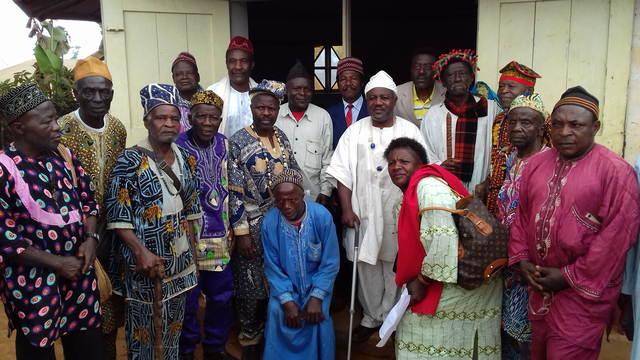 The Jubilee gave a new impulse to the New Evangelisation, strengthening the bonds of fraternity which these villages today are trying hard to live. The meeting of 5 March took on this meaning. The Fon recounted the “pilgrimage” to Rome with the other Fons of the zone, with Bishop Andrew Nkea Fuanya, and Bishop Emeritus, Francis Teke Lysinge. Upon inviting all to take a new step in the life of fraternity, he announced a “year of reconcilement.” Everyone agreed with joy. And in a celebrative atmosphere the youth, adults and children hugged one another to seal this commitment. One of the Chiefs presented the “dice of love”. Then he cast it in the air. The phrase that appeared was “love one another” and it was a confirmation also through a game, of the commitment each one wanted to undertake.
The Jubilee gave a new impulse to the New Evangelisation, strengthening the bonds of fraternity which these villages today are trying hard to live. The meeting of 5 March took on this meaning. The Fon recounted the “pilgrimage” to Rome with the other Fons of the zone, with Bishop Andrew Nkea Fuanya, and Bishop Emeritus, Francis Teke Lysinge. Upon inviting all to take a new step in the life of fraternity, he announced a “year of reconcilement.” Everyone agreed with joy. And in a celebrative atmosphere the youth, adults and children hugged one another to seal this commitment. One of the Chiefs presented the “dice of love”. Then he cast it in the air. The phrase that appeared was “love one another” and it was a confirmation also through a game, of the commitment each one wanted to undertake.  Then followed the experiences and staging of six points of the art of loving. One of the Chiefs recounted a strong experience: for many years he had not forgiven someone for an episode in which he had felt offended, but after hearing the invitation of the Pope to forgive and forget in the year of reconcilement, he was able to do so. At the conclusion, a festive moment ensued with the Fon and Mafua (Queen), and all the Chiefs, VIPS and focolarini. The Mafua talked about her encounters with Chiara in 2000 on the occasion of her visit to Cameroon, the “pilgrimage” of the delegation of 40 people to the Centre of the Focolare Movement in Rome, and the desire to spread the life of “Mother Chiara” amongst her people. The Chiefs’ letter to Emmaus, 17 years after Chiara’s last visit in these regions, sealed the commitment and the desire of all. These New Evangelisation meetings will continue. This is why the Fon of Fonjumetaw assigned one of the Chiefs to take charge of them. The next is set for 2 April.
Then followed the experiences and staging of six points of the art of loving. One of the Chiefs recounted a strong experience: for many years he had not forgiven someone for an episode in which he had felt offended, but after hearing the invitation of the Pope to forgive and forget in the year of reconcilement, he was able to do so. At the conclusion, a festive moment ensued with the Fon and Mafua (Queen), and all the Chiefs, VIPS and focolarini. The Mafua talked about her encounters with Chiara in 2000 on the occasion of her visit to Cameroon, the “pilgrimage” of the delegation of 40 people to the Centre of the Focolare Movement in Rome, and the desire to spread the life of “Mother Chiara” amongst her people. The Chiefs’ letter to Emmaus, 17 years after Chiara’s last visit in these regions, sealed the commitment and the desire of all. These New Evangelisation meetings will continue. This is why the Fon of Fonjumetaw assigned one of the Chiefs to take charge of them. The next is set for 2 April.
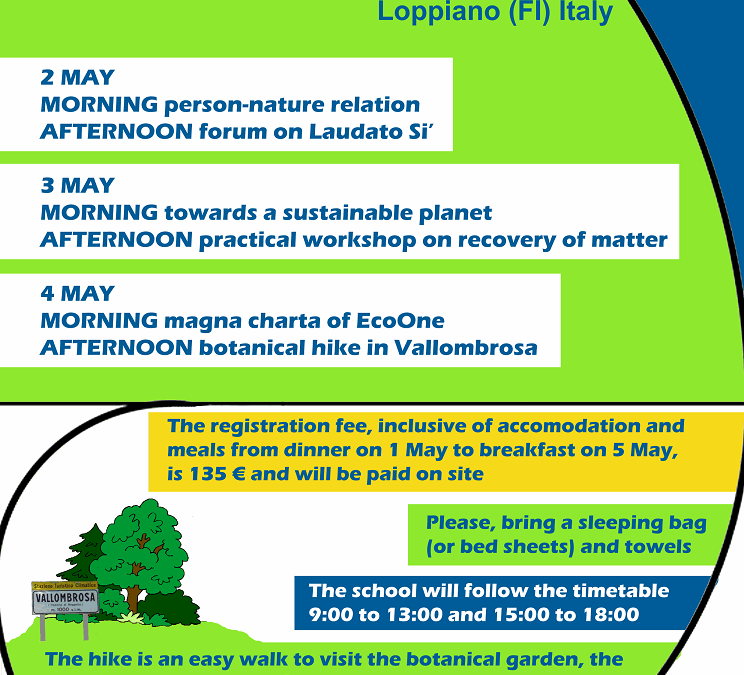
Mar 29, 2017 | Non categorizzato
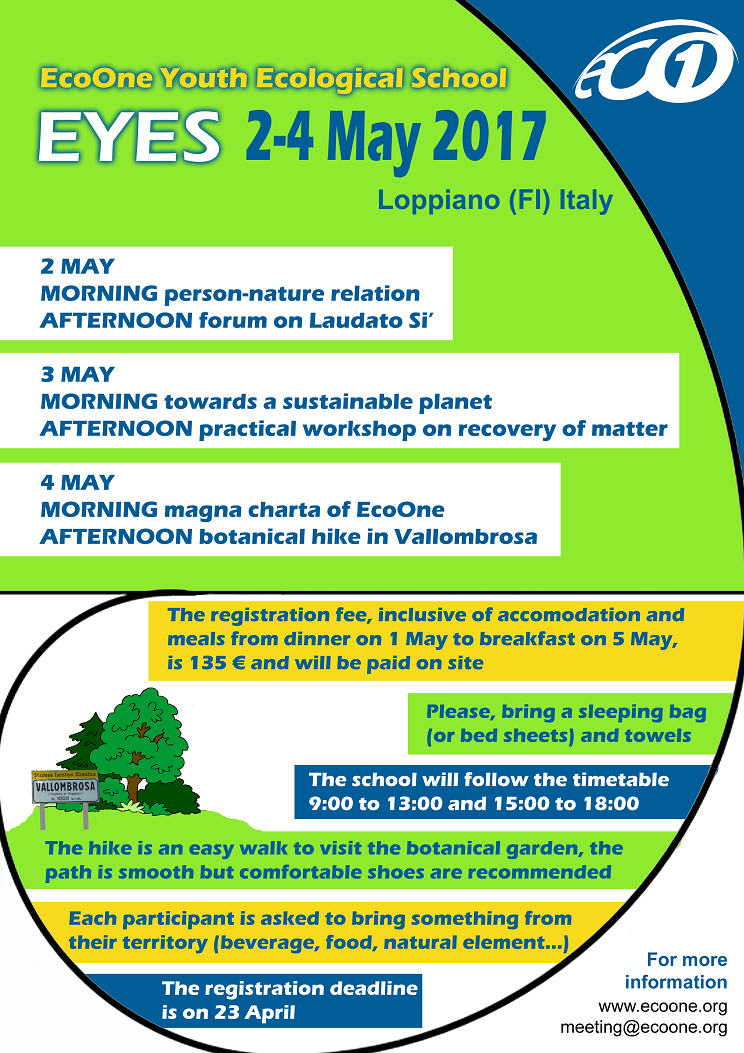 The Earth, our common home, is protesting. It seems to be turning more and more into a huge garbage dump. Its temperature is dramatically increasing and the depletion of natural resources makes it impossible to sustain the current level of consumption by the richest countries. Bio-diversity disappears and the quality of human life deteriorates. What is happening calls for an urgent need to undergo a bold cultural revolution. No one wants to regress to the neanderthal era, but it is essential to change direction and to work out a new model of development. The International EcoOne cultural initiative invites you to an ecological school to be held 2-4 May 2017 in Loppiano, Italy. It is aimed at young people, but open to all those who wish to look with new eyes at the relationship between human beings and nature. To subscribe please fill out the online form You can find more information in the attached flyer. The EcoOne Committee
The Earth, our common home, is protesting. It seems to be turning more and more into a huge garbage dump. Its temperature is dramatically increasing and the depletion of natural resources makes it impossible to sustain the current level of consumption by the richest countries. Bio-diversity disappears and the quality of human life deteriorates. What is happening calls for an urgent need to undergo a bold cultural revolution. No one wants to regress to the neanderthal era, but it is essential to change direction and to work out a new model of development. The International EcoOne cultural initiative invites you to an ecological school to be held 2-4 May 2017 in Loppiano, Italy. It is aimed at young people, but open to all those who wish to look with new eyes at the relationship between human beings and nature. To subscribe please fill out the online form You can find more information in the attached flyer. The EcoOne Committee

Mar 29, 2017 | Focolare Worldwide
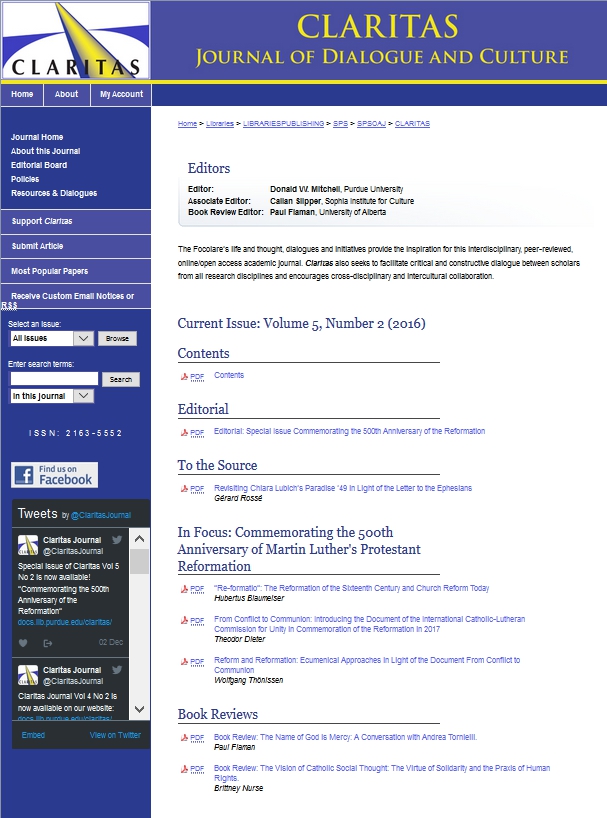 Courageous impulse towards ecumenical commitment. Catholics and Lutherans can walk together on a path towards a full reconciliation. 500 years have passed since Luther’s Reformation movement, the commemoration of which will last a year, starting from 30 October last year to 31 October 2017 (a symbolical date that recalls the publication in 1517, of the Ninety-Five theses of Luther on indulgences and justification, in Wittenberg). Inauguration events started with a meeting in the Lutheran Cathedral of Lund in Sweden, between Bishop Munib Younan, President of the World Lutheran Federation, and Pope Francis. On that occasion, the Pope had invited all Christians united by baptism, to announce together the Word of God, putting an end to all the century-old theological disputes that had separated the two Churches, and underlining the common gifts received thanks to dialogue and mutual listening. The Italian journal Nuova Umanità (New Humanity) dedicated its 221st edition to this event, focusing on the work entitled, “Half a millennium after Luther” (published in March 2016). Curated by Hubertus Blaumeiser, it presents the essays of a Lutheran theologian, Theodor Dieter, and a Catholic theologian, Wolfgang Thönissen. The historically important Lund event was preceded by the document, “From conflict to communion,” published in 2013 by the Lutheran–Catholic Commission for Unity, which works on behalf of the World Lutheran Federation and the Pontifical Council for the promotion of unity among Christians. The text indicates five “ecumenical imperatives” to definitively overcome the causes of disagreements and live a season of common commitment in mutual trust. The First imperative: Catholics and Lutherans strongly united by baptism should start always from the perspective of unity and not from the point of view of division, to strengthen what they have in common, instead of underlining and experiencing differences. The Catholic and Lutheran Churches, in the course of history have defined themselves through disagreements. Now there is need of the contrary, of the experience of encouragement and reciprocal criticism. Then comes the second imperative: continually letting oneself be transformed by the encounter with the other and the reciprocal witness of faith, through dialogue that opens to various ways and degrees of communion. The Third: renewed commitment of oneself to seek visible unity and elaborate and develop together the concrete steps this implies, and constantly strive towards this objective. The Fourth: rediscover together the power of the Gospel of Jesus Christ for our time. And lastly the fifth: the missionary task of ecumenism becomes greater inasmuch as our societies become pluralistic from the religious standpoint, and this is why together we have to bear witness to God’s mercy in the Gospel announcement and service to the world. The report ends by saying: «The beginnings of the Reformation will be remembered in an adequate and just manner when Lutherans and Catholics will listen to the Gospel of Jesus Christ together, and will once again let themselves be called to form a community together with the Lord.» The genesis and development of such a document was deepened in edition 223 of New Humanity, dedicated specifically to this decisive step for ecumenism. Following the trail of the Lund event and as a logical consequence of the “theoretical” answer given by the Ecumenical Council of Churches, at the end of February in the town of Ottmaring and characterised by an outstanding ecumenical calling, the President and Co-President of the Focolare, in the name of the entire Movement undertook the commitment to testify to and work for communion between the Churches beyond all divisions. «As a global movement with many members who are Christians of many Churches, and which is thus already living the experience of a people united by mutual love […] we recognise in the Lund meeting a true and proper kairos, a sign of God for our time, which pushes Christians to commit themselves even more, to make the testament of Jesus – that all may be one – a reality. »
Courageous impulse towards ecumenical commitment. Catholics and Lutherans can walk together on a path towards a full reconciliation. 500 years have passed since Luther’s Reformation movement, the commemoration of which will last a year, starting from 30 October last year to 31 October 2017 (a symbolical date that recalls the publication in 1517, of the Ninety-Five theses of Luther on indulgences and justification, in Wittenberg). Inauguration events started with a meeting in the Lutheran Cathedral of Lund in Sweden, between Bishop Munib Younan, President of the World Lutheran Federation, and Pope Francis. On that occasion, the Pope had invited all Christians united by baptism, to announce together the Word of God, putting an end to all the century-old theological disputes that had separated the two Churches, and underlining the common gifts received thanks to dialogue and mutual listening. The Italian journal Nuova Umanità (New Humanity) dedicated its 221st edition to this event, focusing on the work entitled, “Half a millennium after Luther” (published in March 2016). Curated by Hubertus Blaumeiser, it presents the essays of a Lutheran theologian, Theodor Dieter, and a Catholic theologian, Wolfgang Thönissen. The historically important Lund event was preceded by the document, “From conflict to communion,” published in 2013 by the Lutheran–Catholic Commission for Unity, which works on behalf of the World Lutheran Federation and the Pontifical Council for the promotion of unity among Christians. The text indicates five “ecumenical imperatives” to definitively overcome the causes of disagreements and live a season of common commitment in mutual trust. The First imperative: Catholics and Lutherans strongly united by baptism should start always from the perspective of unity and not from the point of view of division, to strengthen what they have in common, instead of underlining and experiencing differences. The Catholic and Lutheran Churches, in the course of history have defined themselves through disagreements. Now there is need of the contrary, of the experience of encouragement and reciprocal criticism. Then comes the second imperative: continually letting oneself be transformed by the encounter with the other and the reciprocal witness of faith, through dialogue that opens to various ways and degrees of communion. The Third: renewed commitment of oneself to seek visible unity and elaborate and develop together the concrete steps this implies, and constantly strive towards this objective. The Fourth: rediscover together the power of the Gospel of Jesus Christ for our time. And lastly the fifth: the missionary task of ecumenism becomes greater inasmuch as our societies become pluralistic from the religious standpoint, and this is why together we have to bear witness to God’s mercy in the Gospel announcement and service to the world. The report ends by saying: «The beginnings of the Reformation will be remembered in an adequate and just manner when Lutherans and Catholics will listen to the Gospel of Jesus Christ together, and will once again let themselves be called to form a community together with the Lord.» The genesis and development of such a document was deepened in edition 223 of New Humanity, dedicated specifically to this decisive step for ecumenism. Following the trail of the Lund event and as a logical consequence of the “theoretical” answer given by the Ecumenical Council of Churches, at the end of February in the town of Ottmaring and characterised by an outstanding ecumenical calling, the President and Co-President of the Focolare, in the name of the entire Movement undertook the commitment to testify to and work for communion between the Churches beyond all divisions. «As a global movement with many members who are Christians of many Churches, and which is thus already living the experience of a people united by mutual love […] we recognise in the Lund meeting a true and proper kairos, a sign of God for our time, which pushes Christians to commit themselves even more, to make the testament of Jesus – that all may be one – a reality. »
Mar 28, 2017 | Non categorizzato
The University Institute will be organising two open days at its international campus during which courses are presented in managerial skills in a changing world. Loppiano (Italy), 31 March and 30 April 2017
Mar 28, 2017 | Non categorizzato, Word of
https://www.focolare.org/gb/files/2017/03/201704Wol.mp3
Word of Life for ages 4-8 | for ages 9-14 | for ages 15-17 | MP3 Audio | Print
This was an invitation two travellers made to a stranger, having met him on their way from Jerusalem to the village of Emmaus. The stranger had come upon them while they were ‘talking and discussing’ all that had recently happened in that city, and he seemed to be the only person to know nothing about it. So the two of them welcomed him to walk with them, and they told him about ‘a prophet mighty in deed and word before God and all the people’ (Lk 24:19). They had put their trust in him, yet he had been handed over by the chief priests and the leaders of the people to the Romans, condemned to death and crucified. It was an immense tragedy, and they could make no sense of it. As they walked, the stranger helped them understand the meaning of what had happened, based upon Scripture. It rekindled hope in their hearts. When they reached Emmaus, they urged him to join them for supper: ‘Stay with us, because it is almost evening.’ While at table together, the stranger blessed the bread and shared it with them. This gesture opened their eyes to who he was: the man once crucified and dead was now risen! The two of them immediately changed their plans. They went back to Jerusalem to find the other disciples and tell them the great news. We too can be disillusioned, appalled, disheartened by a terrible feeling of powerlessness in the face of injustices done to the innocent and defenceless. Our own lives have their share of pain, uncertainty, darkness… How we would like to transform it all into peace, hope, light for ourselves and for others! Do we want to meet Someone who can understand us to the core of our being, Someone who can shed light upon our journey through life? Jesus, the God-man, freely accepted to experience the tunnel of pain as we do, to meet each of us in the depths of our situations. He felt physical pain, but he also felt inner pain: from betrayal by his friends to the point even of feeling forsaken by that very God he had always called Father (see Mt 27:46; Mk 15:34). Through his unshakeable faith in the love of God, he overcame such immense pain, entrusting himself once more to the Father (Lk 23:46), and from the Father he received new life. Jesus has brought all of us onto this same path, and he wants to travel with us. In the April 1999 Focolare Word of Life, Chiara Lubich wrote, ‘He is there in anything that hurts us … Let’s try to recognize Jesus in all the distress and the tough situations in life, in all darkness, in our personal misfortunes and those of others, and in the sufferings of the world around us. They are him because he has made them his own. It would be enough … to do something practical to lessen “his” suffering in the poor … for us to … find … a new fullness of life.’ A seven-year-old girl shared her experience: ‘I was very sad when my daddy was sent to prison. I loved Jesus in him, so when we went to visit, I didn’t cry in front of him.’ A young wife said: ‘I accompanied my husband, Robert, through the last months of his life, after the doctors gave him no hope of recovery. I never left him for a moment. Seeing him, I saw Jesus. Robert was on the cross, really on the cross.’ Their love for one another became a source of light for their friends, who were drawn to compete in solidarity, never letting up and spreading to many others, giving rise to an association for social development called Abbraccio Planetario (‘global embrace’). ‘What we experienced with Robert,’ said one of his friends, ‘inspired us to follow him on a real journey towards God. We often ask ourselves the meaning of suffering, illness and death. I believe everyone who had the gift of sharing a part of the journey alongside Robert now has a very clear answer.’ This month all Christians celebrate the mystery of Jesus’ death and resurrection. It is a chance to rekindle our faith in God’s love, which allows us to transform pain into love. Every detachment, separation, failure, and death itself, can become for us too, a source of light and peace. Sure of God’s closeness to each of us, in any situation, let’s repeat with trust the disciples’ prayer at Emmaus, ‘Stay with us, because it is almost evening.’ Letizia Magri
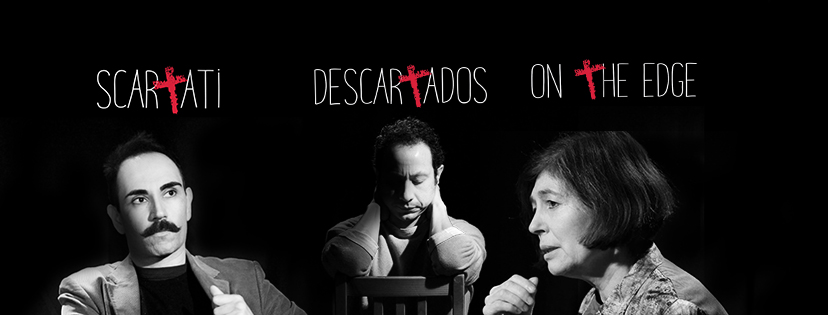
Mar 28, 2017 | Non categorizzato
 Discarded, outcast, crushed, seemingly with no escape: in their stories lie the inspiring sparks for this CSC Media production – a 20 minute video which recounts three true stories while maintaining anonymity. The protagonists who at the height of their pain come across a person – or rather the Person: Jesus. He too cried out in his abandonment on the cross, discarded by heaven and earth. They experience passing from death to life, from pain to love as expressed by some passages from Chiara Lubich which are included in the stories It is a project which was created thanks to a host of contributors. Featuring: Alessio De Caprio (Italy), Rafael Reyes Loyo (Mexico), and Sarah Finch (UK). Music by Sandro Crippa. Artwork by Roberto Cipollone (Bottega di Ciro, Italy). See trailer and more details at www.focolare.org/scartati. The video is available in three languages: Italian, Spanish and English.
Discarded, outcast, crushed, seemingly with no escape: in their stories lie the inspiring sparks for this CSC Media production – a 20 minute video which recounts three true stories while maintaining anonymity. The protagonists who at the height of their pain come across a person – or rather the Person: Jesus. He too cried out in his abandonment on the cross, discarded by heaven and earth. They experience passing from death to life, from pain to love as expressed by some passages from Chiara Lubich which are included in the stories It is a project which was created thanks to a host of contributors. Featuring: Alessio De Caprio (Italy), Rafael Reyes Loyo (Mexico), and Sarah Finch (UK). Music by Sandro Crippa. Artwork by Roberto Cipollone (Bottega di Ciro, Italy). See trailer and more details at www.focolare.org/scartati. The video is available in three languages: Italian, Spanish and English.
Mar 27, 2017 | Non categorizzato
The international network HDC – Health Dialogue Culture (formerly known as MDC – Medicine Dialogue Communion) promotes a Congress in Sao Paulo, Brazil from 7 to September 10, 2017 entitled: Promoting Global Health: strategies and actions on the individual and collective level
Rationale of Congress:
Nowadays, it is accepted that biochemistry and genetics are not enough for an insightful understanding of health and illness. Both personal and sociocultural context should be taken into account and underpinned. As health contributes remarkably to economic growth and social well-being, the determinants of health should be considered as strategic. Health systems, then, have to look at patients in their wholeness and to respect their complexities and experiences. The relationships between health professionals and health managers and between them and users of health services are key elements of the healthcare system. Spiritual dimension too cannot be ignored and can have a substantial influence on quality of life, satisfaction and outcomes of personal health. The Congress aims to focus on those aspects in the endeavour of better understanding them and to share experiences and good practices.
Mar 27, 2017 | Senza categoria
Focolare representatives of 21 publishing houses gathered at the Mariapolis Conference Centre in CastelGandolfo, Italy, during March 24 -26, in order to share their professional experience and to discuss their identity and the new forms of collaboration envisaged on a global level. Maria Voce thanked them for their Important work in spreading the message of the Focolare Movement.
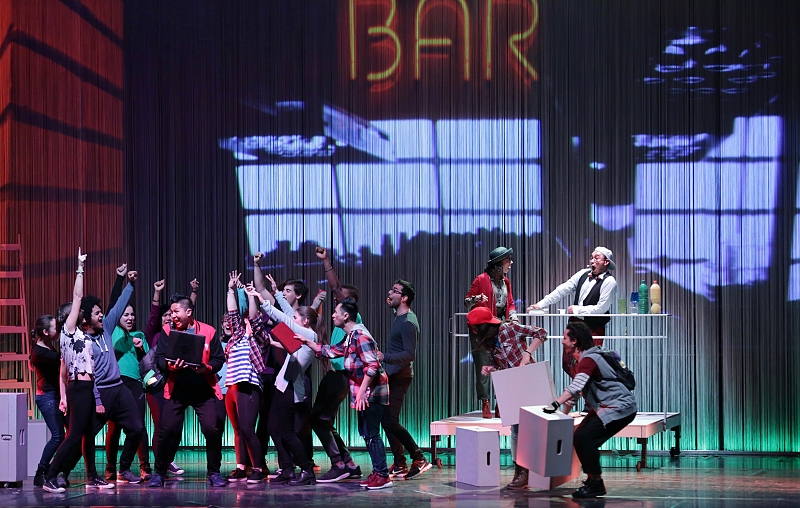
Mar 27, 2017 | Non categorizzato
 On stage is a triumph of diversity. This is how Campus: the Musical, which played March 18 at the Mandela Forum in Florence, Italy, can be described. The show is a unique genre, in which people of various levels of disability, mostly young people, gather around professionals that make up the international performing arts group Gen Rosso. The troupe has been around since 1966, when it began from an idea inspired by Chiara Lubich’s charism. The choice of venue could not be more perfect. The sports arena at the center of Florence, where there are public events, sports, concerts and debates, in 2004 was changed to the Nelson Mandela Forum to bring high-caliber cultural events to the community, as well as a sense of openness, exchange and the happy meeting of diversity of all kinds. “The purpose of freedom is to create it for others,” Mandela used to say. For those whom freedom means moving and singing to the rhythms and textures of African ethno, samba, jazz, rock, pop or rap, it may get taken for granted. But for those who have a more difficult daily routine in a wheelchair, or who find it difficult to navigate a sidewalk, or who live with the limits of a psychological disability, it can seem like a dream. This is a dream that “Uniti senza barriere” (United without barriers), an association that works in the world of disability in that area, wanted to make reality, thanks to meeting Gen Rosso and collaborating with other associations and agencies that are active in the social sphere. Campus is inspired by true events, taking advantage of the palette of colors and decibels that the band uses to give voice and soul to the peaceful weapon of dialogue (which was so dear to Mandela). It is set on a university campus, where the stories of nine teens of different nationalities cross, young people searching for their way, with a weighty past behind them and an unknown future ahead to create. The musical has a global current running through it, supported by a narrative that points to the heart of challenges today, thanks to its universal language and a sound that is definitely live. The project has reached the stage after a long period of reflection on the key issues of our time: culture clashes, the struggle against terrorism of every kind, and migration. Rather than just respond, it proposes solutions that are tangible, such as the “Italia per” project (Italy for…), which the international group promotes with workshops and shows dedicated to specific problems. At the Nelson Mandela Forum, after many hours of rehearsals, disabled youth and children, and even four small infants with their mothers, made their debut dancing and singing a dream of unity and fraternity. Proud to take on their roles, emotions in their voices and faces ran high as the professional artists took a step back to leave them the stage and the applause (from close to 1,000 attending). Campus has certainly hit one of its marks: overturning traditional understandings of disability. It also shows what the true limits of our existence are: when we build up material and cultural barriers that divide us, or relate to someone disabled and think that we have something more to teach or show them. “It always seems impossible until it’s done,” Mandela would have said.
On stage is a triumph of diversity. This is how Campus: the Musical, which played March 18 at the Mandela Forum in Florence, Italy, can be described. The show is a unique genre, in which people of various levels of disability, mostly young people, gather around professionals that make up the international performing arts group Gen Rosso. The troupe has been around since 1966, when it began from an idea inspired by Chiara Lubich’s charism. The choice of venue could not be more perfect. The sports arena at the center of Florence, where there are public events, sports, concerts and debates, in 2004 was changed to the Nelson Mandela Forum to bring high-caliber cultural events to the community, as well as a sense of openness, exchange and the happy meeting of diversity of all kinds. “The purpose of freedom is to create it for others,” Mandela used to say. For those whom freedom means moving and singing to the rhythms and textures of African ethno, samba, jazz, rock, pop or rap, it may get taken for granted. But for those who have a more difficult daily routine in a wheelchair, or who find it difficult to navigate a sidewalk, or who live with the limits of a psychological disability, it can seem like a dream. This is a dream that “Uniti senza barriere” (United without barriers), an association that works in the world of disability in that area, wanted to make reality, thanks to meeting Gen Rosso and collaborating with other associations and agencies that are active in the social sphere. Campus is inspired by true events, taking advantage of the palette of colors and decibels that the band uses to give voice and soul to the peaceful weapon of dialogue (which was so dear to Mandela). It is set on a university campus, where the stories of nine teens of different nationalities cross, young people searching for their way, with a weighty past behind them and an unknown future ahead to create. The musical has a global current running through it, supported by a narrative that points to the heart of challenges today, thanks to its universal language and a sound that is definitely live. The project has reached the stage after a long period of reflection on the key issues of our time: culture clashes, the struggle against terrorism of every kind, and migration. Rather than just respond, it proposes solutions that are tangible, such as the “Italia per” project (Italy for…), which the international group promotes with workshops and shows dedicated to specific problems. At the Nelson Mandela Forum, after many hours of rehearsals, disabled youth and children, and even four small infants with their mothers, made their debut dancing and singing a dream of unity and fraternity. Proud to take on their roles, emotions in their voices and faces ran high as the professional artists took a step back to leave them the stage and the applause (from close to 1,000 attending). Campus has certainly hit one of its marks: overturning traditional understandings of disability. It also shows what the true limits of our existence are: when we build up material and cultural barriers that divide us, or relate to someone disabled and think that we have something more to teach or show them. “It always seems impossible until it’s done,” Mandela would have said.
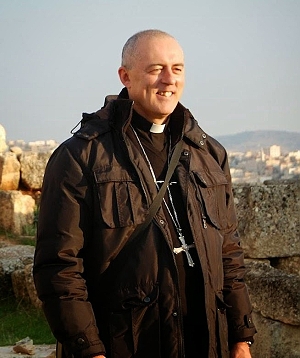
Mar 26, 2017 | Focolare Worldwide
 I arrived in Baghdad as the Apostolic Nuncio to Iraq and Jordan, two weeks after the terrible 2010 attack in the Syrian-Catholic cathedral that provoked the death of two priests, 44 faithful and five soldiers. Upon visiting the cathedral, one can imagine the desolation and I had the deep impression that I had been sent there to share that pain. The relationships between Christians and Muslims had been compromised for years, up to the point that also in the Nunciature, for any work or purchase only Christians were chosen. I felt I had to go against the current. I started to try learning Arab (unfortunately with little success!) to be able to greet everyone. When I was allowed, I would chat with the guards assigned to protect the Nunciature, at times sharing the dinner they prepared, even if the soldiers were not the best of cooks. The nun who acted as my interpreter did not agree too much with this, but I was convinced that something had to be done. I felt I had to “trust” even if this brought about some surprise. Once a Muslim barber to whom I started to go to have the hair in my ears removed, put a bit of gas from his lighter into my ear to burn the hair. I knew it was ingenuity on my part, but done on purpose in order to see the other person’s viewpoint. The only Muslim who worked in the Nunciature was the gardener. When I left he said to me: “So you are going, and I wish you could leave me a bit of your peace.” He probably had seen that it was an interior peace which only Jesus can give. Once when speaking to the gen (the youth of the Focolare), Chiara Lubich recalled the Emperor Constantine, who had seen a cross in the sky bearing the words: “In this sign you will conquer” – and said that our weapon is Jesus Forsaken and there is no other way for unity other than the cross. There Jesus had taken upon himself every division and separation, and rose from the dead. Also for us the defeat will be transformed into victory. In May 2015 I was transferred to Cuba. The preparations for Pope Francis’s visit were underway. All was proceeding well, but a small diplomatic incident at the last minute shook the preparation activities. And in a second I lost my interior peace, precisely in the presence of the Pope. Upon entering the Havana Revolution square for the solemn Mass, I saw the stylised picture of Che Guevara, with the words: “Hasta la victoria, siempre!” (Towards victory, always!). I immediately thought of the key of our victory: Jesus Forsaken. And I understood that I could not reach victory if not by passing through that defeat. Jesus could not resurrect without dying. Jesus Forsaken is not the instrument to be used in cases of necessity to solve our problems. He is the Spouse with whom we should be “one flesh.” And if I complain about something or someone, I realise that I am complaining about Him. I can’t say that I have chosen Him if I prefer not to have problems. I know that I should be happy when there are some rather than when there are none. So the problems, divisions, wars, poverty etc., no longer frighten me. I don’t live waiting for them to end soon, but in the hope that arises from the certainty that in Him these have already been resolved. So I live serenely and can transmit peace also to those who do not share my faith, like the gardener of the Nunciature in Baghdad.
I arrived in Baghdad as the Apostolic Nuncio to Iraq and Jordan, two weeks after the terrible 2010 attack in the Syrian-Catholic cathedral that provoked the death of two priests, 44 faithful and five soldiers. Upon visiting the cathedral, one can imagine the desolation and I had the deep impression that I had been sent there to share that pain. The relationships between Christians and Muslims had been compromised for years, up to the point that also in the Nunciature, for any work or purchase only Christians were chosen. I felt I had to go against the current. I started to try learning Arab (unfortunately with little success!) to be able to greet everyone. When I was allowed, I would chat with the guards assigned to protect the Nunciature, at times sharing the dinner they prepared, even if the soldiers were not the best of cooks. The nun who acted as my interpreter did not agree too much with this, but I was convinced that something had to be done. I felt I had to “trust” even if this brought about some surprise. Once a Muslim barber to whom I started to go to have the hair in my ears removed, put a bit of gas from his lighter into my ear to burn the hair. I knew it was ingenuity on my part, but done on purpose in order to see the other person’s viewpoint. The only Muslim who worked in the Nunciature was the gardener. When I left he said to me: “So you are going, and I wish you could leave me a bit of your peace.” He probably had seen that it was an interior peace which only Jesus can give. Once when speaking to the gen (the youth of the Focolare), Chiara Lubich recalled the Emperor Constantine, who had seen a cross in the sky bearing the words: “In this sign you will conquer” – and said that our weapon is Jesus Forsaken and there is no other way for unity other than the cross. There Jesus had taken upon himself every division and separation, and rose from the dead. Also for us the defeat will be transformed into victory. In May 2015 I was transferred to Cuba. The preparations for Pope Francis’s visit were underway. All was proceeding well, but a small diplomatic incident at the last minute shook the preparation activities. And in a second I lost my interior peace, precisely in the presence of the Pope. Upon entering the Havana Revolution square for the solemn Mass, I saw the stylised picture of Che Guevara, with the words: “Hasta la victoria, siempre!” (Towards victory, always!). I immediately thought of the key of our victory: Jesus Forsaken. And I understood that I could not reach victory if not by passing through that defeat. Jesus could not resurrect without dying. Jesus Forsaken is not the instrument to be used in cases of necessity to solve our problems. He is the Spouse with whom we should be “one flesh.” And if I complain about something or someone, I realise that I am complaining about Him. I can’t say that I have chosen Him if I prefer not to have problems. I know that I should be happy when there are some rather than when there are none. So the problems, divisions, wars, poverty etc., no longer frighten me. I don’t live waiting for them to end soon, but in the hope that arises from the certainty that in Him these have already been resolved. So I live serenely and can transmit peace also to those who do not share my faith, like the gardener of the Nunciature in Baghdad.
Mar 26, 2017 | Non categorizzato
At the Angelus on March 19, Pope Francis affirmed his “closeness to the dear people of Peru, who have been struck hard by devastating floods. I pray for the victims and the rescue workers.” The Focolare community is praying and is on site bringing relief as well.
Mar 25, 2017 | Non categorizzato
Message from Cardinal Francis X. Kriengsak Kovithavanij, Archbishop of Bangkok, for the funeral of Cardinal Miloslav Vlk – Prague, 25 March 2017.« I bring a message on behalf of the bishop friends of the Focolare – Catholic bishops and bishops of various Churches in many parts of the world. For us, Cardinal Miloslav was a friend, a brother and we could say even a father. “His life mirrored Jesus’ life in so many ways”, a Lutheran bishop wrote recently. At our bishops meetings he helped us experience the freshness of Gospel life and the joy of being a family of true brothers, united in Jesus. In the spirit of the Second Vatican Council, he worked tirelessly for Christian unity and for communion among bishops and with the Pope. Thank you, Miloslav. Through your heroic witness you showed what it means to have God in the first place and gave us the key to making the Church ever more beautiful, united and alive.»
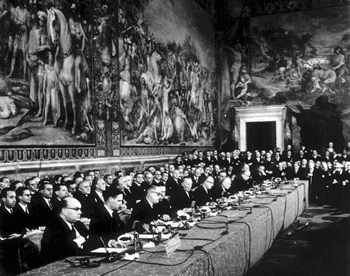
Mar 25, 2017 | Focolare Worldwide
 What Europe should be United Europe is another step towards a united world. It is a step forward and an achievement under the pressure of popular requests, natural rights, Christian revelation, moral and spiritual forces, with the addition of economic and political, and scientific and technological pressure. All these propel towards unification, the final evolution of reason and morals, of life in time and in eternity. For Clement of Alexandria – heir of Greek wisdom – unity is the good, and producer of life; division is the evil and generator of death. Civilisation grows proportionately with how much it unifies people. For Huxley, every new progress of civilisation is a progress in charity, which is the sentiment which tends to make everyone one. It is no wonder since it is the soul of Christ whose testament ended in the vow: «so that all may be one.» Charity leads to integration, communion, and solidarity, also in politics and economy. And here, between the essential forces that press toward European integration, we want to illustrate the forces of the spirit, leaving it to illustrate the political, economic, and social aspects, etc. Igino Giordani, «Fides», May 1961, p.130 Christianity and Europe Europe is full of resentment like a storage of explosives, kept alive by philosophies and false patriotisms, mythologies and egoistic interests. In order not to explode, Europe needs to remove all this inflammable material. It needs a universal reconcilement, which could free it from the past so it could look to the future. Whoever will carry out «this ministry of reconciliation?» It is Christianity: this well of sanctity, which Europe still guards and still communicates to other continents. And Christianity implies a unification in freedom and peace, with the elimination of wars and other reasons for friction. Igino Giordani, «Fides», May 1961, p.131 The soul of Europe Europe already has a soul: Christianity, its essence and its genesis. In this common spiritual breath, also the material and human factors blend and arise, vivifying themselves with a universal ideal. And so the peoples of Europe, upon reviving these principles at the base of their history, melting them in the ideal flame of solidarity, the fruit of love – which is divine intelligence – will find in its rationality, coexistence, urgency and need of it, the solution, firstly to their problems. This is the a decisive moment, in which an internal war – which today more than ever before, appears irrational and fratricide – could mark the definitive catastrophe. Love instead, putting the good in circulation, will be able mark the final salvation. Igino Giordani, «Fides», May 1961, p.131
What Europe should be United Europe is another step towards a united world. It is a step forward and an achievement under the pressure of popular requests, natural rights, Christian revelation, moral and spiritual forces, with the addition of economic and political, and scientific and technological pressure. All these propel towards unification, the final evolution of reason and morals, of life in time and in eternity. For Clement of Alexandria – heir of Greek wisdom – unity is the good, and producer of life; division is the evil and generator of death. Civilisation grows proportionately with how much it unifies people. For Huxley, every new progress of civilisation is a progress in charity, which is the sentiment which tends to make everyone one. It is no wonder since it is the soul of Christ whose testament ended in the vow: «so that all may be one.» Charity leads to integration, communion, and solidarity, also in politics and economy. And here, between the essential forces that press toward European integration, we want to illustrate the forces of the spirit, leaving it to illustrate the political, economic, and social aspects, etc. Igino Giordani, «Fides», May 1961, p.130 Christianity and Europe Europe is full of resentment like a storage of explosives, kept alive by philosophies and false patriotisms, mythologies and egoistic interests. In order not to explode, Europe needs to remove all this inflammable material. It needs a universal reconcilement, which could free it from the past so it could look to the future. Whoever will carry out «this ministry of reconciliation?» It is Christianity: this well of sanctity, which Europe still guards and still communicates to other continents. And Christianity implies a unification in freedom and peace, with the elimination of wars and other reasons for friction. Igino Giordani, «Fides», May 1961, p.131 The soul of Europe Europe already has a soul: Christianity, its essence and its genesis. In this common spiritual breath, also the material and human factors blend and arise, vivifying themselves with a universal ideal. And so the peoples of Europe, upon reviving these principles at the base of their history, melting them in the ideal flame of solidarity, the fruit of love – which is divine intelligence – will find in its rationality, coexistence, urgency and need of it, the solution, firstly to their problems. This is the a decisive moment, in which an internal war – which today more than ever before, appears irrational and fratricide – could mark the definitive catastrophe. Love instead, putting the good in circulation, will be able mark the final salvation. Igino Giordani, «Fides», May 1961, p.131
Mar 24, 2017 | Non categorizzato
Pope Francis writes to the Bishop of Westminster: “I commend the victims to the loving mercy of God and invoke divine strength and peace upon the grieving families.” Solidarity from all over the world with all those affected by this tragedy.
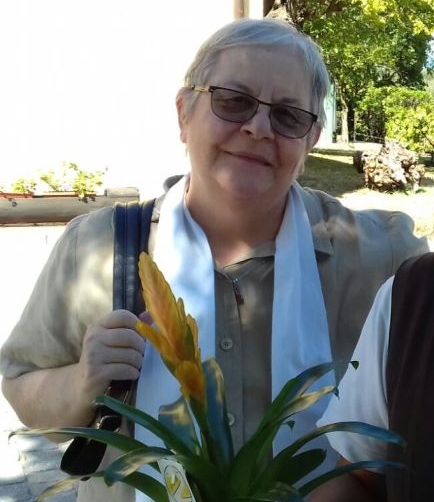
Mar 24, 2017 | Non categorizzato
 At the harshest and most dangerous frontiers, the Consecrated Women are there. Danger doesn’t stop them from even risking their lives, trusting only in the Spouse of their soul. The annual retreat of Women Religious from several congregations who find strength in the spirituality of communion that reinforces their consecration to God and gives meaning to their service to the least. Each of them has her own fascinating story to tell which flows from the charism of the religious family she belongs to, says sister Viera from the Franciscan Sisters of the Poor: “At 9 years old, I helped my Dad to build a house, and at 14 I was already working in a winery where ambiguity and vulgarity was the order of the day, which I soon picked up and it became part of my life. Thirsty for justice, I joined an extremist party, but at the age of 22 and tired with it all, I found myself on the third-floor balcony ready to end it all. The only thing that kept me from jumping was the thought of my mother who would have gone into despair. In the days that followed, at the bus stop I met a sister I had never seen before who, sensing my general discomfort, invited me to a meeting of young people from the Focolare. I went because I wanted to get over the idea of suicide that continued to torment me. Listening to their experiences of living the Gospel, I thought they were all crazy, that they were just wasting their time. But that evening I felt a happiness I had never experienced before. God was taking me by the hand and showing me who He really is: Love. At work – not without a bit of difficulty – I began to put the commandment of mutual love into practice, to use softer tones and to show attention to the older workers, to smile more. Through the meetings with the Focolare youth and with Cristina – the sister who had first spoken to me – I felt drawn to a more serious walk with God. After a course of formation, I left home and work to enter the Franciscan Sisters of the Poor, a congregation that serves the poorest of the poor, including girls living on the streets who are heading for prostitution, jails, and so on. I’ve been working for 23 years in jail ministry, in contact with detainees, regardless of their beliefs and cultures, at the Rebibbia Jail in Rome, [Italy]. Recently I’ve also begun work in Pistoia, [Italy]. I only go to listen to them, without expecting anything. I put myself at their service to make telephone calls to their relatives, to lawyers … I bring them everything they need to write letters. I work with the teachers, checking with them especially when there are problems. Every time I step into one of those environments I think of Jesus’s words to the Pharisees who wanted to stone the woman caught in adultery: ‘Let the one who is without sin cast the first stone.’ Living the mercy of God firsthand, I try to possess a deep sense of acceptance towards each one of them, just as they are, with total trust. The only one to judge is God, a God who loves everyone. Often the trust becomes mutual and then they feel urged to talk about their lives, their dramas, their difficulties living together, the suffering of being deprived of even the most basic needs. This attitude of making ourselves one, which Chiara Lubich taught to us, is the golden key that allows me to build a peaceful and respectful dialogue with everyone. In Pistoia there are around 200 detainees between young people and adults, with more so-called Minors who have committed serious crimes. At first it was hard for me to face them because, in Rebibbia I only met with women. But then I saw that ‘there is neither woman nor man’ as Saint Paul says – and that everyone is a candidate for unity. I go to visit them three or four times a week. We chat in the chapel right in front of Eucharistic Jesus, and generally all of them tell me that they want our little chats to continue and that they look forward to my return. They tell me about their anguish, their fears – feelings that I try to alleviate by reminding them that each one of us is the very focal point of God’s love. Some of them tell me about their return to God, as a detainee from Rebibbia recently wrote to me: ‘I’d like to make up for all the time I threw away. I hope that life gives me a second chance to save myself and my family, to show that I matter too, that I can also do something good. Dearest Sr Viera, I hope that you will allow me to continue to have your friendship. I thank God that he made me meet you.’
At the harshest and most dangerous frontiers, the Consecrated Women are there. Danger doesn’t stop them from even risking their lives, trusting only in the Spouse of their soul. The annual retreat of Women Religious from several congregations who find strength in the spirituality of communion that reinforces their consecration to God and gives meaning to their service to the least. Each of them has her own fascinating story to tell which flows from the charism of the religious family she belongs to, says sister Viera from the Franciscan Sisters of the Poor: “At 9 years old, I helped my Dad to build a house, and at 14 I was already working in a winery where ambiguity and vulgarity was the order of the day, which I soon picked up and it became part of my life. Thirsty for justice, I joined an extremist party, but at the age of 22 and tired with it all, I found myself on the third-floor balcony ready to end it all. The only thing that kept me from jumping was the thought of my mother who would have gone into despair. In the days that followed, at the bus stop I met a sister I had never seen before who, sensing my general discomfort, invited me to a meeting of young people from the Focolare. I went because I wanted to get over the idea of suicide that continued to torment me. Listening to their experiences of living the Gospel, I thought they were all crazy, that they were just wasting their time. But that evening I felt a happiness I had never experienced before. God was taking me by the hand and showing me who He really is: Love. At work – not without a bit of difficulty – I began to put the commandment of mutual love into practice, to use softer tones and to show attention to the older workers, to smile more. Through the meetings with the Focolare youth and with Cristina – the sister who had first spoken to me – I felt drawn to a more serious walk with God. After a course of formation, I left home and work to enter the Franciscan Sisters of the Poor, a congregation that serves the poorest of the poor, including girls living on the streets who are heading for prostitution, jails, and so on. I’ve been working for 23 years in jail ministry, in contact with detainees, regardless of their beliefs and cultures, at the Rebibbia Jail in Rome, [Italy]. Recently I’ve also begun work in Pistoia, [Italy]. I only go to listen to them, without expecting anything. I put myself at their service to make telephone calls to their relatives, to lawyers … I bring them everything they need to write letters. I work with the teachers, checking with them especially when there are problems. Every time I step into one of those environments I think of Jesus’s words to the Pharisees who wanted to stone the woman caught in adultery: ‘Let the one who is without sin cast the first stone.’ Living the mercy of God firsthand, I try to possess a deep sense of acceptance towards each one of them, just as they are, with total trust. The only one to judge is God, a God who loves everyone. Often the trust becomes mutual and then they feel urged to talk about their lives, their dramas, their difficulties living together, the suffering of being deprived of even the most basic needs. This attitude of making ourselves one, which Chiara Lubich taught to us, is the golden key that allows me to build a peaceful and respectful dialogue with everyone. In Pistoia there are around 200 detainees between young people and adults, with more so-called Minors who have committed serious crimes. At first it was hard for me to face them because, in Rebibbia I only met with women. But then I saw that ‘there is neither woman nor man’ as Saint Paul says – and that everyone is a candidate for unity. I go to visit them three or four times a week. We chat in the chapel right in front of Eucharistic Jesus, and generally all of them tell me that they want our little chats to continue and that they look forward to my return. They tell me about their anguish, their fears – feelings that I try to alleviate by reminding them that each one of us is the very focal point of God’s love. Some of them tell me about their return to God, as a detainee from Rebibbia recently wrote to me: ‘I’d like to make up for all the time I threw away. I hope that life gives me a second chance to save myself and my family, to show that I matter too, that I can also do something good. Dearest Sr Viera, I hope that you will allow me to continue to have your friendship. I thank God that he made me meet you.’
Mar 23, 2017 | Non categorizzato
Mar 22, 2017 | Senza categoria
STREAMING by Česká Televize – Cardinal Dominik Duka OP, Archbishop of Prague, relatives and friends of the Focolare Movement, announce that the funeral of Cardinal Miloslav Vlk will be held Saturday, March 25, at 11.00 am, in the Cathedral of Saints Vitus, Wenceslaus and Adalbert in Prague. He will be buried in the Archbishops’ tomb in the Cathedral. Miloslav Vlk, Archbishop Emeritus of Prague and Primate Emeritus of Bohemia, is the 62nd successor of Saint Adalbert and in the 35th Archbishop of Prague.
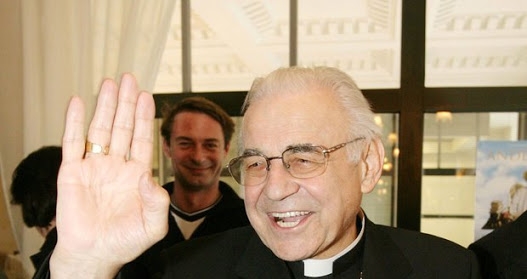
Mar 21, 2017 | Non categorizzato
 “A precious gift,” a “strong witness of the Charism of unity,” and “a Word really lived,” was how Maria Voce, President of the Focolare Movement spoke of Cardinal Miloslav Vlk, who passed away on Saturday, 16 March in Prague. In a communication to all the members of the Movement, Maria Voce highlighted the “edifying” way in which Vlk lived the last period of his life, marked by a great weakening but at the same time by “a continuous attitude of gratitude to God for the gifts he had received from Him.” She underlined the “very deep bond” the Cardinal had with the Focolare Movement “since the start of his clandestine ministry in the time when Czechoslovakia was under the communist regime.” She expressed immense gratitude for his commitment and devotion with which for 18 years, he carried out his role as moderator of the group of Bishops who declare themselves “friends of the Movement,” activities he followed with great interest and participation even from the hospital. Maria Voce denoted that Cardinal Miloslav was “surrounded by prayers of the Diocesan community, members of the Movement, friends of other Christian denominations, and both Jews and Muslims with whom he had undertaken years of dialogue.” She also cited the “many testimonials of his example of humility, communion and evangelical wisdom, which underlined the way he made himself simply a “brother” to all, and also his authority as a “father” who was able to give enthusiasm and motivate those around him.” “We have a great heritage before us,” Maria Voce concluded, and it is “A heritage to treasure and discover more deeply.”
“A precious gift,” a “strong witness of the Charism of unity,” and “a Word really lived,” was how Maria Voce, President of the Focolare Movement spoke of Cardinal Miloslav Vlk, who passed away on Saturday, 16 March in Prague. In a communication to all the members of the Movement, Maria Voce highlighted the “edifying” way in which Vlk lived the last period of his life, marked by a great weakening but at the same time by “a continuous attitude of gratitude to God for the gifts he had received from Him.” She underlined the “very deep bond” the Cardinal had with the Focolare Movement “since the start of his clandestine ministry in the time when Czechoslovakia was under the communist regime.” She expressed immense gratitude for his commitment and devotion with which for 18 years, he carried out his role as moderator of the group of Bishops who declare themselves “friends of the Movement,” activities he followed with great interest and participation even from the hospital. Maria Voce denoted that Cardinal Miloslav was “surrounded by prayers of the Diocesan community, members of the Movement, friends of other Christian denominations, and both Jews and Muslims with whom he had undertaken years of dialogue.” She also cited the “many testimonials of his example of humility, communion and evangelical wisdom, which underlined the way he made himself simply a “brother” to all, and also his authority as a “father” who was able to give enthusiasm and motivate those around him.” “We have a great heritage before us,” Maria Voce concluded, and it is “A heritage to treasure and discover more deeply.”
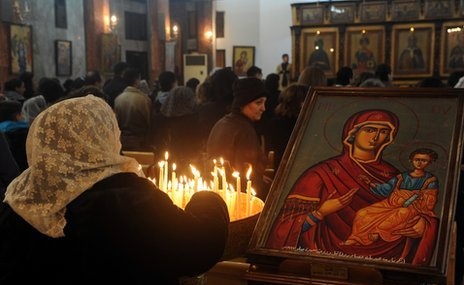
Mar 21, 2017 | Non categorizzato
 For more than 25 years I have been in constant contact with Fr. Nabil, a Catholic- Melchite priest of Syria, married and father of five. We met as seminarians during a meeting of the Focolare Movement . Since the start of the terrible war in Syria, it comes spontaneously to live the situation together. There are so many people praying for the people in Syria, invoking peace! Thus a spiritual communion was born, uniting also the two parish communities, his in Syria and ours in Switzerland. When his two older daughters couldn’t continue their studies in Syria, our community in Basel welcomed them. Last summer, since I had to change parish, I was able to take some time off to visit them. So the 40 days in Syria began! I arrived in Beirut at 3:00 in the morning, where Fr. Nabil welcomed me at the airport. With a car full of people and luggage we headed for Syria. At the border we were warmly welcomed by the office director. While the car and documents were being checked, we were his guests. Then we continued our journey, along secondary streets – since the main ones were closed – passing through numerous checkpoints until we reached Fr. Nabil’s town, five km away from the city of Hama. We were accommodated in various houses and experienced a warm and joyful welcome. I discovered a lively community. Every evening in the parish, over 200 children and young people took turns to meet us. All in all, more than 900 people passed some hours together. It is a daily celebration. The 70 youths in charge are strongly committed despite the fact that they go to school or the university, or are studying for their exams. As days passed I started to understand that this busy life is lived against a background of tearing pain. I discovered that the noise they hear daily come from the air raids. I found out that the stations of the “rebels” are just a few kilometers away, and that a week earlier, even a Christian village 12 km away had been attacked, with the death of many people. Various families can no longer buy the necessary living commodities. At night all is dark, and there are only LED lights with batteries. In many homes I saw photos of their sons who have died in the war. Almost none of the families is intact because over 3,000 youths have left the country. One day during a funeral, two grenades exploded and killed two people. I asked myself: where do these people find the strength not to despair? The fact is that for several years now, a great community has developed, and draws inspiration from the Spirituality of unity. There are over 200 people organised in small groups, who nurture themselves with the Word of God and take care of the disadvantaged people and children. They have set up a small social centre which assists people with serious diseases and provide with the help of the solidarity of their fellow citizens and international friends, for the medicines and treatments. They regularly visit up to 450 families to support them in their serious needs. Even the relationships between the various religious groups are well taken care of. And so we were invited, along with the other priests of the city, for the Ramadan dinner with more than 200 Imams of the City of Hama. Over the last week I had the chance to participate in the Mariapolis. There were over 200 people from various cities and regions of the country: Damascus, Homs, Hama, Aleppo and Latakia. For the first time since the start of the war, they could risk travelling and meeting one another. All have suffered immensely and lost their homes, jobs and even beloved relatives. But they have not lost their faith and love. (Ruedi Beck) Source: Gens magazine January – March 2017, p. 38-40
For more than 25 years I have been in constant contact with Fr. Nabil, a Catholic- Melchite priest of Syria, married and father of five. We met as seminarians during a meeting of the Focolare Movement . Since the start of the terrible war in Syria, it comes spontaneously to live the situation together. There are so many people praying for the people in Syria, invoking peace! Thus a spiritual communion was born, uniting also the two parish communities, his in Syria and ours in Switzerland. When his two older daughters couldn’t continue their studies in Syria, our community in Basel welcomed them. Last summer, since I had to change parish, I was able to take some time off to visit them. So the 40 days in Syria began! I arrived in Beirut at 3:00 in the morning, where Fr. Nabil welcomed me at the airport. With a car full of people and luggage we headed for Syria. At the border we were warmly welcomed by the office director. While the car and documents were being checked, we were his guests. Then we continued our journey, along secondary streets – since the main ones were closed – passing through numerous checkpoints until we reached Fr. Nabil’s town, five km away from the city of Hama. We were accommodated in various houses and experienced a warm and joyful welcome. I discovered a lively community. Every evening in the parish, over 200 children and young people took turns to meet us. All in all, more than 900 people passed some hours together. It is a daily celebration. The 70 youths in charge are strongly committed despite the fact that they go to school or the university, or are studying for their exams. As days passed I started to understand that this busy life is lived against a background of tearing pain. I discovered that the noise they hear daily come from the air raids. I found out that the stations of the “rebels” are just a few kilometers away, and that a week earlier, even a Christian village 12 km away had been attacked, with the death of many people. Various families can no longer buy the necessary living commodities. At night all is dark, and there are only LED lights with batteries. In many homes I saw photos of their sons who have died in the war. Almost none of the families is intact because over 3,000 youths have left the country. One day during a funeral, two grenades exploded and killed two people. I asked myself: where do these people find the strength not to despair? The fact is that for several years now, a great community has developed, and draws inspiration from the Spirituality of unity. There are over 200 people organised in small groups, who nurture themselves with the Word of God and take care of the disadvantaged people and children. They have set up a small social centre which assists people with serious diseases and provide with the help of the solidarity of their fellow citizens and international friends, for the medicines and treatments. They regularly visit up to 450 families to support them in their serious needs. Even the relationships between the various religious groups are well taken care of. And so we were invited, along with the other priests of the city, for the Ramadan dinner with more than 200 Imams of the City of Hama. Over the last week I had the chance to participate in the Mariapolis. There were over 200 people from various cities and regions of the country: Damascus, Homs, Hama, Aleppo and Latakia. For the first time since the start of the war, they could risk travelling and meeting one another. All have suffered immensely and lost their homes, jobs and even beloved relatives. But they have not lost their faith and love. (Ruedi Beck) Source: Gens magazine January – March 2017, p. 38-40
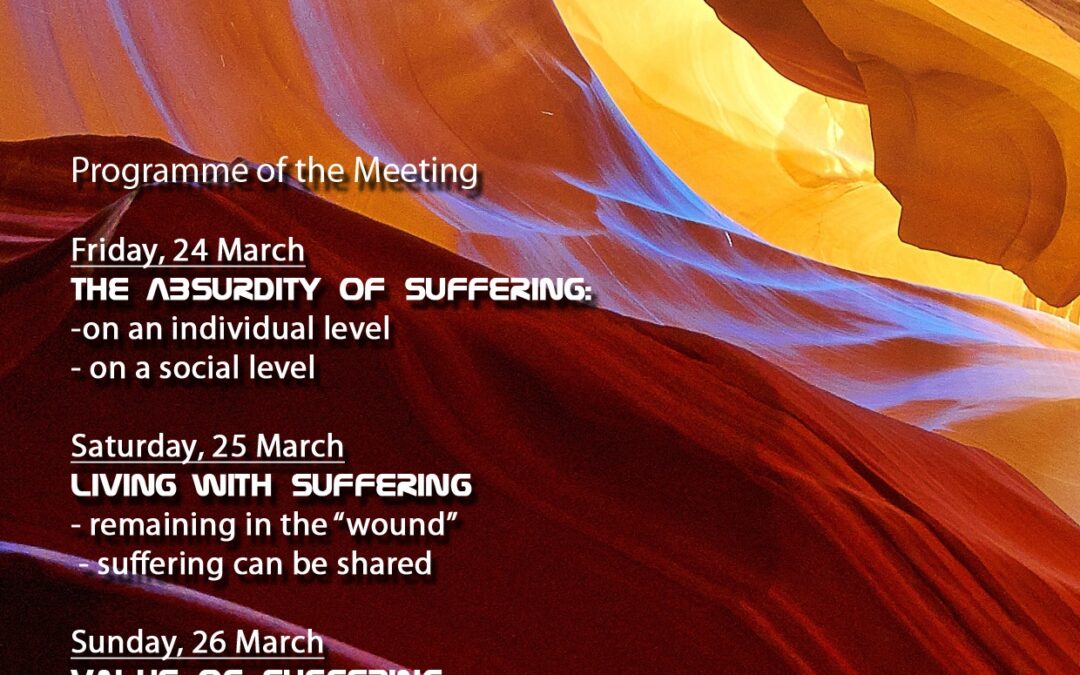
Mar 20, 2017 | Non categorizzato
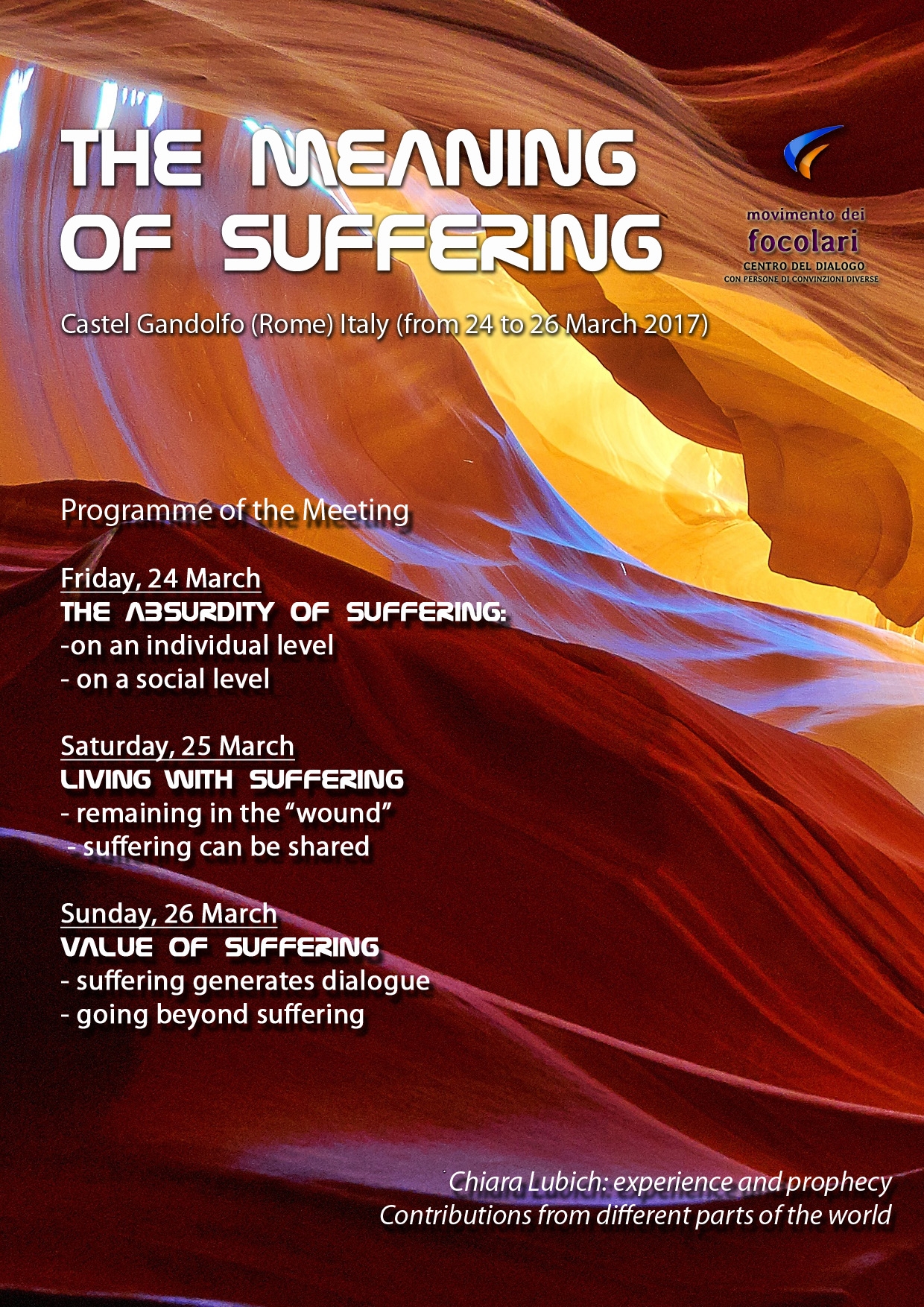 Agnese Fermo is a mathematics professor from Milan, Italy; she is married and has two children. She is also a member of the International Commission of the Centre for Dialogue with people of the Focolare that have no religious affiliation. We asked her to tell about her experience of the past several years engaged in this open dialogue and to present the upcoming conference titled “Is there meaning in suffering?” “I attended the international gatherings on this dialogue at Castel Gandolfo and other gatherings where we went deeper into the spirituality of the Movement. Right from the start we perceived the importance – for each one of us – of this communitarian experience that Chiara Lubich was offering to us. Dialogue, besides being an expression of the gift of diversity, was also a tool that enriched our thinking. I’ve belonged to the “dialogue group” in Milan for about 15 years. The need and desire that each of us had for dialogue made us feel that we were necessarily part of the human experience of a whole sector of humankind, and carriers of part of the truth through the relationships that we were building. But this experience couldn’t remain enclosed in a group: it was the trace of a path for each one of us to follow, besides for the Movement itself. We felt like we had to step out of structured groups, especially after Chiara left us. In Milan this has taken place, but with the many people with whom we’ve shared this experience – both members and non-members of the Movement – the relationship has remained deep and real. Regarding the upcoming conference titled Is there meaning in suffering? I believe I can say that we haven’t fixed any particular goal. I think this is because of the need we feel to give space to dialogue, not so much in the sense of comparing thoughts on the theme itself (there’s a lot of literature on this topic! And it’s often avoided as a topic). Rather, we’d like to create a space in which we can welcome people that have such a different religious sense towards life, a space capable of giving enough breathing room to this other portion of humanity that we represent, we who have different religious convictions. But there is also the desire to offer a communitarian experience, even if only for three days, to live within a dimension of mutual freedom beyond affiliation, in which each one of us can offer their our experience and innermost feelings on such a delicate topic as suffering. Personally, I wouldn’t know what the meaning of suffering is. I haven’t found an answer that has been able to express the mystery contained in that question. As I wonder about it whenever I visit the women’s prison, made me discover the value of my presence in that place as a time of sharing made up of mere moments, of the solitude that marks the pain of those women that I encounter. From them I’ve receive precious gifts and discovered the value of the embrace that that sharing contains which, although brief in time, brings to life our being [gifts] for each other. Knowing how to ‘stay inside the wound’ – which for me, means to say, being called to accept whatever life has in store for me in that moment – there’s submission in front of what you can’t avoid, [submission] to the suffering that we’re all asked to go through.”
Agnese Fermo is a mathematics professor from Milan, Italy; she is married and has two children. She is also a member of the International Commission of the Centre for Dialogue with people of the Focolare that have no religious affiliation. We asked her to tell about her experience of the past several years engaged in this open dialogue and to present the upcoming conference titled “Is there meaning in suffering?” “I attended the international gatherings on this dialogue at Castel Gandolfo and other gatherings where we went deeper into the spirituality of the Movement. Right from the start we perceived the importance – for each one of us – of this communitarian experience that Chiara Lubich was offering to us. Dialogue, besides being an expression of the gift of diversity, was also a tool that enriched our thinking. I’ve belonged to the “dialogue group” in Milan for about 15 years. The need and desire that each of us had for dialogue made us feel that we were necessarily part of the human experience of a whole sector of humankind, and carriers of part of the truth through the relationships that we were building. But this experience couldn’t remain enclosed in a group: it was the trace of a path for each one of us to follow, besides for the Movement itself. We felt like we had to step out of structured groups, especially after Chiara left us. In Milan this has taken place, but with the many people with whom we’ve shared this experience – both members and non-members of the Movement – the relationship has remained deep and real. Regarding the upcoming conference titled Is there meaning in suffering? I believe I can say that we haven’t fixed any particular goal. I think this is because of the need we feel to give space to dialogue, not so much in the sense of comparing thoughts on the theme itself (there’s a lot of literature on this topic! And it’s often avoided as a topic). Rather, we’d like to create a space in which we can welcome people that have such a different religious sense towards life, a space capable of giving enough breathing room to this other portion of humanity that we represent, we who have different religious convictions. But there is also the desire to offer a communitarian experience, even if only for three days, to live within a dimension of mutual freedom beyond affiliation, in which each one of us can offer their our experience and innermost feelings on such a delicate topic as suffering. Personally, I wouldn’t know what the meaning of suffering is. I haven’t found an answer that has been able to express the mystery contained in that question. As I wonder about it whenever I visit the women’s prison, made me discover the value of my presence in that place as a time of sharing made up of mere moments, of the solitude that marks the pain of those women that I encounter. From them I’ve receive precious gifts and discovered the value of the embrace that that sharing contains which, although brief in time, brings to life our being [gifts] for each other. Knowing how to ‘stay inside the wound’ – which for me, means to say, being called to accept whatever life has in store for me in that moment – there’s submission in front of what you can’t avoid, [submission] to the suffering that we’re all asked to go through.”
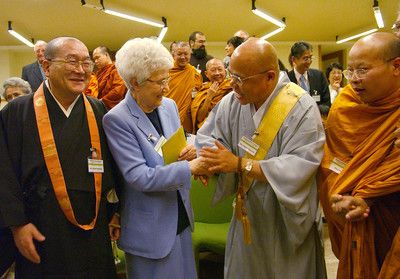
Mar 19, 2017 | Non categorizzato
 The founder of the Focolare Movement died at Rocca di Papa on the 14th March 2008 at the age of 88 after a long illness. In the telegram of condolence sent by Pope Benedict XVI, he mentioned “her constant commitment for communion in the Church for ecumenical dialogue and brotherhood among all peoples”. He also thanked the Lord “for the witness of a life spent hearing the needs of people today” and expressed the wish “that all those who knew her and follow in her footsteps should keep the flame of the charism alive”. Chiara Lubich’s charism focuses on unity in the human family. It would be a dream if it were not founded on firm faith in the love of God the Father for his children, and on the words of Jesus, “May they all be one”. This charism has much to say to the world today as Maria Voce said to Adriana Masotti. A. – Yes, indeed. It almost has more to say today than when Chiara first proclaimed it. At the time, there was of course the tragedy of war and many painful situations, but there was not the disunity that seems to be spreading so much in the world today. This disunity cries out for the lifestyle brought by the charism of unity God gave to Chiara. We are discovering its relevance more and more. Q. – One of the definitions made of Chiara Lubich was a “woman of dialogue” and dialogue is a subject talked much about in many places today. However, often it does not happen or people do not know how to do it. What did dialogue mean to Chiara and how does the Focolare Movement practice this dialogue? A. – Dialogue was a lifestyle for Chiara, which meant considering every person she met as a brother or sister. Chiara did not want to dialogue; she wanted to love people who were her brothers and sisters; and that is why she was so happy to meet people. She shared what was in her soul and then these brothers and sisters spontaneously responded with the same openness. That is how dialogue began. It is the same for us today; we try to have this attitude towards whomever we meet. We try to do as Chiara did, to be always open, without looking at differences and distinctiveness of any kind except as a way to create an enriching encounter, because it is a meeting with a brother or sister who has something to give us, whatever their ethnicity or religious faith, whatever their social background or age. Q. – So the Movement is convinced that dialogue is the best tool to resolve the many conflicts in the world today. A. – Of course! There is no other way. Why? Because dialogue is love, and if dialogue is love it can truly change the state of the world. It can bring peace to places at war. D. – At the beginning of her spiritual experience, Chiara was strongly aware of humanity’s cry of suffering and she decided to take on and bear this suffering herself. What does the Movement Chiara founded do with regard to the many divisions the world is experiencing at present? R. – The Movement wants to have the same faith as Chiara, a faith based on the cry of Jesus forsaken. Chiara certainly understood that cry as the moment when the Son of God suffered the most, but it was also when He loved us the most. Precisely because he loved us the most, in that moment he re-established the unity that was broken between God and humankind and among people. Therefore, there is no other way of reaching unity than by passing through suffering. However, this suffering is filled with love because it is part of giving one’s life for others. So, considering all the sufferings of the world today, whether at a personal level or at the level of society, peoples or nations, the Movement tries to recognize His countenance in these, to see in them a God who died. But He is also a God who rose again and who can therefore rise above all these sufferings. D. – This translates into many practical activities … R. – Precisely. Perhaps they start with a simple act of love by a family who saw that another family was experiencing a similar difficult situation, and who took upon themselves the difficulties of another family with a disabled child. This created a network of solidarity among many families and involved the local town council. They realized that by loving the countenance of Jesus forsaken in that suffering, something changed. This is what we see. Wherever we are, in places where there is war, our people try to love enemies as well as friends. Goods are shared among all the families without looking to see which ethnic group or religion they belong to… We see this continually in many relationships that change and we see new communities building up that are connected among themselves and spreading more and more. Source: Vatican Radio
The founder of the Focolare Movement died at Rocca di Papa on the 14th March 2008 at the age of 88 after a long illness. In the telegram of condolence sent by Pope Benedict XVI, he mentioned “her constant commitment for communion in the Church for ecumenical dialogue and brotherhood among all peoples”. He also thanked the Lord “for the witness of a life spent hearing the needs of people today” and expressed the wish “that all those who knew her and follow in her footsteps should keep the flame of the charism alive”. Chiara Lubich’s charism focuses on unity in the human family. It would be a dream if it were not founded on firm faith in the love of God the Father for his children, and on the words of Jesus, “May they all be one”. This charism has much to say to the world today as Maria Voce said to Adriana Masotti. A. – Yes, indeed. It almost has more to say today than when Chiara first proclaimed it. At the time, there was of course the tragedy of war and many painful situations, but there was not the disunity that seems to be spreading so much in the world today. This disunity cries out for the lifestyle brought by the charism of unity God gave to Chiara. We are discovering its relevance more and more. Q. – One of the definitions made of Chiara Lubich was a “woman of dialogue” and dialogue is a subject talked much about in many places today. However, often it does not happen or people do not know how to do it. What did dialogue mean to Chiara and how does the Focolare Movement practice this dialogue? A. – Dialogue was a lifestyle for Chiara, which meant considering every person she met as a brother or sister. Chiara did not want to dialogue; she wanted to love people who were her brothers and sisters; and that is why she was so happy to meet people. She shared what was in her soul and then these brothers and sisters spontaneously responded with the same openness. That is how dialogue began. It is the same for us today; we try to have this attitude towards whomever we meet. We try to do as Chiara did, to be always open, without looking at differences and distinctiveness of any kind except as a way to create an enriching encounter, because it is a meeting with a brother or sister who has something to give us, whatever their ethnicity or religious faith, whatever their social background or age. Q. – So the Movement is convinced that dialogue is the best tool to resolve the many conflicts in the world today. A. – Of course! There is no other way. Why? Because dialogue is love, and if dialogue is love it can truly change the state of the world. It can bring peace to places at war. D. – At the beginning of her spiritual experience, Chiara was strongly aware of humanity’s cry of suffering and she decided to take on and bear this suffering herself. What does the Movement Chiara founded do with regard to the many divisions the world is experiencing at present? R. – The Movement wants to have the same faith as Chiara, a faith based on the cry of Jesus forsaken. Chiara certainly understood that cry as the moment when the Son of God suffered the most, but it was also when He loved us the most. Precisely because he loved us the most, in that moment he re-established the unity that was broken between God and humankind and among people. Therefore, there is no other way of reaching unity than by passing through suffering. However, this suffering is filled with love because it is part of giving one’s life for others. So, considering all the sufferings of the world today, whether at a personal level or at the level of society, peoples or nations, the Movement tries to recognize His countenance in these, to see in them a God who died. But He is also a God who rose again and who can therefore rise above all these sufferings. D. – This translates into many practical activities … R. – Precisely. Perhaps they start with a simple act of love by a family who saw that another family was experiencing a similar difficult situation, and who took upon themselves the difficulties of another family with a disabled child. This created a network of solidarity among many families and involved the local town council. They realized that by loving the countenance of Jesus forsaken in that suffering, something changed. This is what we see. Wherever we are, in places where there is war, our people try to love enemies as well as friends. Goods are shared among all the families without looking to see which ethnic group or religion they belong to… We see this continually in many relationships that change and we see new communities building up that are connected among themselves and spreading more and more. Source: Vatican Radio
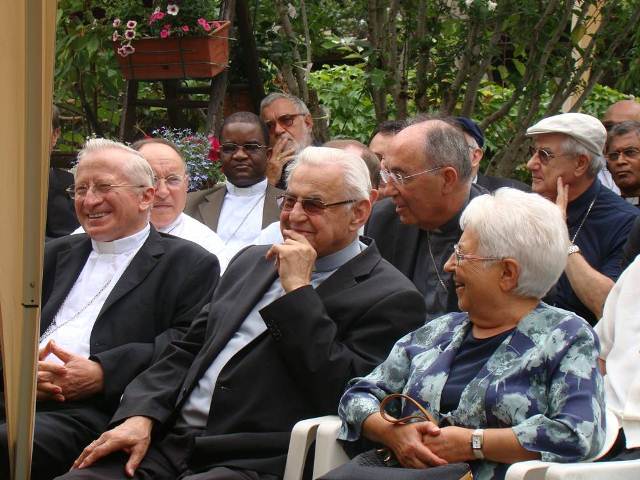
Mar 18, 2017 | Focolare Worldwide
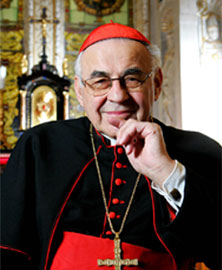 As a child, he dreamt of being a pilot, but an attraction to the priesthood stuck with him from the time he was eleven. He was born on May 17, 1932 in Lisnice, the Province of Pisek in Southern Bohemia. From 1952 to 1953 he was a worker. In 1960, following his graduation, he worked as an archivist but soon abandoned that occupation to study theology. In 1968 he was ordained to the priesthood. During a visit to East Germany in the 1960s, he met a layman and some priests who were living the spirituality of the Focolare Movement. He was taken by the presence of Jesus among this group of Christians, a presence that He promises when two or more are united in His name (see Mt 18:20). That experience of communion would accompany him for the rest of his life. His pastoral work in Ceské Budejovice annoyed the Communist State system, and in 1971 he was transferred to a parish in Selva Boema. Seven years later, because of his popularity especially among young people, his permission to carry out his priestly ministry was revoked. “I lost my license. I can’t say mass anymore,” he explained to his parishioners. “I preached and talked about the cross and recommended that we carry it; now is the moment for me to carry it.” Officially returned to the lay state, Chiara Lubich accepted his request to enter the focolare in Prague that was opened in 1981. He found a job as a window-washer that lasted for 10 years. He would often say: “I can’t preach or share the sacraments in public, but when I look at the cross I realize that Jesus who is the one and only High Priest could hardly even talk when he was on the cross, and his hands were nailed in. I became convinced: ‘Now, you’re close to the High Priest’ and I embraced Jesus Forsaken. It was the spirituality of the Focolare that guided me in this direction. I felt the power of which Isaiah 53 speaks: ‘The man of suffering’ (…) I lived for a long time of this light: everything that was ugly could serve for my edification. I realized, without exaggerating, that those ten years of washing windows had been the most blessed years of my life.” He would often repeat: “I hold it to be a miracle that God spread the spirituality of unity in the Socialist world where everything was under surveillance. He always knows the ways in.”
As a child, he dreamt of being a pilot, but an attraction to the priesthood stuck with him from the time he was eleven. He was born on May 17, 1932 in Lisnice, the Province of Pisek in Southern Bohemia. From 1952 to 1953 he was a worker. In 1960, following his graduation, he worked as an archivist but soon abandoned that occupation to study theology. In 1968 he was ordained to the priesthood. During a visit to East Germany in the 1960s, he met a layman and some priests who were living the spirituality of the Focolare Movement. He was taken by the presence of Jesus among this group of Christians, a presence that He promises when two or more are united in His name (see Mt 18:20). That experience of communion would accompany him for the rest of his life. His pastoral work in Ceské Budejovice annoyed the Communist State system, and in 1971 he was transferred to a parish in Selva Boema. Seven years later, because of his popularity especially among young people, his permission to carry out his priestly ministry was revoked. “I lost my license. I can’t say mass anymore,” he explained to his parishioners. “I preached and talked about the cross and recommended that we carry it; now is the moment for me to carry it.” Officially returned to the lay state, Chiara Lubich accepted his request to enter the focolare in Prague that was opened in 1981. He found a job as a window-washer that lasted for 10 years. He would often say: “I can’t preach or share the sacraments in public, but when I look at the cross I realize that Jesus who is the one and only High Priest could hardly even talk when he was on the cross, and his hands were nailed in. I became convinced: ‘Now, you’re close to the High Priest’ and I embraced Jesus Forsaken. It was the spirituality of the Focolare that guided me in this direction. I felt the power of which Isaiah 53 speaks: ‘The man of suffering’ (…) I lived for a long time of this light: everything that was ugly could serve for my edification. I realized, without exaggerating, that those ten years of washing windows had been the most blessed years of my life.” He would often repeat: “I hold it to be a miracle that God spread the spirituality of unity in the Socialist world where everything was under surveillance. He always knows the ways in.” 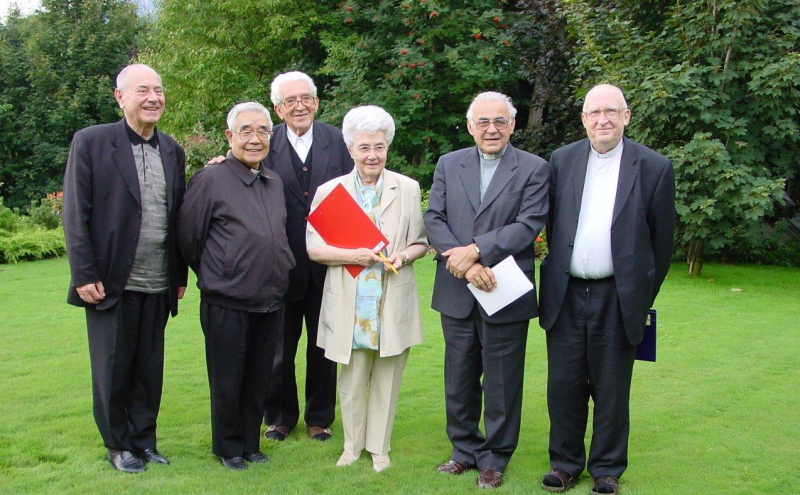 With the Velvet Revolution in 1989 he became pastor again. In 1990 he was named bishop of Ceské Budejovice and, in the following years, Archbishop of Prague. From 1992 to 2000 he guided the Czech Bishops Conference and from 1993-2001 becamse President of the Council of the Bishops Conferences of Europe. On November 26, 1994, he was created cardinal. Following the death of Bishop Klaus Hemmerle in January 1994, who began the branch of the Bishop Friends of the Focolare Movement, the foundress invited Archbishop of Prague to assume the role as moderator of that branch of the Movement. He succeded Bishop Hemmerle who had been a great theologian and charismatic figure. It seemed too demanding to him, but Chiara Lubich assured him: “Don’t be afraid, Your Emminance, you won’t be alone. You’ll go ahead as a body.” The cardinal carried out this task for 18 years, convoking and supporting numerous international meetings of bishops from both the Catholic and other Churches, which were held in Castel Gandolfo, Italy, Istanbul, Jerusalem, Beirut, Augsburg, Wittenburg, London, Geneva, El Cairo, just to name a few.
With the Velvet Revolution in 1989 he became pastor again. In 1990 he was named bishop of Ceské Budejovice and, in the following years, Archbishop of Prague. From 1992 to 2000 he guided the Czech Bishops Conference and from 1993-2001 becamse President of the Council of the Bishops Conferences of Europe. On November 26, 1994, he was created cardinal. Following the death of Bishop Klaus Hemmerle in January 1994, who began the branch of the Bishop Friends of the Focolare Movement, the foundress invited Archbishop of Prague to assume the role as moderator of that branch of the Movement. He succeded Bishop Hemmerle who had been a great theologian and charismatic figure. It seemed too demanding to him, but Chiara Lubich assured him: “Don’t be afraid, Your Emminance, you won’t be alone. You’ll go ahead as a body.” The cardinal carried out this task for 18 years, convoking and supporting numerous international meetings of bishops from both the Catholic and other Churches, which were held in Castel Gandolfo, Italy, Istanbul, Jerusalem, Beirut, Augsburg, Wittenburg, London, Geneva, El Cairo, just to name a few.  The membership of the Bishops in the Work of Mary is entirely spiritual and does not interfere in any way with their duties as bishops, as established by the Church. They find that the spirituality of unity is “in profound harmony with the episcopal charism. It reinforces the effective and affective collegiality and unity with the Holy Father, among the bishops, and helps them to actualize the teachings of the Second Vatican Council on the Church-Communion.” This is written in their rule of life for the “Bishop Friends of the Movement” which was recognized by John Paul II and approved by the Pontifical Council of the Laity in a letter dated February 14, 1998. Also the heads of several other Christian Church’s have expressed their appreciation for this initiative. See also: News.va – Telegram of condolences for the death of Cardinal Miloslav Vlk
The membership of the Bishops in the Work of Mary is entirely spiritual and does not interfere in any way with their duties as bishops, as established by the Church. They find that the spirituality of unity is “in profound harmony with the episcopal charism. It reinforces the effective and affective collegiality and unity with the Holy Father, among the bishops, and helps them to actualize the teachings of the Second Vatican Council on the Church-Communion.” This is written in their rule of life for the “Bishop Friends of the Movement” which was recognized by John Paul II and approved by the Pontifical Council of the Laity in a letter dated February 14, 1998. Also the heads of several other Christian Church’s have expressed their appreciation for this initiative. See also: News.va – Telegram of condolences for the death of Cardinal Miloslav Vlk
Mar 18, 2017 | Non categorizzato
Today, 18 March, Cardinal Miloslav Vlk, Emeritus Archbishop of Prague, passed way. He was 86 years old. For 18 years, he was the moderator of the group of bishops who adhere to the spirituality of unity. The Focolare Movement expresses deep gratitude for his life.

 “Everything that has happened in my life has been a gift from God. My last name means ‘wolf’, and my personality is a bit like one. Yet when I started to live the Gospel in the light of the spirituality of unity, my wolf life finished, and my life as Miloslav, which means ‘gracious,’ began.” Thus began the then archbishop, who continued: “In 1964 I went to the DDR (East Germany) to thank a priest who regularly sent me theology books – there weren’t any where we were. He had learned of the spirituality of unity at Erfurt. He told me how the Focolare Movement began and spoke to me of Jesus Forsaken. To tell the truth, I didn’t understand much. I do remember that he gave me a text by Chiara Lubich.” He later met Natalia Dallapiccola, one of the first focolarine, who had also moved to the DDR. The cardinal was not yet even a seminarian, but would become one shortly. “I had many opportunities to to experience that this spirituality was real,” especially with other seminarians who were hard to deal with. It was with one of these that he actually began to share the ideal of unity. “After I was ordained in 1968, I was appointed secretary for the bishop of České Budějovice, a very deep person.” The bishop, however, found it difficult to accept the liturgical reform that had come with Vatican II. “I found myself judging him, but the focolarini explained to me that I had to love him instead of criticize him. At the time, I experienced that unity was the way to understand things, and to help others understand.” After 1968, communism came to power, and Miloslav, who quite influential with young people, was sent far away to a parish lost in the mountains. “There I started to understand what I had been told about Jesus Forsaken. I placed my situation in God’s hands, just as Jesus on the cross had entrusted himself to the Father. It was my first profound encounter with Jesus Forsaken.”
“Everything that has happened in my life has been a gift from God. My last name means ‘wolf’, and my personality is a bit like one. Yet when I started to live the Gospel in the light of the spirituality of unity, my wolf life finished, and my life as Miloslav, which means ‘gracious,’ began.” Thus began the then archbishop, who continued: “In 1964 I went to the DDR (East Germany) to thank a priest who regularly sent me theology books – there weren’t any where we were. He had learned of the spirituality of unity at Erfurt. He told me how the Focolare Movement began and spoke to me of Jesus Forsaken. To tell the truth, I didn’t understand much. I do remember that he gave me a text by Chiara Lubich.” He later met Natalia Dallapiccola, one of the first focolarine, who had also moved to the DDR. The cardinal was not yet even a seminarian, but would become one shortly. “I had many opportunities to to experience that this spirituality was real,” especially with other seminarians who were hard to deal with. It was with one of these that he actually began to share the ideal of unity. “After I was ordained in 1968, I was appointed secretary for the bishop of České Budějovice, a very deep person.” The bishop, however, found it difficult to accept the liturgical reform that had come with Vatican II. “I found myself judging him, but the focolarini explained to me that I had to love him instead of criticize him. At the time, I experienced that unity was the way to understand things, and to help others understand.” After 1968, communism came to power, and Miloslav, who quite influential with young people, was sent far away to a parish lost in the mountains. “There I started to understand what I had been told about Jesus Forsaken. I placed my situation in God’s hands, just as Jesus on the cross had entrusted himself to the Father. It was my first profound encounter with Jesus Forsaken.” 





 First step: prepare yourself In the morning, as I wake up, I prepare myself by saying: «Today I shall await Him.» I don’t know what the day will bring, but I know that in an unforeseen way, Jesus Forsaken will come to me: in the difficulties, disappointments, perhaps also in my shortcomings, and in bad and painful news. I declare that He will come, and that I am awaiting him. Second step: recognise him During the day, almost always in an unexpected manner, I meet the negativity around me or in me. At these moments it is important to recognize him immediately without hesitation. He, in his abandonment, is already present in every need or fault: in such a way that every pain is “his sacrament” and what matters, within the sign of this pain, is to recognise the countenance of the Crucified and Abandoned, loving and adoring him immediately. Third step: call him by his name Upon meeting him, I am not only aware, but observe and greet him. I call him by his name. Giving a name to every countenance of Jesus Forsaken is a precious exercise and much more than a superficial act. It is no longer “a thing” but a “You.” Precisely in this way, every action of mine becomes contemplation. Fourth step: welcome him warmly Prepare a feast for Jesus Forsaken. By this I mean welcoming him not only hesitatingly, as if it were an inevitable fact, or like welcoming someone who, despite being a friend, drops by at the wrong moment. Furthermore, I don’t want him to sit in the waiting room even for an instant, but will welcome him right away, in the heart of my love and joyful willingness. This is the transition of pain to love, passing through the abandonment in Easter. Only through one who loves in this way will the Forsaken give joy to the world. The feast we prepare for the Forsaken is that feast day which will not see the sunset, because Love never sets.
First step: prepare yourself In the morning, as I wake up, I prepare myself by saying: «Today I shall await Him.» I don’t know what the day will bring, but I know that in an unforeseen way, Jesus Forsaken will come to me: in the difficulties, disappointments, perhaps also in my shortcomings, and in bad and painful news. I declare that He will come, and that I am awaiting him. Second step: recognise him During the day, almost always in an unexpected manner, I meet the negativity around me or in me. At these moments it is important to recognize him immediately without hesitation. He, in his abandonment, is already present in every need or fault: in such a way that every pain is “his sacrament” and what matters, within the sign of this pain, is to recognise the countenance of the Crucified and Abandoned, loving and adoring him immediately. Third step: call him by his name Upon meeting him, I am not only aware, but observe and greet him. I call him by his name. Giving a name to every countenance of Jesus Forsaken is a precious exercise and much more than a superficial act. It is no longer “a thing” but a “You.” Precisely in this way, every action of mine becomes contemplation. Fourth step: welcome him warmly Prepare a feast for Jesus Forsaken. By this I mean welcoming him not only hesitatingly, as if it were an inevitable fact, or like welcoming someone who, despite being a friend, drops by at the wrong moment. Furthermore, I don’t want him to sit in the waiting room even for an instant, but will welcome him right away, in the heart of my love and joyful willingness. This is the transition of pain to love, passing through the abandonment in Easter. Only through one who loves in this way will the Forsaken give joy to the world. The feast we prepare for the Forsaken is that feast day which will not see the sunset, because Love never sets. 
 Who trains the trainers? Who, and especially how, accompanies seminarians and priests on their discreet mission and pastoral training? How can we support priests, deacons and seminarians to be, as
Who trains the trainers? Who, and especially how, accompanies seminarians and priests on their discreet mission and pastoral training? How can we support priests, deacons and seminarians to be, as 






 In the man Jesus there is participation in the very life of the Trinity, in the social life of God. This supernatural social life, which the life of grace brings to man, never destroys his natural life. There is instead a marvelous interweaving of the two. The supernatural social life, which is grace, will give origin to and allow for a social life that is naturally perfect, sincne Chrtist will found a visible Church. […] But what is the crossing point between Christ and the Church? How do move from the spiritual presence of the humanity of Christ to the presence of Christ in humanity? In order to understand it we must contemplate the human nature of Jesus before his death and after his Resurrection. We must meditate on his own flesh and blood which, after his exaltation, becomes life-giving. […] Before the crucifixion, the range of action of Christ’s humanity is circumscribed by the limits of his mortal body that is liable to death; with his death and Resurrection, it becomes life-giving spirit. […] Therefore, on the glorious Easter Sunday, when the Spirit penetrates and illumines every part of Jesus’s body, the Church also receives the Holy Spirit: it becomes the Body of Christ. You could say that Christ planted a particular body and raised up [a] Mystical Body, the Church. And so the mystery of human social life re-flowers also in these marvelous events. Since Christ wished to become a member of the human community, he became its Head. To this end, by suffering on the cross, he redeems the human race, since it it spiritually enclosed in him, and also his own flesh through which he wished to work the redemption; and so it acquires certain infinite dimensions. It is spiritualized and becomes the very image of the new humanity. That body which for the man a limiting principle, for Jesus after his Resurrection, is a universalizing principle of life. […] The term “Mystical Body of Christ” and its more precise and determining meaning, refers to the Church that continues the very work of Jesus here on earth. […] Christ, the Son of God, was a true man, he was perfect man; likewise, the Mystical Body is fully human, perfectly human, besides divine. The Incarnation is daily continuing its work, until the end of the ages, in the visible Church.
In the man Jesus there is participation in the very life of the Trinity, in the social life of God. This supernatural social life, which the life of grace brings to man, never destroys his natural life. There is instead a marvelous interweaving of the two. The supernatural social life, which is grace, will give origin to and allow for a social life that is naturally perfect, sincne Chrtist will found a visible Church. […] But what is the crossing point between Christ and the Church? How do move from the spiritual presence of the humanity of Christ to the presence of Christ in humanity? In order to understand it we must contemplate the human nature of Jesus before his death and after his Resurrection. We must meditate on his own flesh and blood which, after his exaltation, becomes life-giving. […] Before the crucifixion, the range of action of Christ’s humanity is circumscribed by the limits of his mortal body that is liable to death; with his death and Resurrection, it becomes life-giving spirit. […] Therefore, on the glorious Easter Sunday, when the Spirit penetrates and illumines every part of Jesus’s body, the Church also receives the Holy Spirit: it becomes the Body of Christ. You could say that Christ planted a particular body and raised up [a] Mystical Body, the Church. And so the mystery of human social life re-flowers also in these marvelous events. Since Christ wished to become a member of the human community, he became its Head. To this end, by suffering on the cross, he redeems the human race, since it it spiritually enclosed in him, and also his own flesh through which he wished to work the redemption; and so it acquires certain infinite dimensions. It is spiritualized and becomes the very image of the new humanity. That body which for the man a limiting principle, for Jesus after his Resurrection, is a universalizing principle of life. […] The term “Mystical Body of Christ” and its more precise and determining meaning, refers to the Church that continues the very work of Jesus here on earth. […] Christ, the Son of God, was a true man, he was perfect man; likewise, the Mystical Body is fully human, perfectly human, besides divine. The Incarnation is daily continuing its work, until the end of the ages, in the visible Church. 















 In the face of “the environmental disaster that struck
In the face of “the environmental disaster that struck 


















 As a child, he dreamt of being a pilot, but an attraction to the priesthood stuck with him from the time he was eleven. He was born on May 17, 1932 in Lisnice, the Province of Pisek in Southern Bohemia. From 1952 to 1953 he was a worker. In 1960, following his graduation, he worked as an archivist but soon abandoned that occupation to study theology. In 1968 he was ordained to the priesthood. During a visit to East Germany in the 1960s, he met a layman and some priests who were living the
As a child, he dreamt of being a pilot, but an attraction to the priesthood stuck with him from the time he was eleven. He was born on May 17, 1932 in Lisnice, the Province of Pisek in Southern Bohemia. From 1952 to 1953 he was a worker. In 1960, following his graduation, he worked as an archivist but soon abandoned that occupation to study theology. In 1968 he was ordained to the priesthood. During a visit to East Germany in the 1960s, he met a layman and some priests who were living the 